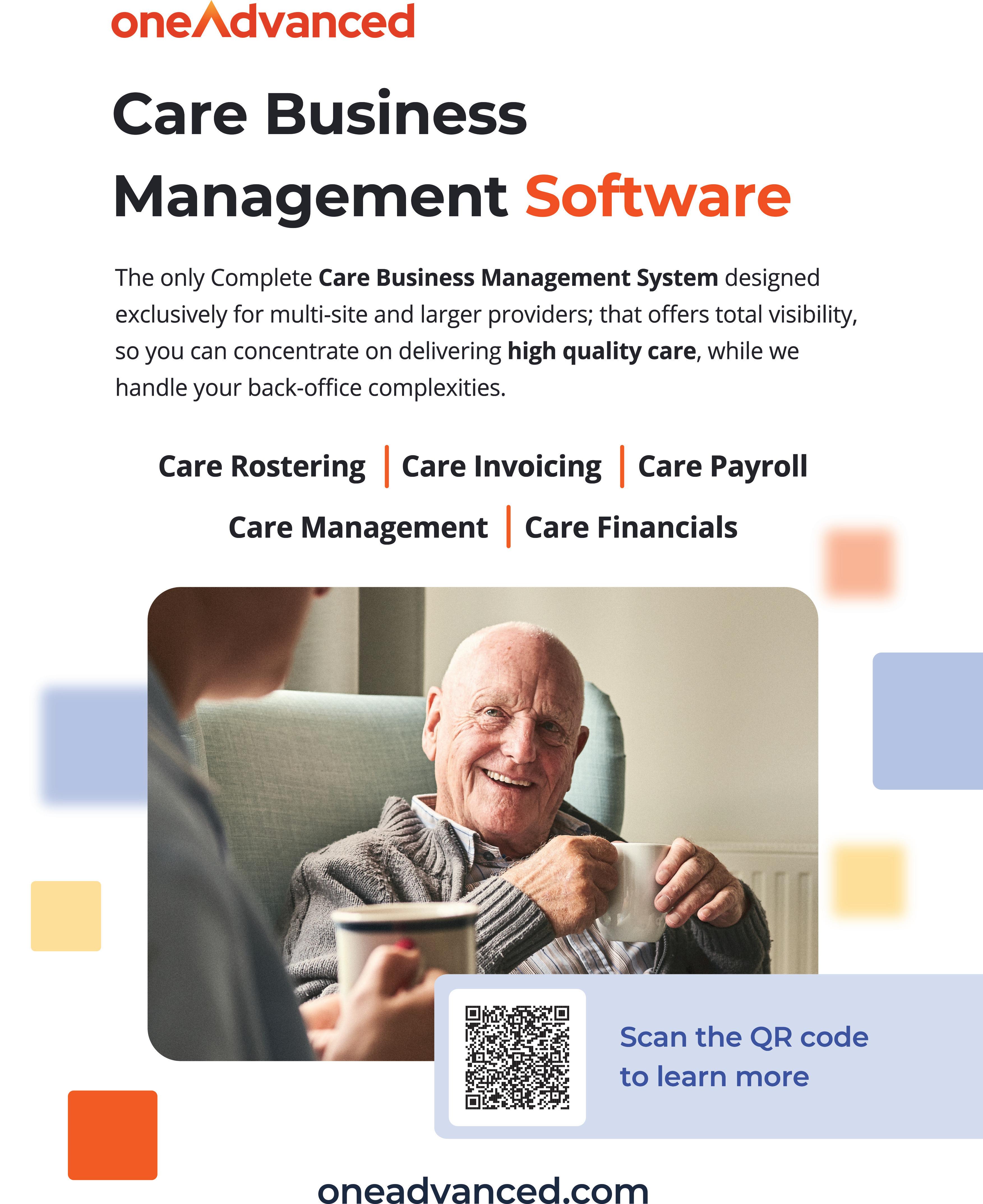

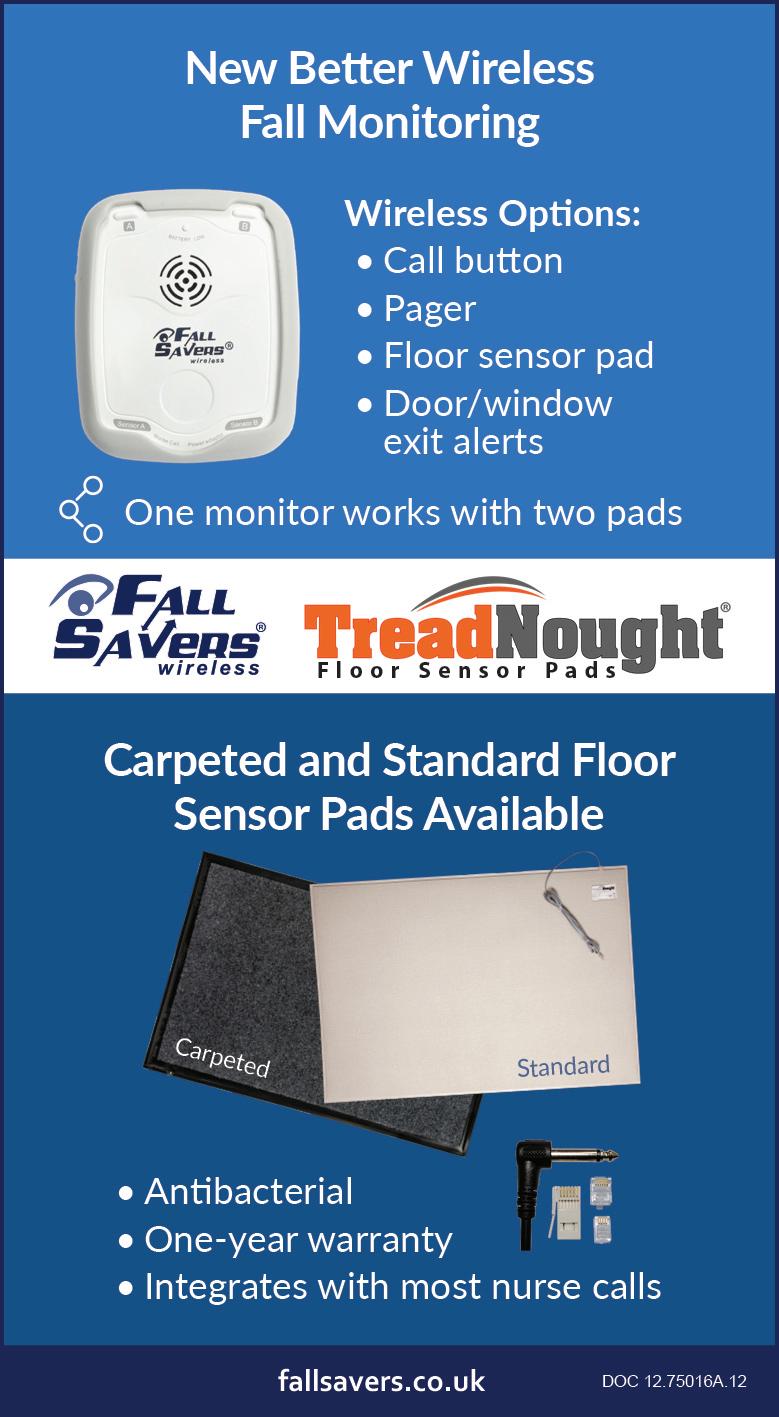













The Home Office has announced major reform of the Immigration Rules, and the changes come into effect from 22 July 2025.
New rules were laid in Parliament on the 1st July 2025, which will see skills and salary thresholds rise to the previously set RQF level 6, overseas recruitment for care workers to end, and between 100 and 180 occupations no longer eligible under the skilled worker visa route. The baseline minimum salary to get a Skilled Worker visa will rise from £38,700 to £41,700. Meanwhile, the minimum salary will increase from £34,830 to £37,500 for those with a relevant PhD.
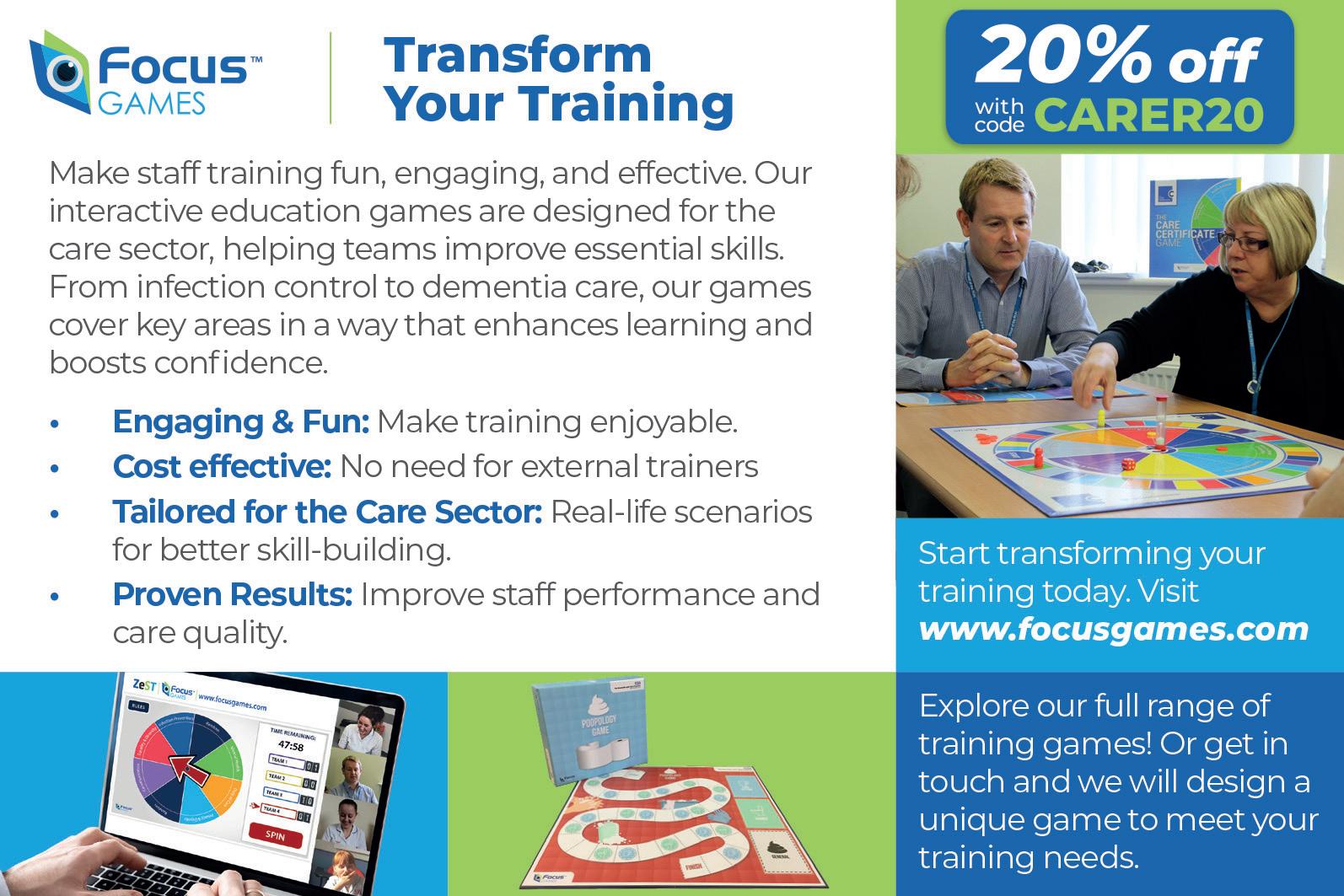
The new Immigration Rules are scheduled to come into force on 22 July 2025, pending Parliament’s approval.
Home Secretary Yvette Cooper said:
“We are delivering a complete reset of our immigration system to restore proper control and order, after the previous government allowed net migration to quadruple in four years……...”
(CONTINUED ON PAGE 3...)


Two significant developments this week have thrown the care sector's ongoing issues into sharp relief, exposing the fundamental contradictions in how our essential services are valued and supported.
The Home Office's announcement of major immigration rule changes, effective from 22 July 2025, represents nothing short of a body blow to an already struggling care sector.
Employers will no longer be able to bring in care workers from overseas from 22 July 2025, effectively closing the door on international recruitment that has been a lifeline for providers battling chronic staffing shortages.
The government's explanatory memorandum speaks of addressing "widespread abuse and exploitation" in the social care visa route - concerns that are undoubtedly valid and deserve attention.
However, the blunt instrument approach of wholesale closure fails to distinguish between legitimate providers and bad actors, punishing the entire sector for the failings of a few.
What makes this particularly galling is the timing. As care providers in England must recruit from those already in the UK on the Skilled Worker visa route before seeking to hire from abroad, the sector finds itself caught in an impossible bind.
We have vacancy rates that remain stubbornly high, indigenous recruitment that consistently falls short of demand, and now face additional bureaucratic hurdles that will slow the recruitment process to a crawl.
The requirement for providers to obtain confirmation from regional partnerships that they have attempted domestic recruitment before looking overseas adds another layer of complexity to an already challenging process. For care homes operating on waferthin margins, these additional administrative burdens could prove the final straw.
COVID
This week has also seen the resumption of the COVID-19 Inquiry with hearings for Module 6 examining the care sector running from 30 June to 31 July 2025. The timing feels particularly poignant as we witness fresh challenges being imposed on a sector still bearing the scars of the pandemic's devastating impact.
At THE CARER, we published harrowing stories and comment from those on the front line during those dark days - testimonies of fear, abandonment, and institutional failure that we hope never to publish again.
Nearly 46,000 care home residents died with Covid in England and Wales between March 2020 and January 2022, many in those catastrophic early weeks when protective equipment was scarce, testing was inadequate, and hospital discharges continued unchecked.
The care sector demands not merely an explanation of how the government of the day could have got things so catastrophically wrong, but accountability too.
Those who made the decisions must face proper scrutiny. The inquiry must not become another exercise in institutional face-saving but a genuine reckoning with failure.
What we're witnessing is the creation of a perfect storm. A sector already struggling with recruitment and retention now faces severe restrictions on international hiring just as the COVID inquiry exposes the consequences of past government failures.
The government argues these immigration changes will force employers to invest in domestic recruitment and training. In principle, this is laudable. In practice, it ignores the reality that successive governments have failed to create the conditions - proper pay, career progression, public recognition - that would make care work attractive to sufficient numbers of UK workers.
Providers are warning that these changes threaten the very survival of care provision across the country.
Providers already operating on the edge will find themselves unable to maintain adequate staffing levels. Quality of care will suffer. Vulnerable residents will pay the price.
The government's own impact assessments acknowledge potential disruption but appear to view this as an acceptable sacrifice in pursuit of broader immigration targets. This is unconscionable. Care is not a political football to be kicked around in service of populist policies.
As we publish this editorial, care providers across the country will be attempting to understand the implications of these changes and adapt their recruitment strategies accordingly which will undoubtably affect capacity.
The COVID inquiry must deliver more than just lessons learned - it is an opportunity to secure commitments to proper investment, recognition, and support for the care sector. Without this, we risk repeating the failures of the past while simultaneously making them worse through misguided policy choices.
The care sector has shown remarkable resilience through the pandemic and its aftermath. But resilience has its limits. The combination of immigration restrictions and continuing underinvestment may finally push our essential services beyond breaking point.
I would also encourage our readers to sign up for our bi-weekly digital newsletter at www.thecareruk.com and follow us on social media for all the latest news.
I can always be contacted at editor@thecareruk.com
The Carer is published by RBC Publishing Ltd, 3 Carlton Mount, 2 Cranborne Road, Bournemouth, Dorset BH2 5BR.
damage. Views expressed within this publication are not necessarily those of the publisher or the editorial team. Whilst every care is
responsibility for any effects, errors or omissions therefrom. All rights reserved, reproduction is forbidden unless written permission is


(CONTINUED FROM FRONT COVER)
The key measures include:
Raising the skills threshold for skilled worker visas to RQF level 6
Raising the salary thresholds for skilled worker visa holders
Closing the social care worker visa route to overseas recruitment in response to widespread abuse and exploitation of the route and workers
Only allowing time-limited access below degree level through a targeted immigration salary list and temporary shortage list, for critical roles only, with strict requirements for sectors to grow domestic skills
Commissioning the Migration Advisory Committee (MAC) to conduct a review of the temporary shortage list including occupations, salaries and benefits
Workers employed through the temporary shortage list will not be able to bring dependents
Salary threshold and visa fee discounts will be removed from visas offered to workers on the temporary shortage list.
An “explanatory memorandum” on the government’s website says: “Concerns over workers sponsored as care workers and senior care workers (occupation codes 6135 and 6136) are well known.”
“These include visa holders who have found themselves out of work due to employers over-estimating demand for their services or losing their ability to sponsor workers due to non-compliance, as well as significant concerns over abuse and exploitation of workers. As set out in the Immigration White Paper, these changes close entry clearance applications for Skilled Workers sponsored in these occupation codes.”
The changes also provide for in-country applications, for those switching from other visa routes, to continue for a transition period until 22 July 2028, at which point these occupations will be removed from the Immigration Salary List or Temporary Shortage List.”
“Workers must have been legally working for the provider that is sponsoring them for at least 3 months before the date their certificate of sponsorship was issued to them by their sponsor. This requirement supports continuity of employment, and provides assurance that workers are suitable to be sponsored to work in the sector, and that sponsors and workers have been in an employer-employee relationship for a reasonable period of time, allowing both parties to demonstrate compliance with basic employment law (including National Minimum Wage regulations) and mitigate risks relating to potential exploitation.”
“The requirement for sponsors to first try to recruit from the pool of Skilled Workers seeking new sponsorship is being removed. As a result of the above changes, all applications to which the requirement applied are being closed.”
“The transitional provision for workers switching from other visa routes will be kept under review, to respond flexibly to any further emerging compliance issues in the sector. These include deliberate non-compliance and exploitation and broader failure to guarantee long term sustainable employment. The Government will monitor sponsor licence revocations, expansion/contraction of the number of displaced workers and Regional Partnership feedback, including success in matching workers to new employment.”
“To prevent the occupation code “6131 Nursing auxiliaries and assistants” being misused to circumvent these changes, a clarification is being added to confirm this occupation code only applies to roles in environments where registered nurse roles also exist.”
There is no doubt that the UK’s social care system will suffer from the UK government plans to tighten immigration rules. The Care Sector has collectively condemned the changes which were aired on the announcement of the Immigration White Paper in May 2025.
CRUSHING BLOW
Professor Martin Green OBE, Chief Executive of Care England, said: “This is a crushing blow to an already fragile sector. The Government is kicking us while we’re already down.”
One of the major changes which will directly affect the social care sector is the Skilled Worker entry clearance applications for care workers (SOC code 6135) and senior care workers (SOC code 6136) being closed on 22 July 2025.
The government’s position is that care providers can recruit from the regional care partnerships which have a significant pool of displaced care workers. Furthermore, the government believe that resident workers can be trained to carry out these roles.
“UNSCRUPULOUS EMPLOYERS”
In a recent BBC interview, Laura Kuenssberg asked where care homes would recruit staff from. The Home Secretary said companies should recruit from a pool of people who came as care workers in good faith but had been “exploited” by unscrupulous employers.
She added: “Care companies should be recruiting from those workers. They can also extend existing visas. They could recruit as well from people who are on other visas, who are already here. But we do think it’s time to end that care worker recruitment from abroad,”
However, both of these approaches are flawed says Kashif Majeed, Director at Aston Brooke Solicitors: “The displaced workers pool will eventually diminish and there is no real plan to identify where the social scare sector will recruit for the carer and senior carer roles.”
“Moreover, the resident labour market has historically not taken up these roles as they can get paid more money stacking shelves in super-
markets. This is not the first time that this approach has been proposed. Previous political parties have argued this point but it has always failed.”
“In contrast, in-country skilled worker visa applications will remain open for a transitional period until 22 July 2028. This does come with a caveat which is that it applies to migrants who are already working for the sponsor for at least three months.”

The rules will also allow existing skilled worker visa holders to continue to extend their visas, bring their dependants, change employment and take supplementary employment in occupations below RQF level 6. However, after July 2028, the roles will completely disappear from all shortage lists.
KEY TAKEAWAYS: WHAT STEPS SHOULD CARE PROVIDERS TAKE NOW
Providers holding a sponsor licence should carry out a full audit of their HR processes and the five areas of compliance under the sponsor guidance.
In addition to the above, the following action must be undertaken as a matter of urgency:
1. Sponsored Migrants Salary Audit
As there are no transitional arrangements for the new salary thresholds, employers must review the salaries of all sponsored workers. If you are assigning CoSs on or after the 22 July 2025, you must meet the new salary thresholds to ensure compliance of the rules.
2. Compliance of the Skill Level Threshold
Please ensure compliance of any roles filled which fall below RQF level 6 and that they also appear on the Temporary Shortage List and the Immigration Salary List.
4. Adult Social Care
Please ensure that any roles sponsored under SOC code 6135 and 6136 are for existing staff who have been employed in the business for at least three months.
There are more changes to come later this year which include:
1. Increasing the immigration skills charge
2. Increasing the English language requirements across the immigration system.
For clear and comprehensive advice on the new rules, its implementation and how it affects your business, please contact Mr Kashif Majeed, Director at Aston Brooke Solicitors. Email: km@astonbrooke.co.uk

By Lauren Dennis, Trainee Solicitor at Birketts LLP

The care sector provides essential support to individuals who need assistance. While carers dedicate their time to the well-being of others, the pressures of the job often leave their own mental health overlooked. The emotional toll of caregiving, combined with systemic challenges, has led to increasing concerns about mental health within the sector.
New research published by the International Longevity Centre UK (ILC) finds that serious mental health conditions are hampering people’s ability to live more fulfilling long lives. Health and Social Care workers are at high risk of experiencing anxiety, depression, and burnout due to the weight of their responsibilities. Burnout is a state of emotional, physical and mental exhaustion which can occur when
experiencing long-term stress and pressure; it is a major concern in the sector. When carers are physically and emotionally drained, both their health and the quality of care they provide can suffer. It can also lead to more serious consequences including suicidal thoughts, or increased risk of accidents caused by fatigue.
HSE
The HSE has focused on preventing work-related stress and promoting mental well-being among employees. Their guidance can be found here: https://www.hse.gov.uk/stress/.
Employers have a legal responsibility to help their employees. As with other hazards at work, work-related mental health issues must be assessed to measure the levels of risk to staff. Once risks are identified, steps must be taken to minimise it as far as reasonably practicable.
The HSE links poor mental health and stress with an increase in both suicide and workplace accidents. Fatigue is particularly relevant to the care sector, arising from prolonged exertion, sleep deprivation, and disruption of circadian rhythms—factors commonly experienced by care workers due to long and irregular shifts. The HSE highlights that fatigue leads to slower reaction times, reduced attention, and impaired decision-making, all of which increase the risk of errors and injury.
Where such factors contribute to a death—whether through accident, misadventure, or suicide—there is a clear risk that a care provider or employing organisation may be called as an Interested Person (IP) to an inquest. This is particularly the case if organisational practices or working conditions are alleged to have contributed to the deceased’s state of fatigue or mental ill-health. The coroner may consider whether
systemic issues such as staffing levels, shift patterns, or support mechanisms played a role, thus bringing the organisation’s actions and policies under scrutiny during the inquest.
The Thriving at Work Report sets out a framework of actions which employers of all sizes can, and should, put in place. The full report can be found here:
https://assets.publishing.service.gov.uk/media/5a82180e40f0b623026 9acdb/thriving-at-work-stevenson-farmer-review.pdf.
Ways to support your staff:
Implement a mental health at work plan which promotes good mental health and outlines the support available for employees.
Increase awareness of mental health.
Encourage open conversations.
Provide good working conditions with a work life balance.
• Have management structures in place for employees to go to for support.
• Monitor employee mental health by talking to your employees and understanding risk factors.
Our Regulatory and Corporate Defence Team have extensive experience representing employers during inquests and proceedings brought by the HSE. Our team can also assist with employer training and health and safety audits to ensure that the necessary steps are being taken to protect employee mental health and prevent future deaths.
HC-One’s Woodlands View Care Home in Stevenage, Hertfordshire, was visited on Friday 27th June by MP for Stevenage, Kevin Bonavia.
Residents and colleagues of the HC-One owned care home enjoyed meeting their MP, Kevin Bonavia, and chatting to him about what life is like at Woodlands View Care Home – which is an integral part of the local Stevenage community.
MP Kevin Bonavia enjoyed a tour round the 120 bedded residential, nursing, nursing dementia and residential dementia care home, including the hairdressing salon, lounge, sensory garden, assisted bathrooms, quiet room, and bedrooms.
Natasha Simms, Deputy Home Manager at HC-One’s Woodlands View Care Home, commented: “We were very happy to welcome our local MP, Kevin Bonavia, into our home today. Our residents really enjoyed his visit,
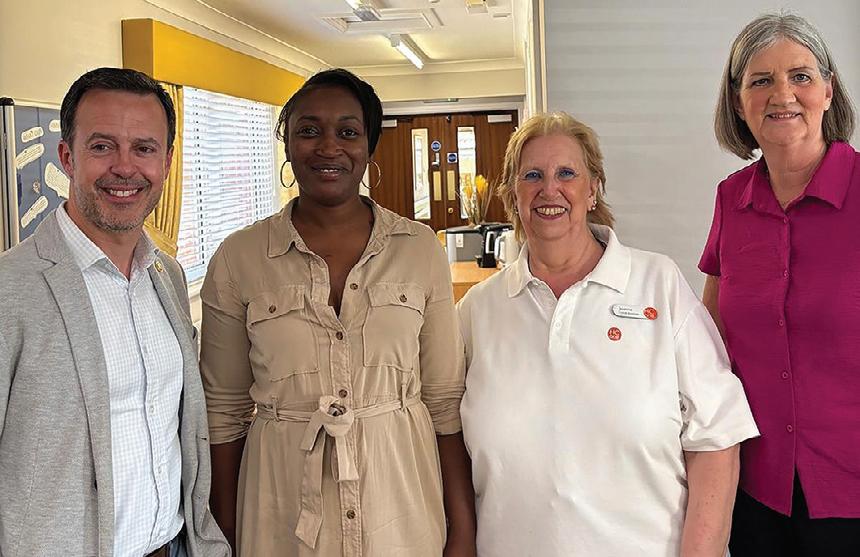
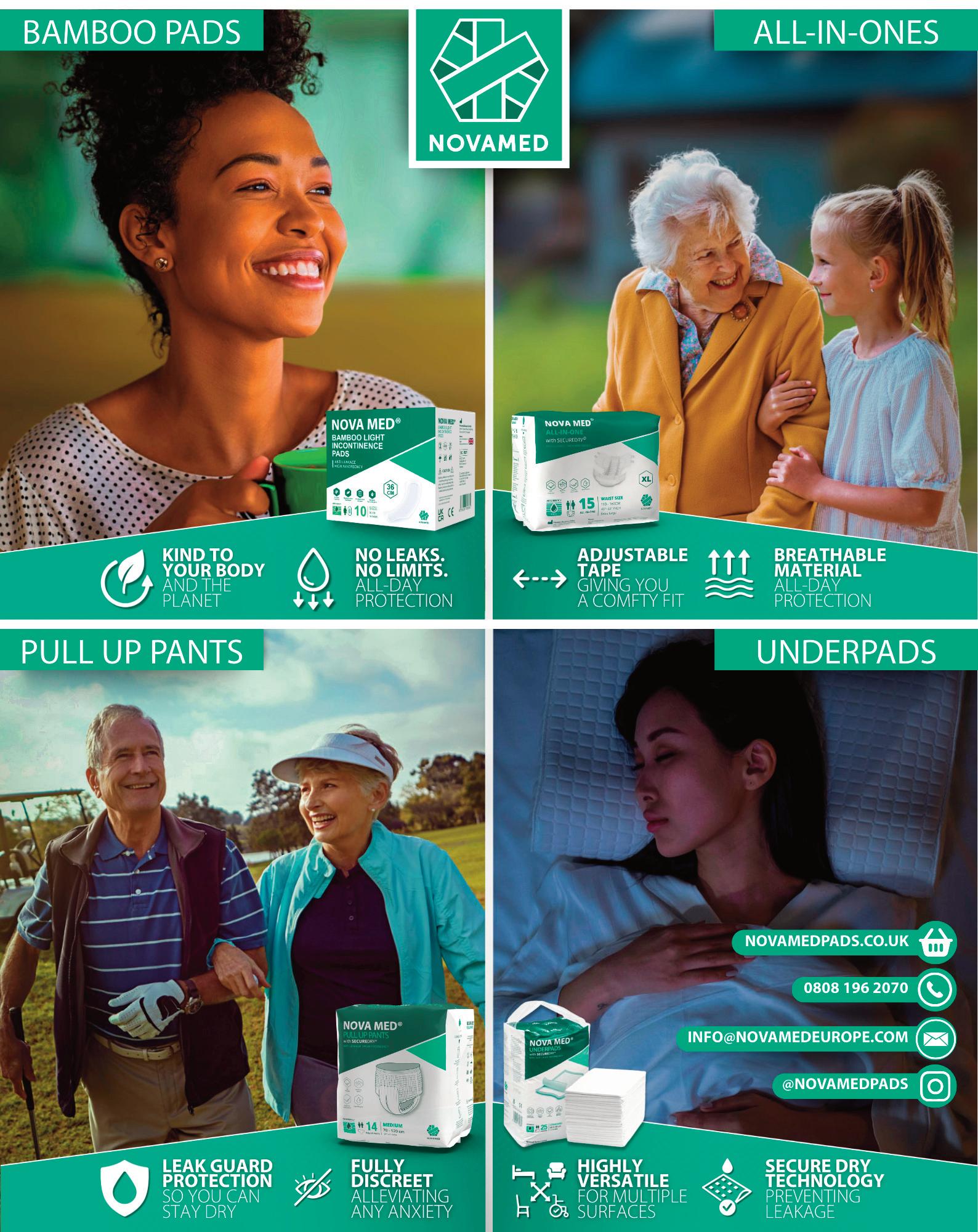

Kevin spent an hour and a half introducing himself and having coffee with all our residents. Kevin and his team complimented Woodlands View by saying that our home had a very homely feel and did not feel like a care home at all.”
MP for Stevenage, Kevin Bonavia, said: “I thoroughly enjoyed my visit to HC-One’s Woodlands View Care Home in Stevenage today.
“It was lovely to meet residents there and tour the facilities, including the dementia care home with the hairdressing salon, lounge, sensory garden and amenities. So well designed, tailored and thought out.
“I also want to highlight how incredible all of the staff were. Their duty of care, kindness and enthusiasm shone through brightly. I can’t stress enough how impressed I was with all elements of this visit, and I hope to come back one day in the future to check in and keep up to date with how everyone’s been getting on.

• We specialise in the sale and purchase of quality used wheelchair accessible vehicles and ambulances.
• They can be bought as seen or refurbished and sign-written to your own requirements.
• Fully serviced, new mot & warranty
• Engineers inspection supplied if required.
• Free delivery service available
• All buses comply with new legislation
•
• Lease hire and purchase



The UK COVID-19 Inquiry has released harrowing testimony revealing the profound impact of pandemic restrictions on residential and nursing homes, documenting widespread family trauma, resident isolation, and unprecedented pressure on care staff.
The latest Every Story Matters report, published as the Inquiry begins Module 6 hearings focusing specifically on the care sector, draws from over 47,000 personal accounts, making it the largest public engagement exercise ever undertaken by a UK inquiry.
The testimony reveals the devastating emotional toll on families who were separated from vulnerable relatives during lockdown restrictions. Many described the lasting trauma of believing their loved ones died feeling abandoned and alone, leading to ongoing mental health challenges for bereaved families.
One Welsh family member told the inquiry: “The family are devastated that we were not able to be with him at the end of his life. We grieve that he did not get the send-off he deserved from his loving and very close family and it breaks our hearts as we feel he was deserted at the very time he needed us.”
Care home residents, particularly those with dementia and learning disabilities, experienced significant distress when unable to understand why family visits had ceased. The inquiry heard how cognitive decline accelerated during isolation periods.
A Northern Ireland care worker described one resident’s deterioration: “Her dementia declined rapidly
when lockdown happened and she’d got no family support. She just kind of lost all will. She really declined.”
Care workers faced unprecedented challenges, including severe staffing shortages that forced many to work extended hours to prevent residents from dying alone. The inquiry heard accounts of non-nursing homes being compelled to provide end-of-life care without appropriate training when healthcare professionals couldn’t visit.
One care home worker explained: “We had a gentleman who was end of life who didn’t end up in hospital because we nursed him ourselves, which, again, we’re not a nursing home. So, really, we shouldn’t be doing that.”
Staff burnout became widespread as teams covered multiple shifts while colleagues were absent due to COVID infections.
Care homes highlighted significant challenges around hospital discharges, with many forced to accept residents they didn’t know, often without accurate information about their COVID status. This created additional infection control challenges and stretched already limited resources.
The inquiry documented considerable confusion and distress around the inconsistent application of Do Not Attempt Cardiopulmonary Resuscitation notices. Some care providers reported pressure to implement blanket DNACPR policies, which they successfully resisted.
One registered manager stated firmly: “I refused when they said, ‘We’re going to give everybody a DNACPR’… My residents will make that decision for themselves.”
Limited supply and quality of personal protective equipment created additional stress for care teams. The inquiry also heard how face masks presented unexpected communication barriers, particularly problematic when caring for residents with hearing difficulties or dementia who relied on facial expressions and lip-reading.
Home care services faced their own challenges, with visit times reduced and care limited to basic needs only. Many domiciliary carers described the distress of being unable to provide the comprehensive support their clients required.
Ben Connah, Secretary to the UK COVID-19 Inquiry, emphasised the importance of these testimonies in shaping future preparedness: “By documenting these deeply personal experiences, we ensure that the voices of those who suffered, cared, and grieved during the pandemic will help inform the Inquiry’s recommendations to ensure the care sector is better prepared in the future.”
The Module 6 investigation will examine govern-
ment decision-making throughout the pandemic, including the controversial policy of discharging hospital patients to care homes without testing. Five weeks of public hearings are scheduled to scrutinise these decisions and their consequences.
This latest report follows previous Every Story Matters publications covering healthcare systems, vaccines and therapeutics, and test and trace programmes. Chair Baroness Hallett will use these comprehensive testimonies to develop recommendations aimed at better protecting care sector residents, staff, and families in any future health emergency.

WE NOW SUPPLY A WIDE RANGE OF FURNITURE
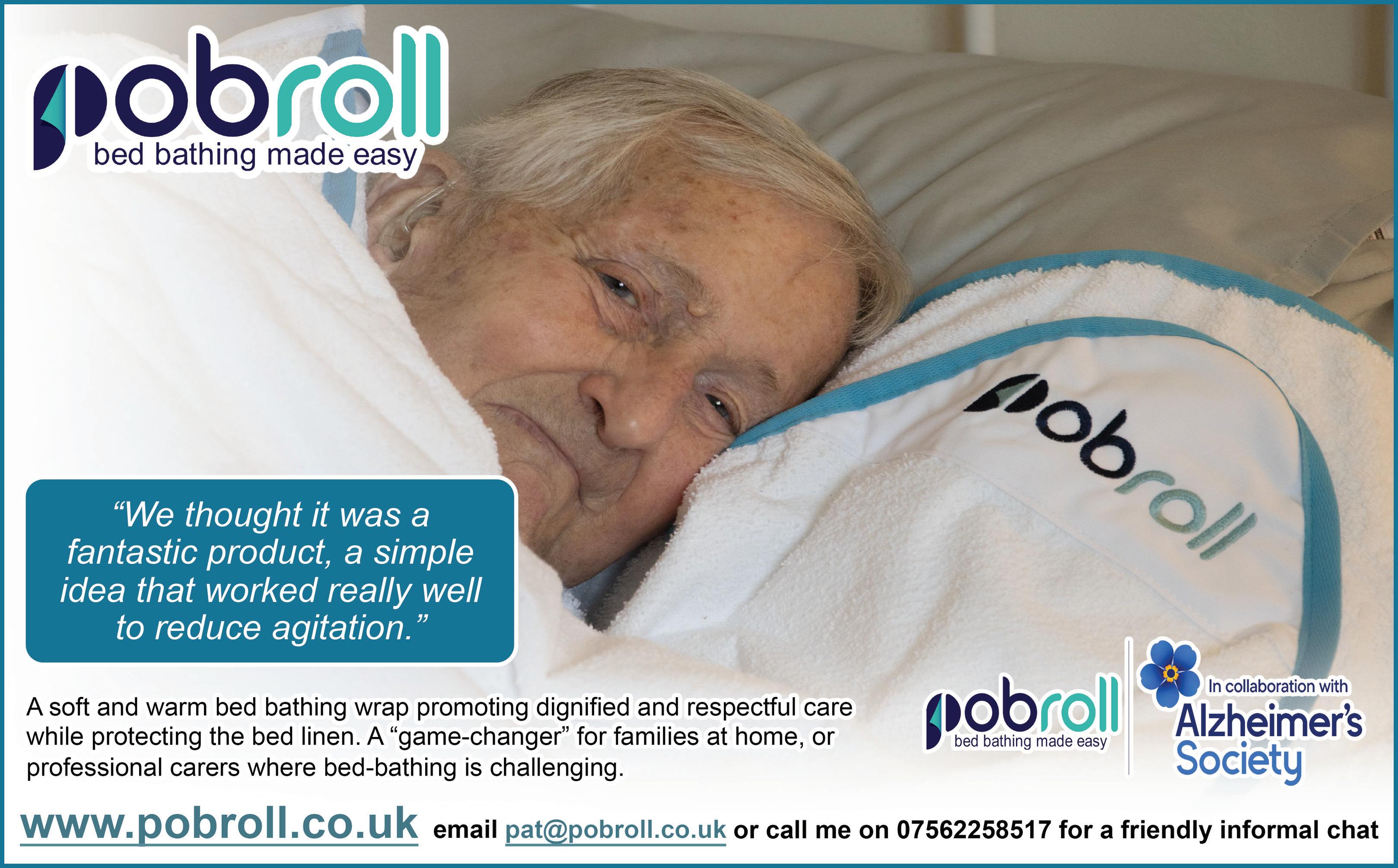

The adult social care workforce in the UK is facing an unprecedented crisis. Years of underfunding, increased care complexity, and burnout among staff have resulted in a large number of job vacancies and a high turnover rate, which are spreading providers thin. Brexit and more recent plans for immigration policy changes are reducing access to a workforce from overseas. Yet, widespread perceptions in the UK are of care being low-skilled, low-paid, and emotionally taxing. It can leave care providers feeling helpless when it comes to meeting today’s recruitment demands. However, without a stable and sustainable workforce, social care simply cannot function; there are things we can still be doing to help turn the tide.
One urgent opportunity is how we attract, retain and inspire the next generation of care professionals from here in the UK. Many young people at the moment don't perceive care as a first-choice career. There's also very little exposure to care being a purposeful, skilled profession during school or college, so young people may assume there's no real progression or personal growth in the field. It’s rare to see any showcases of positive or aspirational stories from the social care sector in the media. And thus, a career in care is often overlooked in favour of other sectors, such as retail or hospitality.
To shift this perception, we need to change the narrative to one that celebrates the real stories of care professionals thriving, making a difference, and building meaningful careers. Let’s bring these stories into schools and youth programmes with talks, placements, and ambassador schemes. Use social media and digital platforms to show the diversity and value of care roles. And continue to advocate for better pay and
By Ruth Mabika, Operations Director & Co-founder, S&P Care
recognition to match the skill, responsibility, and impact of the work that carers do every day.
It’s also vital we make career pathways more visible and structured. There are clear progression routes in care, underpinned by qualifications – from frontline roles into training, management, policymaking, and even entrepreneurship. Care work builds core transferable skills like communication, leadership, problem-solving, and crisis response. And it offers daily contact with professionals across health and social care, such as social workers, nurses, GPs, pharmacists, paramedics and other specialists in the field.
For young people or those unsure about which path to take in health and social care, this real-world interaction helps individuals better understand the various professions, assess their interests, and make more informed decisions about their future career paths. Care is a launchpad for careers across the health and social care ecosystem, and this is a strength we need to better communicate.
We can achieve this by investing in structured induction and training, promoting continuous professional development in care, and developing internal mentoring schemes and talent spotting programmes. We can introduce flexible working and wellbeing support to improve retention, and partner with local colleges and job centres to create pipelines through apprenticeships and internships.
In doing so, my hope is that we can encourage greater collaboration between providers, the education sector, and local authorities to bring about the long-term funding and strategic focus that social care deserves. A fully funded national care workforce strategy with long-term commitments is urgently needed, along with ring-fenced funding for workforce development, and even financial incentives for care workers, such as training bursaries and tax breaks. When social care succeeds, the NHS does too. So, we need both to be treated with equal value for the care workforce to grow.
My vision is of a care workforce that is recognised for its skill and diversity. A proud workforce that young people aspire to join because it makes a genuine positive impact on people's lives, and because they see a viable and rewarding long-term career path. I believe that vision is possible, but it will take greater collaboration with the education sector and local authorities – something that we as care providers will need to drive.
HC-One’s Thorn Springs Care Home, in Houghton Regis, Dunstable, Bedfordshire, brought a burst of laughter and lively charm to its residents with a unique “Butler in the Buff” afternoon tea event on Monday, June 16, 2025.
Held in the home’s cosy Tea Room, the event was a smashing success, filled with squeals and giggles. The idea for this playful activity came straight from the residents themselves, sparked by a brainstorming session with Zoe Pearson, Thorn Springs Care Assistant. Eager to bring a fresh twist to the home’s activity calendar, Zoe transformed the Tea Room with vibrant decorations, feather boas for the ladies, and stacks of Monopoly money for some light-hearted fun. Thorn Springs residents who preferred to opt out could relax elsewhere, ensuring everyone’s comfort.
A charismatic butler, dressed in little more than a small apron,
Social Care TV continue to fly the flag for highest quality online training for Health and Social Care, after unwavering commitment to excellence within the sector for over 25 years.
Their widely-used health and social care specific courses - produced and edited in-house - are expertly designed to make learning engaging, informative and, therefore, highly effective for learners. Accredited by CPD, training with Social Care TV is quality assured, comprehensive and relevant.
As one of the leading online training providers in the health and social care sector in the UK, they supply training for local authorities, recruitment agencies, care home groups and other health and social care organisations.
Their feature-rich Manager platform has further been enhanced this year with the introduction of several new Manager tools designed to aid with compliance, reporting and trainee management. Features now available include:
• Compliance Dashboard with Traffic Light System
• Downloadable Trainee Matrix
• Custom Bundles
• Trainee Groups

• Bulk Uploads
• Bulk Enrolment Onto Custom Bundles
• Course Enrolment Notifications
• Course Reminders
SCTV regularly release new and updated high-quality courses. Previews for all courses can be viewed at: Courses - Social Care TV (www.social-care.tv/courses/course-details)
To enhance their learners' experience further they have created free, comprehensive subject-specific workbooks which were rolled out across all courses this year. This unique addition provides excellent value and a fully robust training package.
SCTV are delighted to have won several awards over the last 12 months including:
• Best Online Health and Social Care Learning Platform’ – Global Health & Pharma Social Care Awards 2024
• ‘CPD Provider of the Year’ – The CPD Awards
• Social Care Training Provider of the Year’ - Corporate Livewire Innovation & Excellence Awards
Gold standard customer service remains a core staple of the business, with expert support and guidance provided via telephone, email and live chat. They place great importance on the training and development of their customer services team to ensure that they continue to provide a personal, friendly and knowledgeable service.
Their much-loved ‘Care Worker of the Month’ award recognises and rewards the selfless dedication shown by care workers across the UK
served a delightful lunch and prosecco while engaging the group in a spirited game of bingo. The room echoed with laughter as residents tucked Monopoly money into his apron, creating a joyful atmosphere that lit up the afternoon.
Zoe Pearson, HC-One’s Thorn Springs Care Assistant, shared her delight: “I thought a Butler in the Buff serving our residents lunch would infuse some cheeky fun and lively charm into their day, giving the ladies a delightful experience of laughter and joy. They thoroughly enjoyed every bit of the afternoon and there were plenty of smiles and laughter filling the air.”
Stella Rose, HC-One’s Thorn Springs resident, stated:“I wasn’t too sure what to make of it at first, but I really enjoyed it! He was a lovely young man. I laughed all afternoon and would love to have him come back again!”

and they proudly support the Care Workers Charity who aim to advance the financial, professional and mental wellbeing of social care workers.
SCTV believe that high quality training should be accessible to all and offer regular, free courses which include a digital certificate accessible via their website.
The company stands behind a clear mission and set of values which define their ethos and their dedication to both the Care Sector and those within it. These can be viewed at: Mission Statement and Core Values - Social Care TV (www.social-care.tv/about/mission-statement-and-core-values)
Social Care TV are a responsible business, committed to ensuring that their actions have a positive impact on their employees, customers, the wider health and social care community and the environment.
Above all, SCTV consistently strive to make a meaningful contribution to the wellbeing of those being cared for.
For more information please see: Homepage - Social Care TV (www.social-care.tv) and see advert on the facing page.
Government and NHS needs to work closer with councils to co-design a modern health and care system that is rooted in prevention, communityled solutions and long-term wellbeing – not just hospital beds and crisis response – the Local Government Association has said.
The LGA said councils play a vital, unique role in shaping the conditions for good health – from clean air and housing, to education, employment, and early years support. But despite crucial public health services being part of their DNA, local government leaders say they have been sidelined in some key reform and funding decisions.
The LGA said it is good that the NHS’s 10-year plan will set a clear and long-term vision and defined direction for the future, adding that it recognised the plan’s strong potential and the important, strengthened role of local government a key partner in influencing its direction and ensuring effective outcomes.

The LGA said any positive shift towards neighbourhood working is critical but must be built on strong relationships between local government, health and voluntary and community sector leaders. Councils support the focus on the three shifts that government has set out in its vision for the NHS – analogue to digital; treatment to prevention; and hospitals to community – and share ambitions to scale up prevention and early intervention services.
The LGA is therefore urging ministers to set up a new national-local coalition to help deliver these neighbourhood health models that put prevention and place at the heart of public services. It says this partnership would unlock cost-effective, integrated interventions, reduce health inequalities and create better outcomes across the country.
The LGA said key priorities for government action include ensuring effective integration across NHS and
local government; strengthening public health leadership; and eliminating service duplication and cost-shunting. The call follows frustration over a lack of clarity around funding and governance, especially concerning Integrated Care Board (ICB) reforms, safeguarding responsibilities, and pressures on adult social care.
The ambitions of the 10 Year Plan cannot be realised in full if we don’t have an adult social care system that is financially sustainable, funded to be properly preventative, and rooted in personalised care and support.
The Government needs to act on adult social care in the short- and medium-term – not wait until the Casey Commission issues its final report in 2028 – and local government stands ready and willing to bring its unparalleled experience and expertise to the debate they said.
The LGA said public sector organisations that support health and care also face significant challenges to make better use of technology. It wants mandated, funded partnerships between the NHS and local government to deliver digital innovation alongside a resolution for systemic IT market failures for both electronic patient record technology and local government case management systems.
In her speech to the Annual Conference, Cllr Louise Gittins, Chair of the LGA, said: “Health does not begin in hospitals – it begins in homes, streets, parks, and schools. The NHS cannot deliver a healthier society on its own.
“Councils are already leading bold, local solutions that work and are key to building a modern, joined-up system that delivers for people.
“A Ministerial Forum, which brings together national and local politicians, would help drive real reform –built from the ground up, based on what our communities need and what already works.”
In May this year, Blandford Grange Nursing Home proudly joined a host of local businesses in supporting Dorset’s award winning Teddy Rocks Festival, held from 2nd to 4th May 2025. The home contributed to the community funded catering effort that kept the festival’s volunteers and crew well fed throughout the three day event.
Founded in 2011 as a modest pub gig, Teddy Rocks has grown into a nationally recognised, family friendly music festival that this year alone raised £164,233 for Teddy20, the Blandford based charity helping children and families affected by cancer, pushing the event’s cumulative fundraising total well past the half million pound mark. Entirely volunteer run, the festival now attracts thousands of music lovers each spring

to Charisworth Farm, with every penny of profit going to the cause.
Working alongside other generous local businesses, Blandford Grange, part of Healthcare Homes group, donated towards the daily food budget and sent its own HeadChef, Sharon Cork, to join the evening cooking rota.
Together with volunteers from other companies, Sharon helped serve up hot, hearty meals for the hundreds of people who gave their time to keep the festival running smoothly.
“Teddy Rocks is powered by volunteers and by the goodwill of many Dorset businesses,” said Sharon Cork. “It was a privilege for us to be one part of that bigger team effort.”


Today, those responsible for personnel and energy within organisations face unique problems shaped by sustainability and net zero. Sam Arje, Senior Energy Consultant and EnCO Practitioner at TEAM Energy
(www.teamenergy.com) explains how energy efficiency training can address these issues by building an engaged green workforce who reduce energy, cut emissions, and save money.
From directors to energy, sustainability and HR managers, a majority of leaders recognise the need for organisational change when it comes to energy efficiency and sustainability. They are actively addressing internal challenges, while also focusing on enhancing their workforce’s skills.
Fortunately, these diverse roles can address their distinct issues together. Energy efficiency training is a 360-degree approach – driven by leadership and undertaken by all – that can bring organisation-wide benefits when done correctly and with organisational strategy in mind. WHY THERE’S A NEED FOR ENERGY EFFICIENCY TRAINING NOW MORE THAN EVER
For a long time the tide has been turning. Compared to a decade ago, attitudes towards energy efficiency and sustainability have changed dramatically. Research from PwC shows that today most CEOs regard sustainability as an investment not a cost. What’s more, over two thirds report that climate related spending hasn’t impacted their costs negatively, and one-third report it increased their revenue. While the desire is there, many organisations still don’t know how to make a difference. Those with energy and sustainability managers are further along their journey – they have some structures and process in place and may even be reporting on some of their activities. However, there are still many obstacles to large scale change, a big share of which comes from training and educating workforces on the need for energy efficiency and sustainability. If people don’t know what to do or why, large-scale changes will be met with resistance. This reluctance to change can become an issue that risks an organisation’s reputation
too. Many energy efficiency regulation compliance plans are published publicly, which could affect clients’ or future employees’ decisions. The need for energy efficiency knowledge within the workforce is not only a hurdle for enacting things like net zero strategies, it’s also crucial for retaining employees and ensuring they’re ready for the challenges of the future. Research from Deloitte has highlighted how millennials and Gen Z want to work at organisations with good sustainability credentials. Two in ten employees have already left jobs to work in more sustainable organisations, while one-quarter say they plan to change in the future. Given the UK’s green skills gap and recognition that almost all of tomorrow’s jobs will be touched by sustainability, having a well-trained workforce could be a make-or-break issue, determining the long-term future of many businesses.
To address these issues organisations can take a 360-degree approach through training, creating a knowledgeable workforce that attracts others and enacts strategic change. What benefits HR managers also benefits energy and sustainability managers and directors too. Everyone’s needs are met by a workforce that’s empowered and inspired to use energy more effectively.
Energy efficiency training educates individuals and equips people with new knowledge and skills so that they can reduce energy consumption, waste and cost by making changes to their behaviour. Depending on the end goal of the organisation, training can lie anywhere on a spectrum of a 30-minute session once per year, to ongoing educational programmes designed and delivered by consultants. However, what makes energy efficiency training most effective is that it should be created as a best-fit for the organisation in question. This could be through bespoke consultancy, or through train-the-trainer programmes. For maximum impact, several things need to be considered.
Energy efficiency training must be suitable for the staff. It must meet people where they’re at, based on their role and existing knowledge. It must be relevant to people’s daily work and their place within organisation at large. In my experience, while there may be crossover between roles or sectors, you must speak the language of who you’re training and give them examples and a reason for changing that’s relevant to them. What works for machinists is quite different to what works for university librarians or accountants, for example.
Understanding the organisation’s current energy savings and efficiency efforts is key too. This prevents lost time – as people aren’t being taught the same thing twice – and ensures training helps address the organisation’s issues as they currently stand. It also aligns
training with objectives. Let’s not forget that carbon reduction and energy efficiency are different aims, and while they do overlap, the best results come from aligning activities with objectives.
Strategy is essential, of course. Energy efficiency training should be a part of a much broader energy efficiency strategy that focuses on many things, from setting targets, collecting data, upgrading assets and reporting on progress. This is not to diminish the role of training. If anything, it’s the opposite. Strategies are needed, but they don’t become reality without training. Training enables organisations to implement their strategies, and, in many cases, it’s what helps organisations craft a strategy in the first place.
I could go into nudge theory, the Pareto principle and several other behavioural change methods. But I like to think of the situation like a wedding reception.
At the start of the evening, nobody’s on the dancefloor. But, once the speeches are done and the married couple have their first dance, other people start to join in. Over the course of the night the DJ plays everyone’s favourite songs to attract a crowd, and eventually there’s only a handful of outliers sat around the edges. What was ‘normal’ has changed; everyone’s dancing.
Today’s organisations can be like that. But instead of dancing, it’s a changed culture and social norm that’s addressing energy, sustainability, and HR managers’ issues head on. Energy efficiency training has given people the knowledge to save energy, reduce emissions and cut costs within their organisations. The sorts of small things they do at home are carried over to the workplace and have a big impact. Training also attracts other people to the cause and changed the norm. It's secured buy in from both leaders and staff, making employees engaged and energy and sustainability managers effective and empowered in their roles. As the organisation meets its sustainability targets and compliance standards, new ideas and ways of working are established. This helps the organisation stand out, it becomes a place that people want to work and an organisation that other organisations want to work with.
WHAT’S NEXT?
Energy efficiency training has some of the best return on investment a company can make for energy saving. Compared to new assets and infrastructure that require large sums of capital, training is a low-cost way of reducing energy and emissions. Crucially, it is through training that organisations can create a new culture that brings organisationwide benefits and address energy, sustainability, and HR managers’ challenges while enhancing their reputations with all stakeholders.
HC-One’s Orchard Mews Care Home in Benwell, Newcastle upon Tyne, is proudly supporting its dedicated Wellbeing Coordinator, Gillian Reid, as she prepares to take on a thrilling challenge in support of those living with dementia.
On Saturday, August 2, 2025, Gillian will bravely complete a charity skydive at the Sky-High Skydiving Centre in Peterlee.
Her jump will raise funds for Silverline Memories, a charity that provides vital support, activities, and companionship for people affected by dementia.
Gillian’s fundraising efforts reflect her passion and commitment to improving the lives of those living with dementia, both in her professional role at Orchard Mews and beyond.
Claire Harrop, Home Manager at HC-One’s Orchard Mews Care Home, said: “We’re incredibly proud of Gillian for taking on this challenge. Her dedication to enhancing wellbeing and creating positive experiences for our residents is inspiring, and we’re delighted to support her in raising money for such a meaningful cause.”
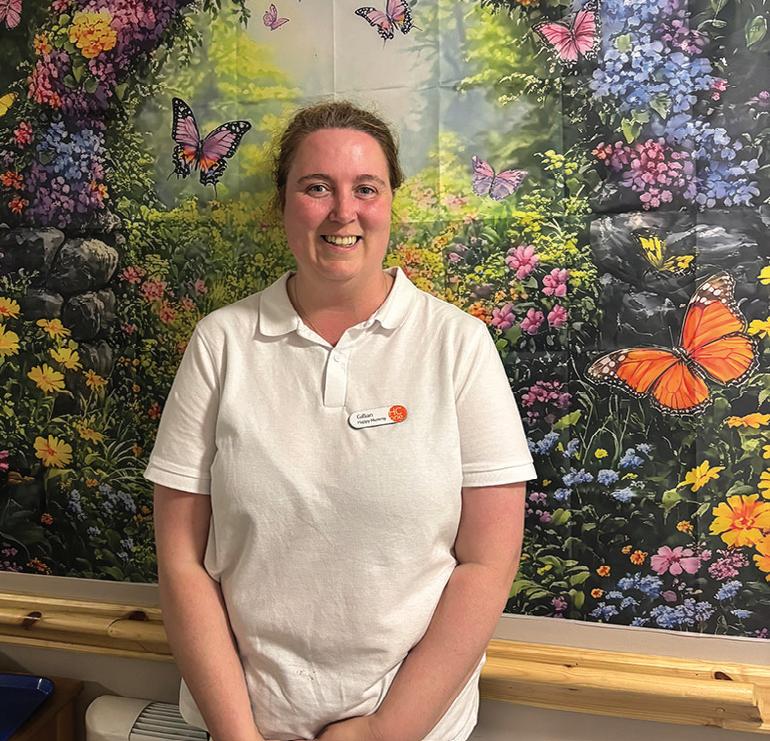
A remarkable resident at RMBI Care Co. Home Prince George Duke of Kent Court, in Chislehurst, has celebrated her 106th birthday with a joyful party surrounded by residents, staff, friends and family.
Annie Hardy, who has lived at the Home since 2018, enjoyed a lively celebration to mark her incredible milestone. The festivities included a special performance from singer Maxine, who soon had everyone joining in for a singalong and even some dancing.
Annie received a host of thoughtful presents, including a brand-new, comfortable wheelchair, along with cards (including one from the King and Queen Consort), flowers and well wishes from those who know and love her.
EVENTFUL LIFE Born on 16 June 1919 in Rotherhithe, Annie arrived just months after the end of the First World War, at a time when the world was beginning to rebuild.

then, she has lived through more than a century of change. During the Second World War, she helped care for her younger siblings in Wales before returning to London to work in a munitions factory, making bombs for the British army. After the war, she spent many years in the print and bookbinding industry before retiring nearly 40 years ago.
Annie looks back fondly on her childhood spent with her six siblings, enjoying simple pleasures like pie and mash from shops in Rotherhithe and Tower Bridge Road. A keen traveller in later life, she visited destinations including Brazil, Bulgaria, Italy and Spain, and famously celebrated her 80th birthday with a Concorde flight over the Bay of Biscay, champagne included.
Her secret to a long and happy life? Annie says it’s simple: “Good homecooked food, keeping busy, working hard… and no debts!”
MPs from across the political spectrum gathered in Westminster Hall this week to debate Gloria’s Law, calling for a legal right to Care Supporters that would guarantee family members and advocates access to their loved ones in care settings.
The debate, brought forward by Dan Carden MP, highlighted the ongoing challenges faced by families trying to support relatives in residential and nursing homes, despite the introduction of Care Quality Commission Regulation 9a earlier this year.
Carden explained that while Regulation 9a was designed to protect visiting rights, it has proven insufficient in practice. “Evidence from advice lines shows care providers are aware of the regulation but simply not adhering to it,” he told the chamber. “As people cannot enforce it in law, 9a is not offering the protection needed for something as vital as the support of trusted loved ones.”
Liberal Democrat spokesperson for care and carers, Alison Bennett, emphasised the limitations of current protections. She noted that while the regulation aims to ensure care providers do not discourage visits and that people can attend medical appointments with family support, “it falls short of what is needed.”
Bennett highlighted key weaknesses in the current system:
“Regulation 9a relies on enforcement by the CQC, an organisation that is well stretched thin and faces a number of challenges. The CQC cannot prosecute providers for breaches of this and often lacks the resources for swift and consistent enforcement. Most importantly, this regulation does not create an enforceable right held by the individual resident themselves.”
The debate featured powerful personal testimony from Shadow Minister for Health and Social Care Dr Caroline Johnson, who shared her own experience of identifying a medical emergency during a family visit. She described arriving to find a relative who “looked grey, pale and unwell” and was indeed in shock requiring urgent fluid resuscitation.
“Relatives know the person they’re seeing the best, and they’re able to identify changes in condition which may go unnoticed by staff,” Johnson explained. “What if that had not happened at the start of visiting time? I shudder to think.”
Liz Saville-Roberts MP, who has been part of the cross-party campaign in previous parliamentary sessions, spoke about the particular importance of family contact for people living with dementia. She criticised the tendency to treat “social needs for love and family contact” as “a luxury, a nice to have, but ultimately expendable” when institutions face pressure.
The debate was organised as part of the ongoing campaign by Care Rights UK, working alongside John’s Campaign and Rights for Residents. Helen Wildbore, director of Care Rights UK, welcomed the parliamentary support but emphasised the urgent need for action.
“Every day our adviceline hears from people who face barriers to supporting their loved ones in care – through visiting restrictions, closed cultures and more,” Wildbore said.
“We urge the Government to fulfil their manifesto commitment and bring forward a new legal right to a Care Supporter.”
The campaign argues that Gloria’s Law would ensure no
Intergenerational relationships in Macclesfield are flourishing thanks to a weekly playgroup initiative designed to promote relationships between young and older people.
Generations of Fun sees children up to the age of five years (and their grownups) sharing in experiences with older people residing at Belong, the not-forprofit dementia specialist on Kennedy Avenue. The quality time features interactive storytelling, singing and making music, and arts and crafts. Many have embraced the simple pleasures of playing together with toys, enjoying snacks and getting to know one another.

Elaine Beckingham, Belong Macclesfield customer, said: “I love the sessions because I like meeting people with children and spending time with the little ones – it’s nice to borrow them for a little while.”
Leading the gatherings, Anna Seaton, experience coordinator at Belong Macclesfield, said: “Generations of Fun is proving to be a real hit – we’ve had much laughter and creativity, and our customers have loved spending time with our little guests. Some of them don’t have grandchildren and vice versa, and so everyone is really benefiting from being in one another’s company, interacting and learning. It’s been wonderful to see.”
Anna continues: “We’re pleased to offer this invaluable support network to the community, especially given the current cost of living. Our guests have also been making use of other facilities such as the bistro and salon, which are also open to the public. We’re always happy to welcome the community here.”
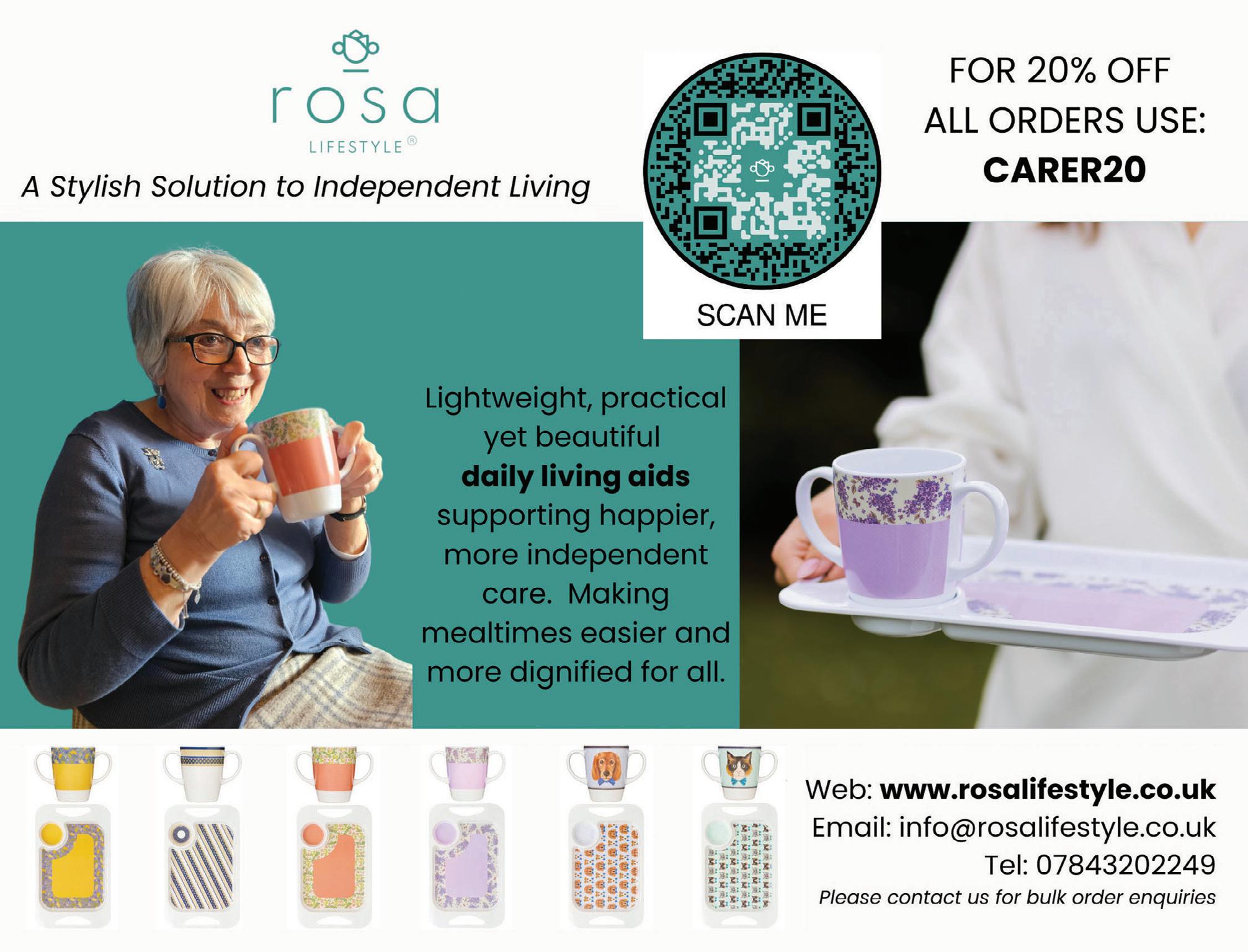
one is isolated when they need support most, providing legal protection for the fundamental right to maintain contact with loved ones during some of life’s most vulnerable moments.
Speaking after the debate, Dan Carden MP concluded: “Today’s debate showed just how urgently we need to protect the right to maintain contact in law. Connection with loved ones is not an optional extra – it is essential to dignified care. A legal right to at least one Care Supporter would give people the protection and dignity they deserve.”
The campaign for Gloria’s Law continues to build momentum across the political spectrum, with supporters arguing that current regulations are insufficient to protect one of the most basic human needs – the right to have trusted loved ones present during times of vulnerability and need.

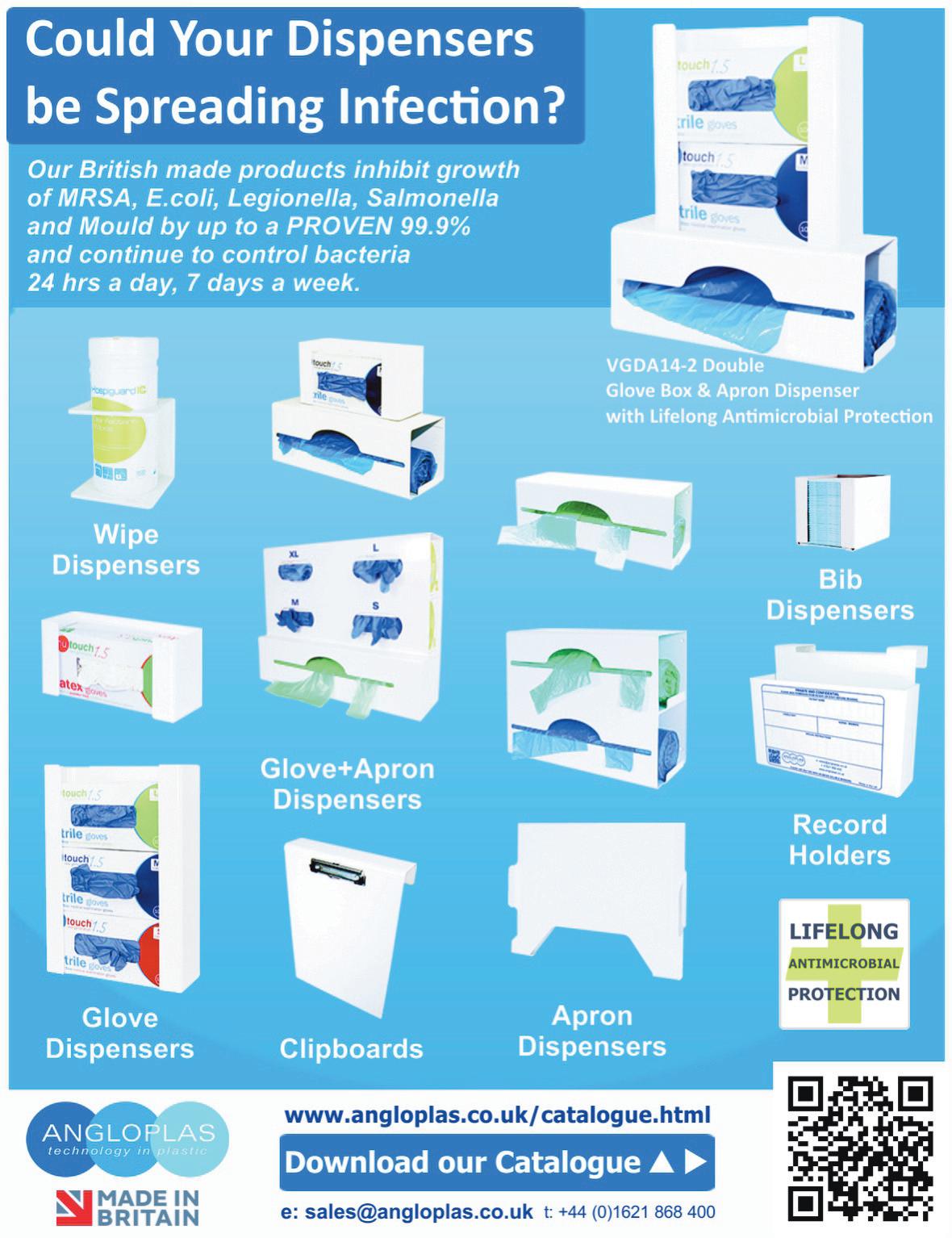
A new report has uncovered a shortfall of nearly 17,000 elderly care home beds across the south west.
The ‘South West Healthcare Market Insight 2025’ report, launched by property adviser, Christie & Co, examines the current stock of elderly care home beds in Cornwall, Devon, Somerset, and West Dorset, the key demand drivers for beds in the region, and the significant opportunity for new build developments.
According to data produced by Christie & Co’s consultancy team, the proportion of the population in the South West aged over 65 years is 35 per cent higher than the UK average, and the proportion aged over 85 years is 38 per cent higher.
Average house prices across the region sit 10 per cent above the UK average, with 41 per cent of the population owning their home outright –this is 24 per cent ahead of the average. These elevated levels of affluence provide support for a sustainable private fee-paying market.

To cater for the increasing elderly population in the region, there are 722 care homes in the South West, 24 per cent of which are purpose-built, which is significantly below the national average of 44 per cent. As a result, homes are typically smaller, with an average of 35 bed spaces per home (compared with the national average of 42 beds), and only 26 per cent have wetroom facilities. Cornwall has the lowest proportion of purpose-built stock, at only 15 per cent of the total, and Devon has the smallest proportion of stock over 40 bed spaces, at only 11 per cent.
A large proportion of existing providers report strong occupancy levels of 90.3 per cent, which is broadly in line with the national average.
Since 2021, 64 care homes have closed in the South West, resulting in a loss of 1,813 care home beds in the region. Of those homes, the average size was 26 beds, and 53 per cent had en suite provision.
Over the same period, 1,914 beds have been constructed, so there has been a net gain of just 101 bed spaces in four years. The average size of new registrations in the region is 40, with Cornwall having the lowest at 27 and Dorset having the largest at 55.
As of June 2025, there are only 456 beds currently under construction in the region.
Comparing the demographic demand with the supply of elderly care beds, at present, highlights an undersupply of 16,973 wetroom beds (full market standard beds) across the South West.
Christie & Co forecasts that this will increase to a shortfall of 18,289 by 2030 and 23,056 by 2035. The largest deficit is forecasted to be in Devon, at over 10,616 beds over the next decade. This underscores the urgent need for strategic planning and investment to ensure that future demand can be met effectively.
Karun Ahluwalia, Director – Healthcare Consultancy at Christie & Co, comments, “Smaller, converted homes are often well-placed to cater to their local markets, particularly in areas with lower population density. However, rising demand and a shortage of modern wetroom facilities present a strong opportunity for regional and corporate care operators to gain an early mover advantage by investing in new developments in the region.”
“Alternatively, operators can look to retrofit or reconfigure older stock that may not align with the latest market standards, thereby enhancing their competitiveness and future-proofing the homes. With the sector evolving to meet growing demand, strategic investment in high-quality care facilities will not only address existing gaps but also position operators for long-term success in an increasingly competitive market.”
To read the full ‘South West Healthcare Market Insight 2025’ report, visit: https://www.christie.com/sectors/care/south-west-healthcare-market-insight-2025/
HC-One’s De Brook Lodge Care Home in Flixton, Manchester, was visited on Friday 27th June by MP for Stretford and Urmston and Parliamentary Under-Secretary (Department for Work and Pensions), Andrew Western.
Residents and colleagues of the HC-One owned care home enjoyed meeting their MP, Andrew Western, and chatting to him about what life is like at De Brook Lodge Care Home – which is an integral part of the local Flixton community.
MP Andrew Western enjoyed a tour round the 52 bedded residential, and residential dementia care home, including the hairdressing salon, lounge, relaxing bathrooms with specialist assisted baths, spacious bedrooms with fitted furniture and ensuite facilities with flat screen smart TVs, telephone points and mini fridges with beautiful gardens.
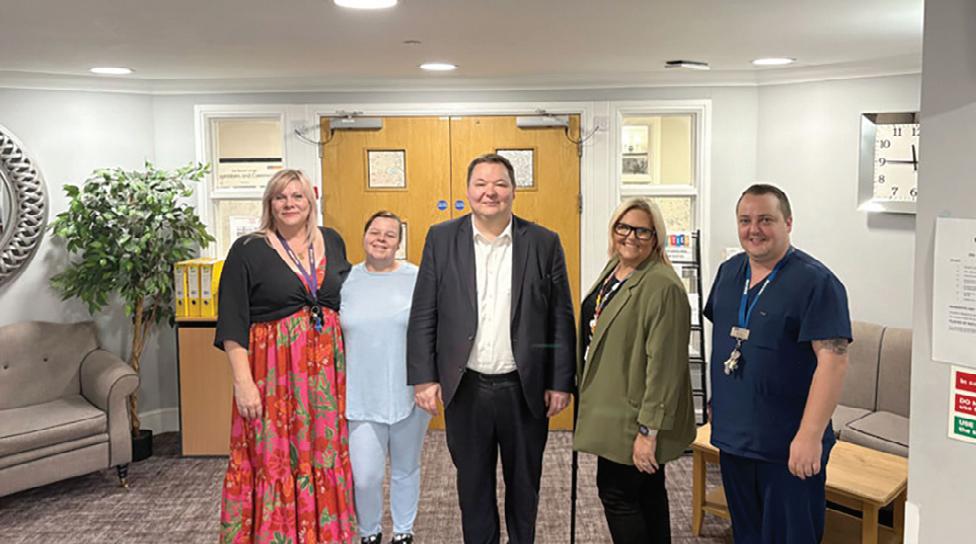
Alan Eyres, Home Manager at HC-One’s De Brook Lodge Care Home, commented: “We were delighted to welcome MP Andrew Western to our home. Everyone had a great time, chatting and discussing key issues they care about and what actions can be taken to overcome them.”
MP for Stretford and Urmston and Parliamentary Under-Secretary (Department for Work and Pensions), Andrew Western, said:“I very much enjoyed my visit to De Brook Lodge Care home in Flixton for this year’s Care Home Open Week. I met staff and residents – had a quick tour of the building, before sitting down with the management team to discuss the issues and challenges they face in the adult care sector. Thanks to all involved for the warm welcome.”




NHS England (NHSE) has confirmed the eligibility criteria and key dates for its upcoming autumn 2025 Covid-19 and flu vaccination programmes. Frontline health and social care workers, including staff working in care homes for older adults, will not be eligible for a Covid vaccination under the national programme launching this September.
In a statement the government said that: “Current vaccines provide good protection against severe disease and hospitalisation. UKHSA surveillance data relating to last autumn’s programme shows that those who received a vaccine were around 43% less likely to be admitted to hospital with COVID19 from 2 weeks following vaccination, compared to those who remained unvaccinated.”
“Vaccination continues to help protect against severe illness, hospitalisations and deaths arising from COVID-19. Last winter, between November, December and January around 13,000 people were admitted to hospital with the virus.”

ACCEPTING ADVICE FROM VACCINATION PROGRAMME EXPERTS
THE JCVI, NHS COVID VACCINATIONS WILL ONLY BE OFFERED TO THE FOLLOWING GROUPS:
• adults aged 75 years and over
• residents in a care home for older adults
• individuals aged six months and over who are defined as immunosuppressed
The move is a change from last Autumn, where health and social care workers were eligible for Covid-19 vaccination.
The exclusion of care home and NHS workers from the NHS vaccination programme is, the government says, based on scientific evidence that in the current era of high population immunity to COVID-19, additional COVID-19 doses provide very limited, if any, protection against infection and any subsequent onward transmission of infection.
For health and care workers, this means that COVID-19 vaccination likely now has only a very limited impact on reducing staff sickness absence.
Adopt A Grandparent and long-standing care home partner CHD Living have been named winners of the prestigious Intergenerational Activity Award at the National Dementia Care Awards 2025, in recognition of their groundbreaking work to tackle loneliness and support the wellbeing of people living with dementia.
The award celebrates innovative initiatives that bring generations together in ways that enhance lives and deliver real-world impact. The winning partnership does exactly that – pairing care home residents with dedicated volunteers for regular video or phone calls, many of whom have become like extended family.
Since day one, CHD Living has helped shape the programme as a founding partner, embedding Adopt A Grandparent into the heart of its homes. The results have been profound. Residents who were once withdrawn have found joy and confidence again through consistent, personal connection.
“Dementia may affect memory, but it doesn’t take away the human need for connection,” said David Annand, Head of Operations and Fundraising at Adopt A Grandparent. “This award is a celebration of the small, everyday moments that matter – the conversations that lift spirits, the laughter that brings confidence back, and the friendships that remind our older generation they’re never forgotten. We’re so proud to share this with CHD Living, who believed in the power of intergenerational connection from the very start.”
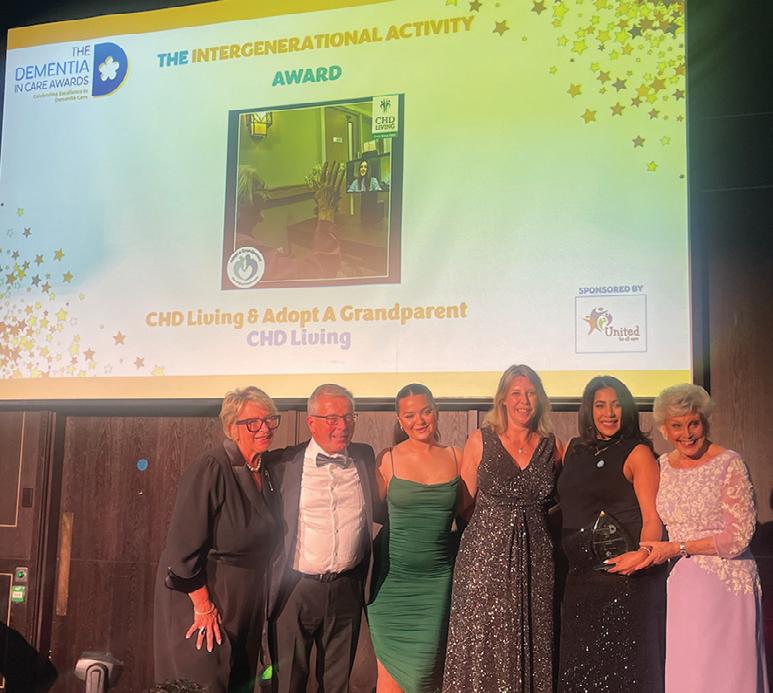
Jon Stanley, Chief Operating Officer at CHD Living, added:“Wellbeing isn’t just a word to us, it’s a feeling we strive to create every day. Through our partnership with Adopt A Grandparent, we’ve seen residents living with dementia rediscover parts of themselves that were fading: confidence, laughter, curiosity, joy. These calls may be short, but their impact is lasting. They remind our residents that they matter, that someone is thinking of them, waiting to speak with them. That sense of connection can lift a day, transform a week, even spark a renewed sense of purpose.
This award recognises the true power of human connection, and we’re incredibly proud to be part of it.”
What the judges and sponsors of the award said: “Given that Adopt a Grandparent has grown into a global initiative, it’s truly remarkable how the core mission is making a meaningful difference in people’s lives. It continues to shine through in everything they do. The passion and purpose behind the project remain as strong and authentic as ever. Amazing work.”
Emma Quaeck, Dementia Actif Gwynedd – Gwynedd Council said: “This is an outstanding and truly innovative project that stands out for its ability to bring people together and foster a strong sense of community.
With a clear and unwavering commitment to improving the lives of all who live in the county, it not only addresses local needs but also inspires meaningful connection, inclusion, and long-term positive change.”
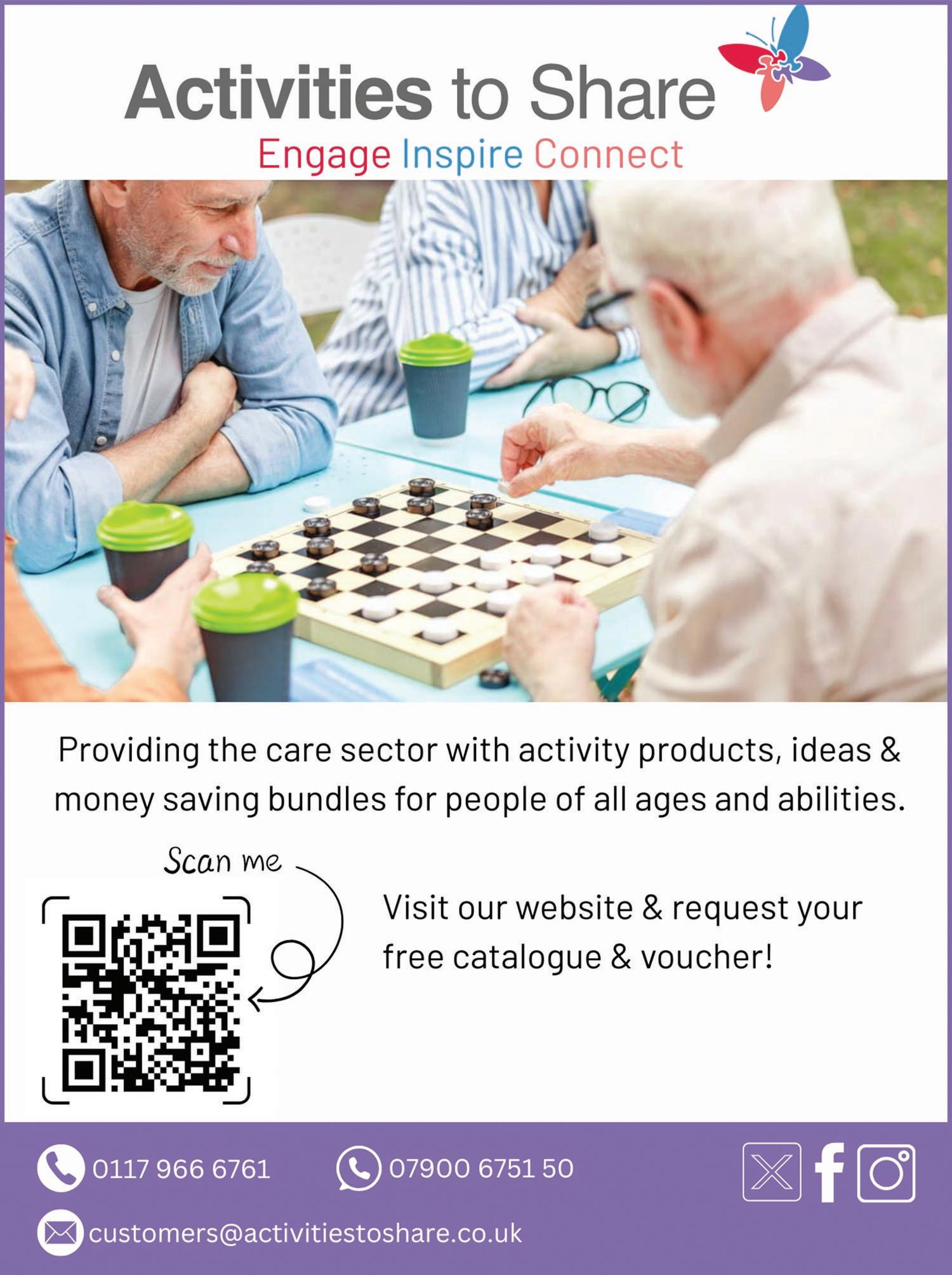
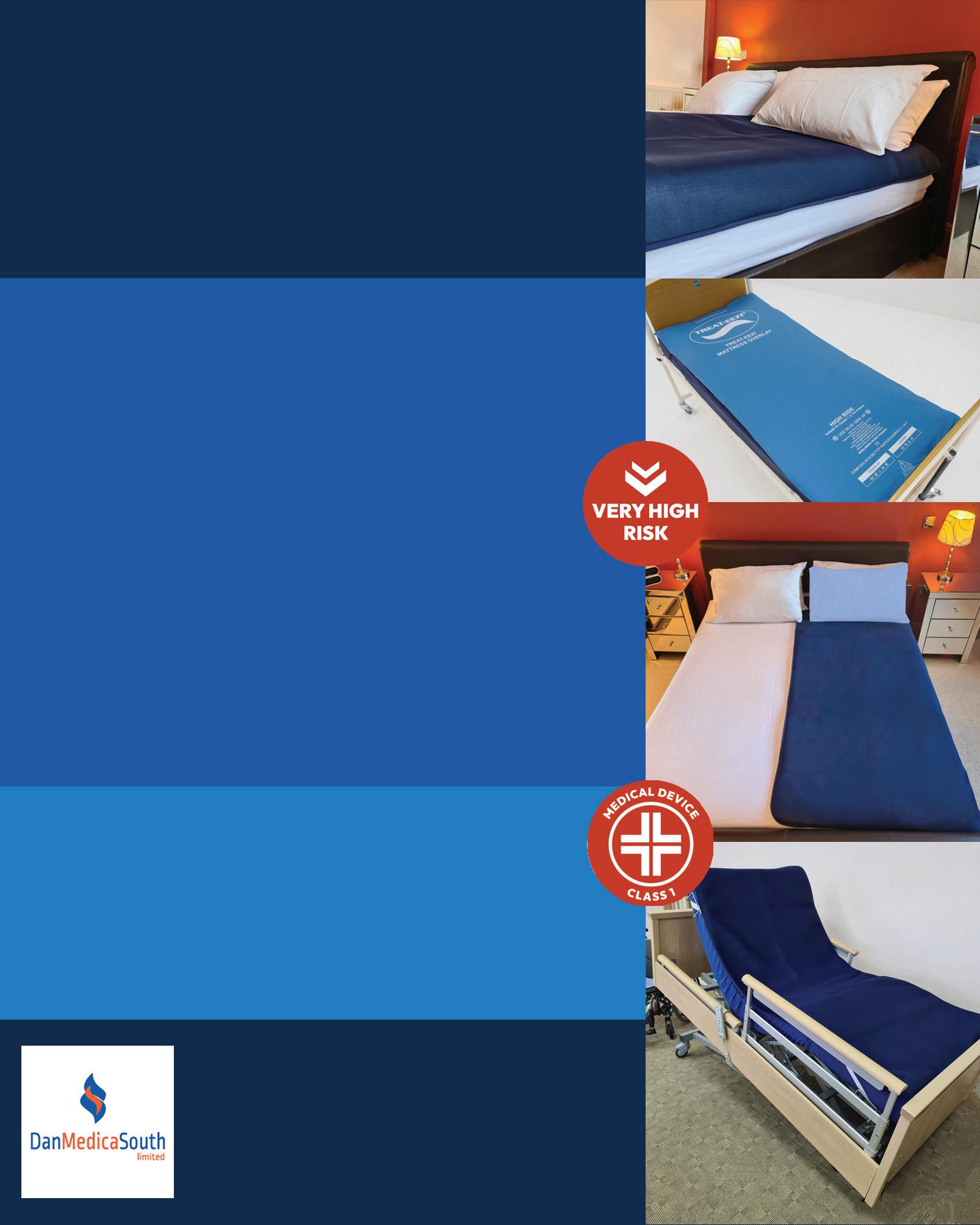

Sue Smart is the manager of Aria Care’s Abbeycrest Nursing Home in Sonning Common near Reading providing residential, nursing, dementia and palliative care.
She has been working in care for 40 years starting her career as a nurse where she worked in A&E for 20 years before moving into the community.
Under her leadership Sue has taken the home to full occupancy (70 residents) in less than a year (from 54). The complement of 76 colleagues are highly motivated and dedicated; there are no Agency care or nursing team members– rare in today’s climate of over 130,000 unfilled vacancies in the sector. Sue and the team are extremely proud of this as it shows great commitment between the team to cover when there is sickness and annual leave.
Sue picks up the story, “My day always starts with a walk-round the home and gardens, saying good morning to the residents, engaging with the nurses, carers, as well as spending time with the activity team, kitchen, hospitality team, laundry, and maintenance teams, my deputy home manager and the reception team. This amazing and loyal team is what makes this home the wonderful quality home it is and supports our excellent reputation. At around 10.30am each day we have a head
of department meeting to discuss any updates and plans for the day. Communication is vital to ensure we all know what is going on allowing us to deliver excellent continuity of care. Late morning three times a week I have a Regional Teams meeting updating my Regional Director of our day and plans for the week and is particularly good as we can share any ideas or ask questions to the others managers in my region, the team support here from other home managers is invaluable.
I am genuinely interested in how my team are feeling as well as hearing about the practicalities of the duties of the day. Being a good listener and approachable is so important; we all need to feel that we are seen and heard, of value! We are a stable, close-knit and supportive team, people stay where they are happy, two colleagues recently celebrated 10 and 5 years here, some have been here longer still. Our shared vision both here at Abbeycrest and in the wider Aria Care community is ‘care from the heart’ and we live and breathe that. It runs through everything that we do.
The remainder of my day consists of all the behinds the scenes work along with meeting with relatives, show arounds of prospective residents and completing assessments along with networking with the local and at times the wider community. Abbeycrest is a beautiful place, I feel so lucky to work here. No two days are the same. It is filled with life and activity with our objective to help our residents achieve the best version of themselves that they can. I feel sometimes people are surprised by how lively it is here and how much fun is had by everyone, both residents and colleagues. Our residents have led extremely full and interesting lives, why should their later years be any less stimulating and enjoyable! For example we have a new resident here and on completing her assessment we learnt that she was a successful and keen artist with many stunning paintings to show plus she has written a
book, her family are understandably most proud! So we are planning an afternoon/early evening gallery event to show her amazing works of art and meet the author! This will include invitations to the other residents and of course her family and friends. This theme of celebrating individual lives we will pick up with all our residents who wish to share whatever is their gift or passion.
We are always looking for ways of improving. My leadership style is consultative and colleague recognition is a priority. This consultative approach extends to the residents who we involve in the interview process of new colleagues and we have recently started a steering user group for residents; last month piloting the benefits of decaffeinated tea and coffee into the home. Residents’ families and friends are also invited to quarterly home update meetings and our first bi-monthly cheese and wine meeting that is open to the local community started in April where we have a guest speaker, we let the audience choose the subject they would like for the next meeting following the “You said, we did” ethos.
Outside of the demands of being a Home Manager I lead a full personal life, I have two wonderful sons and daughters-in-law, and look very forward to becoming a grandmother one day! I am blessed to live in the countryside so walking and embracing nature is a wonderful past time along with staying with my family in Devon too. I have been very blessed and even managed to find the time to meet my fiancé who I am in the process of setting up home with.
“I’ve been very lucky in my career and dedicated my life to people. People are my absolute passion and I love making a difference to people’s lives, both to the residents and their families. To get a smile when you see a resident or family member is priceless, it means everything to me to see them happy.”
Four care home residents and members of the care team from Rivermede Court care home in Egham had an unforgettable experience at the Royal Windsor Flower Show, where they showcased their talents in gardening, cookery and art. Competing in 15 categories, the group proudly brought home rosettes in eight categories - an impressive achievement made even more memorable by having the opportunity to meet His Majesty King Charles III, who took the time to chat with the residents and shake their hands.
Hanka Vlhova, Lead Wellbeing and Lifestyle Coordinator at Rivermede Court, part of Cinnamon Care Collection said, “After months of preparation for the competitions, we had the most incredible day with our residents, their relatives and members of our care team. It was filled with highlights, including meeting BBC TV presenter, Alex Jones and the legendary David Emanuel, designer of Princess Diana’s iconic wedding dress. However, having the opportunity to meet His Majesty the King surpassed all our expec-

tations for the day. He graciously spent time with our residents, creating memories that will last a lifetime. It was an honour and a privilege that left us all completely elated. In fact, we’re all still on cloud nine!”
This was the third year that Rivermede Court has taken residents to the Royal Windsor Show. The care home has a track record of success at the event and this year, secured first prize for their home-grown herbs, beetroot and lettuce, along with second prize for vegimal (animals made out of vegetables) and ornamental grass. They also won third prize for peas, broad beans and rhubarb, all grown by the residents in the wonderful gardens at Rivermede Court.
“I was so pleased that we won so many categories and it was so nice to meet the King and be so close to him,” said 94 year-old resident, Bill Jackson.
“Meeting the King was an absolute honour. I have never felt more proud of this care home. Winning these categories was well deserved. We have worked hard on the garden,” said Pat Woodison, an 88 year-old resident at Rivermede Court.
The pobroll® is the invention of Pat O’Brien, a physiotherapist, Moving and Handling trainer, and Conflict Management tutor with over two decades of experience in care homes and nursing homes
Care home managers often face challenges in delivering intimate care while balancing efficiency and managing costs, particularly when these essential tasks provoke behaviours that can be challenging to safely manage. Traditional methods—especially for bed-bound residents—often lead to lengthy processes and frequent linen changes, driving up costs and consuming valuable staff time. The pobroll® provides a transformative solution that supports dignified care, achieves significant cost savings, and reduces the need for additional staffing.
The pobroll® is an innovative bed-bathing wrap specifically designed to enhance comfort and dignity during personal washing for individuals who require in-bed care. Centred on the resident’s experience, it minimizes distress by providing sensory comfort. Crafted with two layers of high-quality cotton-terry toweling and a waterproof layer in between, it delivers a soothing, calming experience while keeping the bed completely dry. Sized for a standard single bed, the pobroll®’s dual-layer design offers warmth and a sense of security and privacy, allowing residents to maintain comfort and dignity during bed-based bathing routines.
BOOSTING COST SAVINGS AND OPERATIONAL EFFICIENCY

pobroll® provides an effective solution that supports both economic and environmental goals.
Managing resident agitation—particularly for those with dementia—often requires specialised training in restraint techniques. The pobroll® significantly reduces the need for physical intervention by providing a warm, secure covering that alleviates resident distress. This gentle approach minimizes aggressive or defensive reactions, reducing the number of staff needed for these interactions. As a result, facilities can potentially lower staffing levels without compromising care quality, yielding substantial cost savings. Additionally, reduced dependence on physical intervention decreases training costs associated with restraint techniques. By simplifying the process of intimate care, the pobroll® reduces the need for specialised training, making onboarding smoother and lowering turnover-related training expenses.
The pobroll® supports compliance with restraint reduction guidelines, helping facilities minimise documentation burdens and regulatory liabilities linked to physical interventions. This non-invasive solution improves safety for both residents and caregivers, fostering a culture of dignity and respect that boosts satisfaction among residents and their families.
CONCLUSION: A VALUABLE ASSET FOR QUALITY CARE AND COST MANAGEMENT
The pobroll®'s waterproof design enables caregivers to provide a complete wet wash without the risk of soaking the bed, minimising the need for frequent linen changes. This leads to fewer laundry loads, reducing labour and utility costs, as well as wear on linens. By reducing logistical tasks, caregivers have more time to focus on direct resident care, enhancing productivity overall. Additionally, reduced reliance on disposable wipes results in further cost savings and supports environmentally sustainable practices. With its durable, reusable design, the pobroll® maintains hygiene standards and allows for extended use across multiple residents. As care homes face increased pressure to adopt sustainable practices, the
For care homes, the pobroll® represents a strategic investment, offering measurable savings by reducing reliance on disposable products, lowering laundry and training costs, and enabling efficient staffing. Most importantly, it prioritises resident dignity and comfort, setting a high standard for compassionate, personcentred care. For facilities seeking to enhance financial performance and care quality, the pobroll® is an invaluable addition to their resources.
For further information, see the advert on page 5 or visit www.pobroll.co.uk
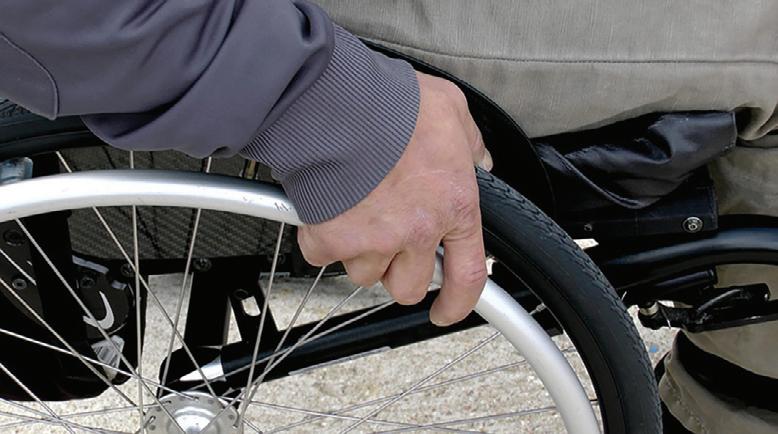
The Local Government and Social Care Ombudsman is issuing practical guidance to housing officers to ensure Disabled people’s homes meet their needs.
Following on from the Ombudsman’s focus report on Disabled people and housing, the new Good Practice Guide is designed to help officers in local councils improve their practice when dealing with people who need housing adaptations, often through what are called ‘Disabled Facilities Grants’ (DFGs).
Alterations can include simple changes like handrails or ramps to extensive adaptations like internal lifts or extensions to create wheelchairaccessible bathrooms or extra living space. The guide includes several case studies drawn Ombudsman investigations to illustrate the difficulties people have faced, and the solutions and remedies recommended by the Ombudsman to put the problems right.
DRAWING ON THE OMBUDSMAN’S EXTEN-
SIVE EXPERIENCE, THE GUIDE ALSO OFFERS
KEY LEARNING POINTS FOR OFFICERS, INCLUDING:
• ensuring robust procedures set out expectations for all services involved in delivering DFGs, including timescales, to avoid delay
• communicating clearly and effectively with applicants
• keeping accurate and detailed records, particularly of the agreed works and amount of the grant awarded
• ensuring the completed works meet the assessed needs
• having regard to the additional guidance on DFGs for children
Ms Amerdeep Somal, Local Government and Social Care Ombudsman said: “Disabled Facilities Grants can play an essential role in helping people remain in their homes for as long as possible with the best possible quality of life.
“They are often complex, not just because of extensive building work, but also the numerous organisations involved. So it’s essential that councils do all they can to avoid delay, and ensure any work is carried out to adequately meet people’s needs. When it does not, we know this can be extremely stressful for the people involved.
“We are issuing this guide – directly aimed at those officers who work with Disabled people in their homes – to help ensure local councils get things right.”
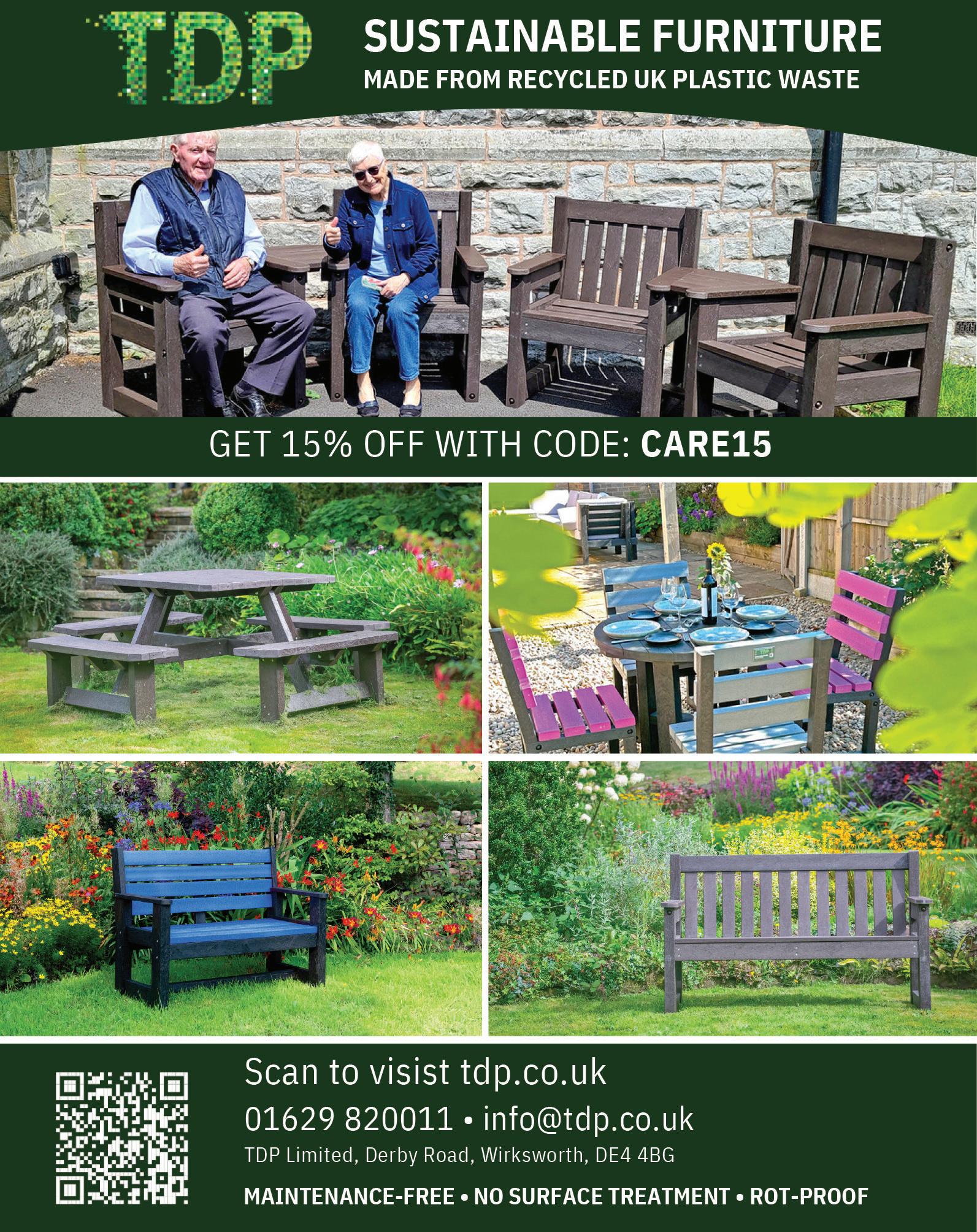


Watch your resident's eyes light up when the beautiful tea trolley arrives! Euroservice
products to residents. How about a delicious snack/pastry trolley or even a drinks trolley for that

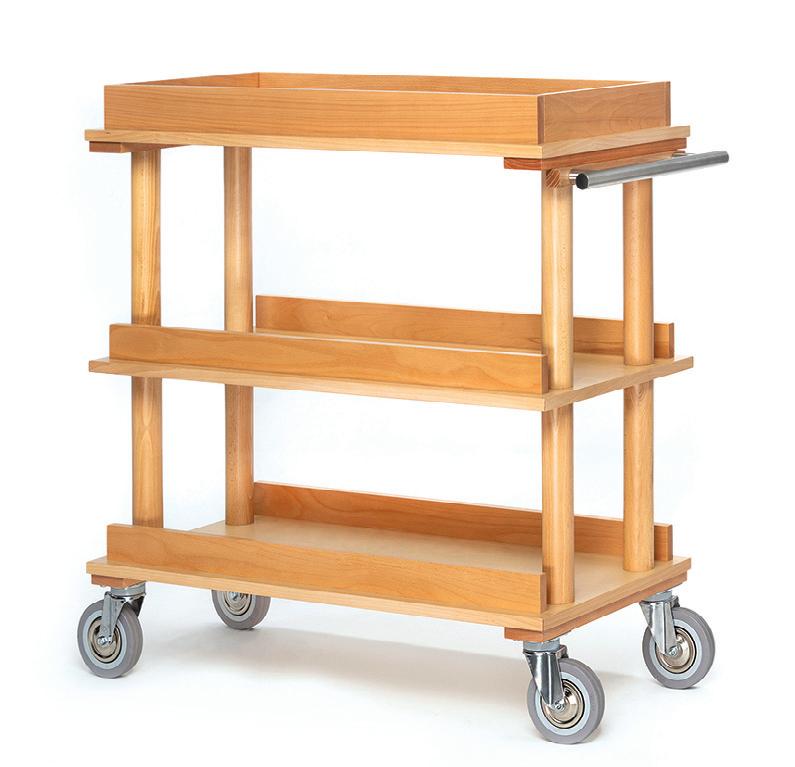
lovely trolley

tipple?
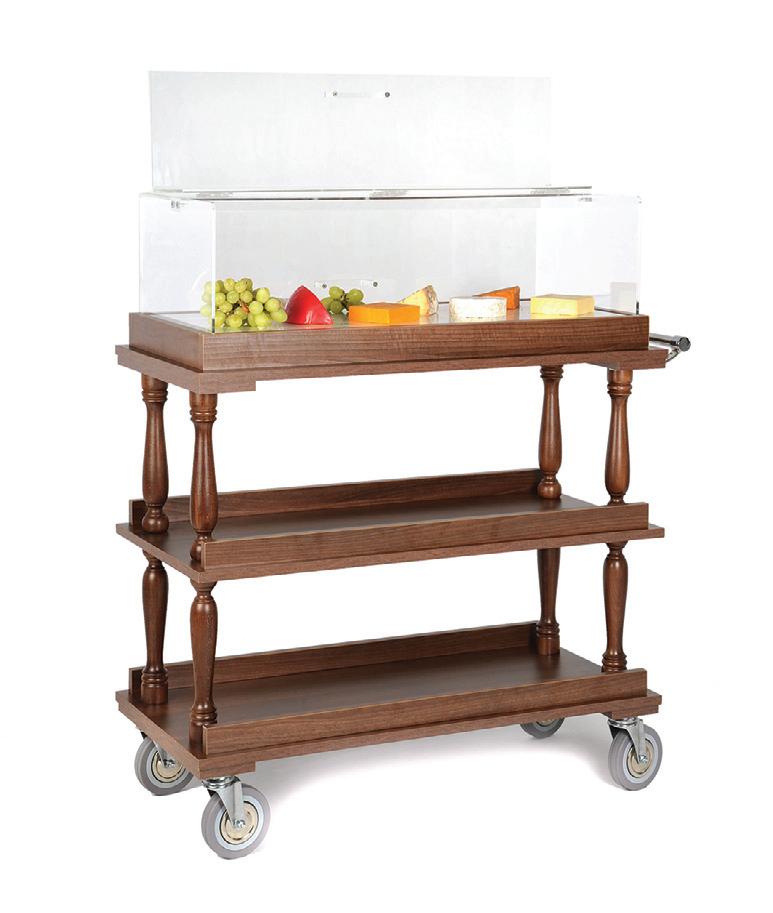
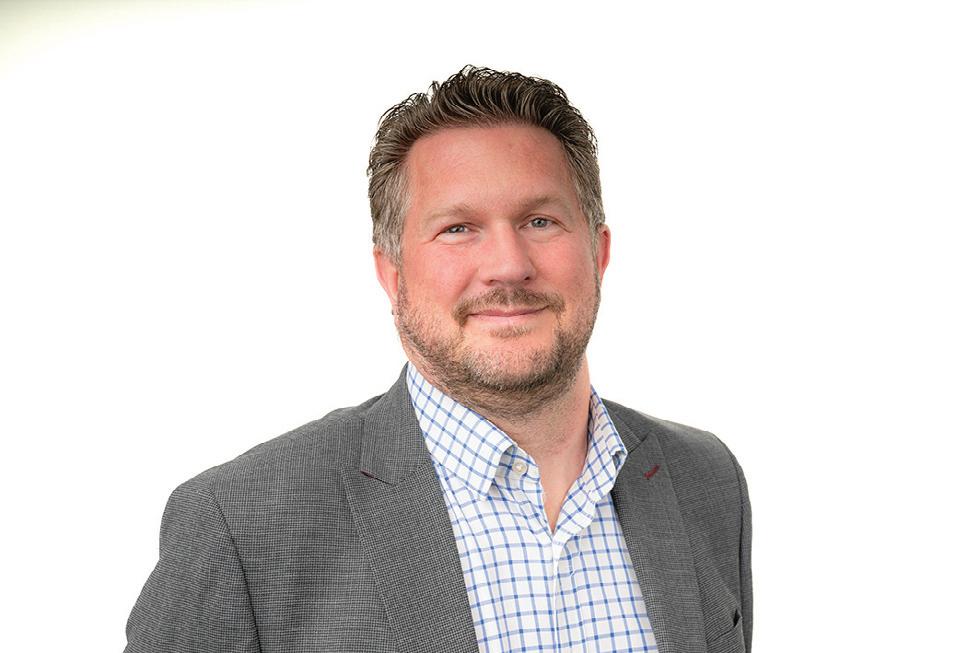
The UK care sector is facing a significant surge in insolvencies and restructuring activity, as a perfect storm of escalating operational costs and insufficient funding pushes providers to the brink. Adrian Slater, partner and solicitor at Nelsons specialising in insolvency, discusses the importance of early intervention and how care providers can prepare as financial pressures increase.
A recent survey by the Care Provider Alliance paints a grim picture: a staggering 22% of care providers are contemplating outright closure, 77% are being forced to deplete their reserves, and 64% anticipate staff redundancies. These figures highlight the severe distress within the sector, which is grappling with a multitude of challenges.
While the long-standing issues of underfunding and workforce shortages persist, the 2024 Autumn Budget has significantly intensified the pressure with increased business costs, particularly through Employer National Insurance Contributions (NICs) and National Living Wage uplifts. For a sector where many employees are on minimum wage, these uplifts translate directly into substantial increases in salary costs.
FEELING THE SQUEEZE
Beyond salary hikes, care providers are contending with a broad spectrum of rising operational expenses, ranging from energy bills and inflation of food and supplies to legacy debts that have made it even harder to absorb the current wave of cost increases.
The sector's woes are compounded by factors beyond direct financial outlays, with recruitment also taking a hit. Between 2022/23 and 2023/24, the social care vacancy rate fell from 9.9% to 8.3% and the number of vacancies fell from 152,000 to 131,000. However, this remains higher than the overall unemployment rate of 4.6% currently.
Care homes heavily rely on international recruits to fill vacancies, and the inability to access this talent pool means providers are having to pay more for staff they simply can't find.
Occupancy levels, which haven't fully recovered since the COVID-19 pandemic, are also a significant concern, which makes it incredibly difficult for care homes to achieve profitability. Furthermore, the relationship with local authorities, who often commission a significant portion of care, presents its own set of challenges as many also face cashflow challenges.
The age of many care facilities presents a hidden cost as well; those built some time ago require ongoing maintenance and investment, but without the means to fund these essential upgrades, facilities can deteriorate, leading to further problems and regulatory scrutiny.
WARNING SIGNS
The Care Provider Alliance survey figures are clear indicators of a sector in distress, particularly the widespread reliance on reserves and anticipated redundancies. While redundancy is a legitimate tool to reduce overheads and not necessarily a 'red flag' in isolation, when combined with other factors, it can point towards an organisation heading for insolvency.
Drawing on reserves, while not immediately signalling insolvency in the strictest sense (as the business can still pay its debts), indicates a concerning trend. Unless income can be increased, fully utilising those reserves will quickly become a major problem.
The critical message for care providers is early intervention; the earlier a business owner seeks advice –even when just contemplating redundancies or drawing on reserves – the better. It's far more effective to
seek advice from an insolvency specialist at that stage rather than trying to solve the problem in isolation. Doing so dramatically increases the chances of exploring restructuring or rescue options, rather than facing terminal insolvency like liquidation.
It’s expected and certainly recommended that care providers should undertake regular financial monitoring, no less than monthly, to spot potential problems straightaway. Similarly, this will help forecast financial projections, six to 12 months in the future ahead, if not further ahead, which can pinpoint any chance of cash shortages.
If a care provider is struggling to pay creditors when required, this is a clear issue that requires a conversation, perhaps to lengthen the terms, but it is also a good point to speak to an insolvency professional. The alternative, which is unfortunately a common route for some business owners, is trying to deal with the problem with personal money or high-interest borrowing – these rarely solve the underlying issue and can put the situation in a worse state.
There is a widespread myth that insolvency practitioners are seen as the 'undertakers', but the vast majority would much rather rescue a business and save jobs than put it into liquidation. Early engagement opens up many more options.
When a company is faced with financial distress, a variety of formal insolvency procedures are available. These include:
Company Voluntary Arrangement (CVA) - This allows incumbent directors to remain in charge while repaying creditors over time under the supervision of an insolvency practitioner. However, viability for the care sector might be limited as it creates a sphere of insolvency around the business, which might deter new residents.
Administration: More commonly used in the care sector, the primary aim of administration is to rescue the business as a ‘going concern’. An insolvency practitioner will often seek a buyer pre-appointment. Early advice is key here, as an administrator may be able to trade the business for a short period to maximise its value on the open market.
Restructuring plans: These are designed to save a viable business and maintain continuity of care for residents and employees, though it may result in creditors being left out of pocket. However, in reality, most insolvencies leave unsecured creditors with nothing anyway, with HMRC often being a preferential creditor and with secured creditors in the main being afforded priority over the unsecured creditors.
Liquidation: This is the final insolvency process when nothing else is viable. The business ceases trading, employees will be let go and residents must be removed. This necessitates crucial conversations with stakeholders to find alternative provision.
Given the imperative to maintain continuity of care, administration and restructuring plans are often the most suitable options for care providers, as they prioritise the sale or reorganisation of the business to ensure ongoing service delivery.
WEATHERING THE STORM
While the challenges are formidable, care providers can take proactive steps to mitigate risks and improve resilience.
Providers must rigorously review and renegotiate contracts with suppliers and local authorities to maintain control of costs and cash flow management. Exploring energy efficiency measures, optimising procurement strategies, and adopting technology to streamline operations are also crucial.
This also feeds into staff optimisation and managing these costs without compromising care, quality, or morale. This may involve investing in training, implementing retention incentives, and carefully managing reliance on agency staff. Exploring how AI and other technologies can be utilised to improve services and reduce costs is an essential consideration for the future.
Ultimately, the fundamental message is clear: seek professional advice early. There's a reluctance to speak to insolvency practitioners due to perceived costs, but the benefits of early intervention for all parties involved are immense, and could save money, jobs and the business in the long run. The longer you delay, the more limited your options become.
A care home provider held an afternoon party to recognise and celebrate dozens of colleagues who have given 20 or more years’ service.
Seventy Colten Care staff from the company’s 21 homes in the south and Ringwood head office came together to dine and have fun at the Harbour Hotel in Christchurch, Dorset. It was the latest meeting of members of the ‘Colten Club’, an informal group set up in 2019 to honour long service, loyalty and commitment.
There are currently 106 employees who have reached the 20year milestone, with 19 more set to ‘join the club’ during 2025. Representing all departments, both clinical and support, they have amassed a remarkable 2,344 years of service between them. This year, three long-termers with 25 years’ service – Vivien Taylor, Susan Gunn and Karen Luke – each received framed certificates and £1,250 shopping vouchers.

George Colwell, Co-Chairman and Estates Director, who presented the certificates, said: “It’s the contribution of generations of team members that has made us so successful as a care home provider.
“And we are fortunate to have such an inspiring group of long-servers who have each stayed for more than 20 years and shown amazing individual commitment.”
Guests were welcomed with drinks and had the chance to have their faces sketched by Grooves Caricatures during the reception.
This was followed by a three-course meal, garden games and cocktails to round off the afternoon.
Colten Club member Lorna Parsons, Chef at the Poole care home Bourne View, was one of those attending.
Lorna was a teenager when she began working for Colten Care in 1998 as a part-time dishwasher and waitress.
In 2002 she became the company’s first apprentice chef, training at The Bournemouth & Poole College.
After qualifying, she became second chef at Belmore Lodge in Lymington and went on to lead the kitchen team at Amberwood House in Ferndown.
In 2022, she achieved national recognition by being crowned Chef of the Year at the prestigious National Care Awards.
Lorna, who has recognised the mentoring and support she received from recently retired Hotel Services Manager Fergus Davitt, said:
“I have had huge support. It was Fergus who gave me my first job all those years ago and he was always there for me, pushing me to be better. He and so many other people at Colten have been such a huge support to me in my career.”

We offer high-quality residential, nursing, dementia and respite care in a welcoming and engaging environment. Arrange a visit to discover comfort, companionship, and expert care. Find your
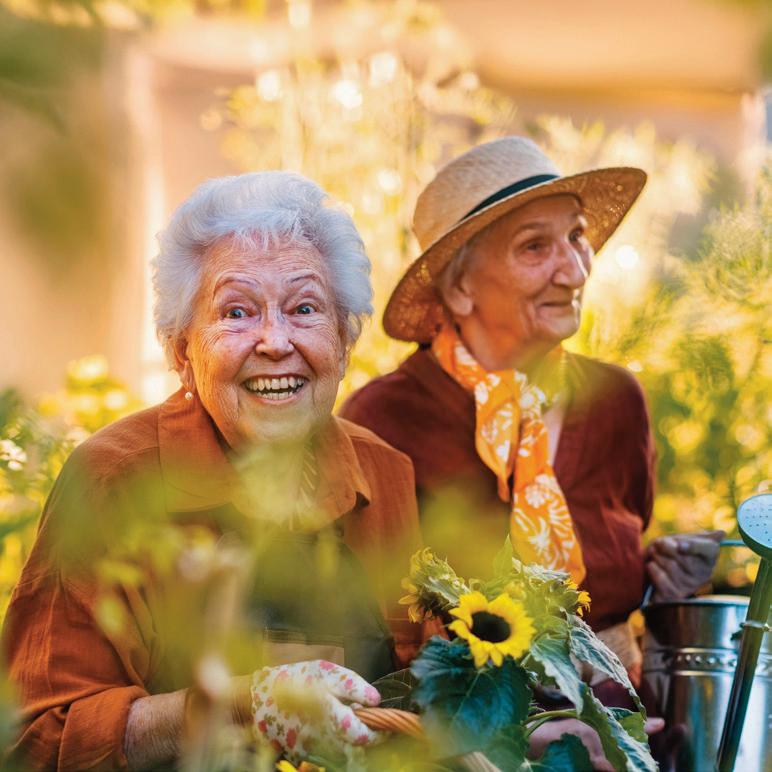
The Independent Care Group (ICG) has welcomed the next phase of the UK COVID-19 Inquiry, which began on 30 June and will scrutinise how the pandemic was handled in the care home sector. This phase will examine the response to COVID-19 within adult social care, including the impact on care home residents, staff, and providers.
As the Inquiry turns its attention to this critical area, the ICG is calling for swift, decisive recommendations and, crucially, for them to be acted upon urgently.
The ICG also used the moment to pay tribute to the dedication and bravery of people and social care staff across the country during the pandemic. ICG Chair Mike Padgham said:
“We want to thank all the incredible staff across health and care services who worked through the COVID pandemic. In particular, I want to pay tribute to the social care workers in care homes and delivering domiciliary care, who placed themselves in harm’s way every single day.

Many gave up time with their own families, even lived in care facilities, so they could look after others safely. They put their clients and residents ahead of everything else. That courage and sacrifice should never be forgotten.
We also remember, with great sadness, staff who lost their lives, and all those who died during the pandemic. Our condolences go to their families and loved ones. It was a deeply anxious and traumatic time for so many.”
The ICG, which represents care providers, said that while the COVID Inquiry is welcome and necessary, it must not become a slow-moving exercise in hindsight. Mr Padgham added:
“The Inquiry is costing a great deal of public money, and it must deliver value by reporting much sooner. If we’ve learned anything, we must act now. Sadly, I fear we haven’t learned the lessons and the country is perhaps no more prepared in social care for a future crisis than it was in 2020.
Social care remains a second-class citizen to the NHS; underfunded, under-resourced, and undervalued. We cannot go on like this. The people we care for, and the staff who look after them, deserve so much better.”
During the early stages of the pandemic, social care providers were left without testing, adequate PPE, or clear guidance. The promise of a “protective ring” around care homes, the ICG says, was tragically far from reality.
Mr Padgham said: “We were told care homes were protected and they weren’t. We were left to cope with discharges from hospitals without testing, without proper PPE, and without the support we desperately needed. If this Inquiry does anything, it must ensure that this never happens again. We must protect the most vulnerable and value the services that care for them.”
The ICG also highlighted the immense value of social care to the fabric of society not just during the pandemic but every day.
“Social care enables millions of people to live with dignity, comfort, and independence. It relieves pressure on the NHS, supports families, and sustains communities. The dedication shown by the workforce during the pandemic demonstrated its vital role, it is time that role was recognised, respected, and properly resourced.”
Staff and residents at Barchester’s Upton Bay Care Home in Hamworthy are congratulating their superstar Managing Director, Natasha Lazovic, who has been promoted to the Executive Board as Chief Operating Officer. Natasha had just celebrated her 11th anniversary with Barchester Healthcare when her much-deserved promotion was announced.
In 1994 Natasha came to the UK from Serbia as a trained nurse and never looked back, her achievements bear testament to her amazing career. She joined Barchester in May 2014 as Regional Director leading 10 homes, which then doubled to 20 as Senior Regional Director. As Managing Director of the South, Natasha was in charge of the 87 care homes that form Barchester’s largest division.
Natasha’s promotion to Chief Operating Officer has led to a restructure of the South division which will now split to form two smaller divisions led by Duncan Edwards who becomes Managing Director of the South West Division and Michelle Macadangdang who is promoted to Managing Director of the

South East Division.
Commenting on her new role, Natasha said: “It has been my absolute privilege to be Managing Director of the South division, I have loved working with each and every one of my homes but I move onto my new position happy in the knowledge that Michelle and Duncan with be excellent new Managing Directors for their respective divisions. I am eager to see what my new role brings, I look forward to getting to know all of the teams, patients and residents in my new homes and hospitals across the country.”
CEO of Barchester Healthcare, Dr Pete Calveley, added: “Natasha’s energy, her passion and determination never cease to amaze me, she is an absolute powerhouse and I know she will be brilliant in her new role.
I am excited to see what improvements and innovations she will bring, I am certain the whole business will benefit from her years of operational experience and laser focus, I can think of no one better to be our new COO.”
A family-run West Devon care home has joined the elite few UK social care settings to have adopted of the acclaimed ‘Butterfly Approach’ – establishing an exemplary dementia care culture where people can thrive.
West View Care Home, in Bere Alston, recently completed the significant 18-month transformation to provide a more personcentred care model and elevate its “excellent” offering even further.
Following rigorous monthly support with the team at the 28bed home, along with those who live there, West View received accreditation in the prestigious Butterfly Approach from Meaningful Care Matters. The care and culture consultancy group specialise in focusing on the development of resilient, relationship-centred cultures of care shaped by the people living and working within them.
The Butterfly Approach has a meticulous focus on creating a culture where people are ‘free to be me’. It values emotional intelligence and the core belief that everyone has a unique story that has meaning and matters. It also encourages care providers to put the focus back on the people they care for and their emotions, by engaging in the reality of people’s lived experience in the ‘here and now’.

The transformation at West View included splitting the home into two separate living areas – Wren and Robin – where people with early-onset dementia or without dementia live together and people who experience more complex needs or later stage dementia live together. This fundamental change to a small household approach has enabled holistic care to flourish, where emotions-based care is balanced with clinical care best practice.
The home has also been decorated with vibrant colours and murals to bring warmth, with items of interest all around representing each individual and their life story – what Meaningful Care Matters calls the ‘stuff of life’, creating a family atmosphere.
Diane Kehoe, Manager at West View Care Home, said: “As a second-generation family-run business, we always aspire to create a stimulating, engaging and enjoyable environment – and the Butterfly Approach has provided us with the platform to offer that around the clock. I was already familiar with the approach and saw the potential West View had in achieving it. The transformation was not easy, and we had a few
challenges along the way, but the rewards upon completion have made it so worthwhile.
“We believed in the whole process from the outset and the staff embraced it – showing so much patience and kindness. They treat the residents like family, enjoying life together with lots of laughter and fun. When you step into the home now you can really sense the buzz of the place, and the level of care is both phenomenal and heartwarming.”
The overall findings from Meaningful Care Matters during a final audit last month identified the home as “excellent”, offering a highly engaged service that prioritises meaningful moments and where emotion-focused care is consistently seen, felt and heard in interactions with people. It also reported that individuality and self-expression are encouraged within the home, allowing people to freely be themselves.
Peter Bewert, Managing Director of Meaningful Care Matters, said: “West View has transformed into a truly wonderful home. The team have clearly embraced the desire to change and have achieved amazing results, being guided and supported by Diane. They have also lifted their CQC rating from ‘Requires Improvement’ to ‘Good’ and are aiming over the course of the year to reach ‘Outstanding’. They have also been supported by the local service improvements team, who were so impressed at the transformation that they plan to use West View as a role model for other homes.”
Peter continued: “The journey has been incredible. From what we would call a ‘traditional’ care home, West View has come alive and now has a genuine feeling of family, togetherness, love and purpose for the people living there.”
The home aims to continue elevating its high standard of care, with ambitious plans to be acknowledged and approved by the National Dementia Care Accreditation Scheme. It also plans to achieve the ‘gold standard’ for end-of-life care by the Gold Standards Framework.
For more information on West View Care Home, please visit https://westviewcarehome.co.uk/.
For
https://meaningfulcarematters.com/.

Inappropriate polypharmacy – the excessive or unnecessary use of multiple medications – is a major driver of emergency hospital admissions among adults aged 65 and over, according to a new study from the University of Bath.
The researchers hope their findings will pave the way for the development of a digital tool – such as an app – to proactively identify older adults at risk of medication-related harm and intervene before a hospital visit becomes necessary.
The study – published in Age and Ageing, the UK’s leading journal on clinical gerontology – is the first of its kind to use data-driven methods to explore how potentially inappropriate polypharmacy contributes to shortterm hospitalisation in older adults.
With this population growing rapidly and facing increased risks of complications from being hospitalised, the findings reinforce concerns in geriatric care over the dangers of overprescribing.
THE HIDDEN DANGERS OF OVERPRESCRIBING

Older adults often take multiple medications to manage chronic conditions such as diabetes, hypertension and arthritis. This can lead to prescribing cascades, where side effects from one drug are treated with additional medications, creating a cycle of escalating complexity and risk.
For instance, a patient might be prescribed a drug for pain management, develop high blood pressure as a side effect and then receive another medication to manage that new symptom. Over time, this can lead to a complex web of prescriptions, carrying the risk of harmful interactions.
PhD researcher Robert Olender from the Department of Life Sciences at Bath, who led the study under the supervision of Dr Prasad Nishtala and Dr Sandipan Roy, said: “With more older adults on complex drug regimens, we need proactive ways to reduce preventable emergency hospitalisations.”
Though the new research is focused on data from the UK, polypharmacy among older adults is known to be a growing problem globally, with studies from countries that include the US, Australia, New Zealand and across Europe consistently linking polypharmacy to increased risks of hospitalisation, adverse drug reactions and reduced quality of life.
FROM RESEARCH TO REAL-LIFE IMPACT
The research team envisions an app for clinicians that uses a simple questionnaire to assess a patient’s risk of hospitalisation. Questions might include current prescriptions, lifestyle factors (e.g. smoking and alcohol use) and chronic conditions like cancer or hypertension. The tool would then generate a risk score, allowing clinicians to make informed decisions in real time.
Such a tool could serve as a low-cost, high-impact intervention to keep patients safe and create savings for the NHS. By identifying high-risk patients early, clinicians may adjust medication regimens, encourage physical activity or address modifiable lifestyle factors – simple steps that could significantly reduce an individual’s risk of an emergency hospital admission.
While the app could be developed relatively quickly, integrating it into clinical workflows would require regulatory approval and trials. However, the potential benefits – fewer hospital admissions, improved patient safety, and reduced healthcare costs – make this a compelling investment, the researchers believe.
The team hopes such a tool would raise awareness among healthcare professionals, particularly those in primary care, community pharmacies and hospices, where early intervention could help prevent emergency hospital admissions.
Mr Olender said: “As populations age worldwide, addressing inappropriate polypharmacy has become a key public health priority. Our new study contributes to the international evidence base by employing advanced data-driven methods to gain a deeper understanding of the scale and consequences of this issue in the UK context.
“Our aim is to turn the study’s findings into an impactful tool to support safer prescribing and improve the care of older adults.”
Dr Nishtala said: “Inappropriate polypharmacy remains a global issue, and the identification of consistent risk factors across studies highlights the timeliness and relevance of the current investigation.
“A tool that helps assess the risk of hospitalisation in older adults could bring real benefits. It might spare patients and their families the stress and disruption of a hospital stay, support healthier ageing by keeping people out of environments where they’re more vulnerable to infections and complications, and ultimately help the NHS save valuable resources.”
The Air at Elm Bank care home in Kettering was filled recently with an extra special energy as residents and staff were captivated by Gavin and his musical performance.
Gavin whose stage name is Gav…lalala, performed a repertoire of music that spanned the golden era, including Elvis Presley, Frank Sinatra and Dean Martin. Gavin’s visit underscored the profound and undeniable power of music for those living within a care home setting. The whole lounge was filled with familiar melodies that transformed the atmosphere in to what was truly a vibrant concert. Live music in care homes really offers a wealth of therapeutic benefits. It stimulates cognitive function and certainly helps to reduce anxiety whilst allowing for social interactions, helping residents to not feel loneliness and isolation.
Tina, the activities co-ordinator said, “It was truly amazing to see the res-

idents so engaged and happy. Gavin really connected well with everyone through his music and you could really feel the positivity in the room, even after he had left. It was his debut performance here and we are all looking forward to booking him again very soon for another amazing afternoon.”
Marvellous Bindura, General Manager at Elm Bank said: “It was the first time that Gavin has played for us here at the home, and the residents and staff really enjoyed his performance. It is really important here at the home that we offer a whole host of activities that enhance the quality of life for all here, music is certainly a big favourite for many of our residents.”
Our varied life enrichment programme keeps residents active, and provides a daily choice of engaging physical, mental and spiritual activities tailored to residents’ interests and abilities.
In care environments where hygiene and safety are paramount, Jangro’s Professional Nitrile disposable gloves (DG130) offer a dependable solution, meeting the rigorous demands of daily care tasks. Designed with caregivers in mind, these gloves provide a comfortable fit without compromising on protection.
Made from high-quality nitrile, these gloves are both powder and latexfree, making them an ideal choice for individuals with latex sensitivities. Nitrile technology provides an exceptionally soft and pliable material that conforms naturally to the shape of the hand. This flexibility reduces hand fatigue during prolonged use and extended wear, allowing caregivers to perform tasks with comfort and ease. Textured fingertips enhance grip, even when wet, ensuring precision during delicate procedures. Whether assisting with personal care, handling food, or performing cleaning duties, these gloves support a wide range of applications within care settings.
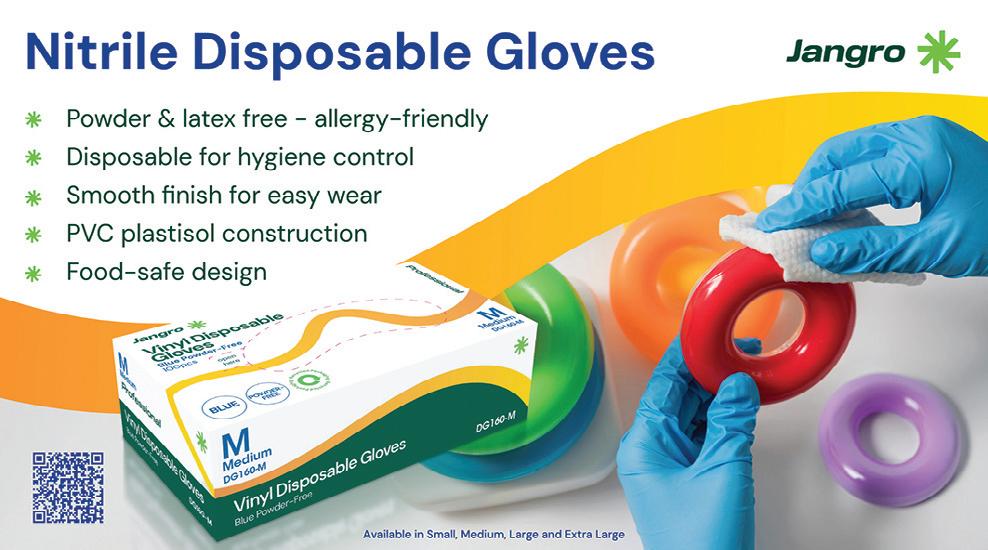
They’re more than just protective, these gloves are fully compliant with EN455 standards for medical use and EN ISO 374-5 for protection against bacteria, fungi and viruses, underscoring their suitability for infec-
tion control protocols. They also comply with the Medical Devices Regulation (EU) 2017/745 Class I and are manufactured in accordance with the Personal Protective Equipment Regulation (EU) 2016/425. Plus, they’ve been tested for food safety compliance under Commission Regulation (EU) No 10/2011, meaning these gloves are as versatile as they are protective.
The design features, including ambidextrous fitting and ridged cuffs for easy removal and their vibrant blue colour to aid visibility, have been carefully considered to streamline workflow for busy care professionals. At Jangro, we understand that the right protective equipment isn’t just about meeting standards, it’s about supporting the people who care for others every day. That is why our nitrile gloves are manufactured under stringent quality controls to meet the demands of healthcare environments, providing peace of mind for both staff and residents. For more information or to view the full range of disposable gloves visit Jangro’s official website. www.jangro.net

A local resident has been recognised with the King’s Award for Voluntary Service as part of his exceptional work with Ashton United Football Club.
Retirement Living resident Howard, who lives at Housing 21’s Chesworth Court in Manchester has been nominated for the prestigiousaward, the highest honour a voluntary group can receive in the UK, equivalent to an MBE.
When asked what it meant to receive the award, Howard said: “I was a totally surprised and overwhelmed to be recognised in this way. It has been a privilege to support all these sports grounds over the years and help keep people safe.
“I’m proud of Ashton United in the Community and everything we do.” Howard’s nomination recognises his outstanding dedication toAshton United in the Community, a local initiative tackling some of society’s most pressing challenges, including
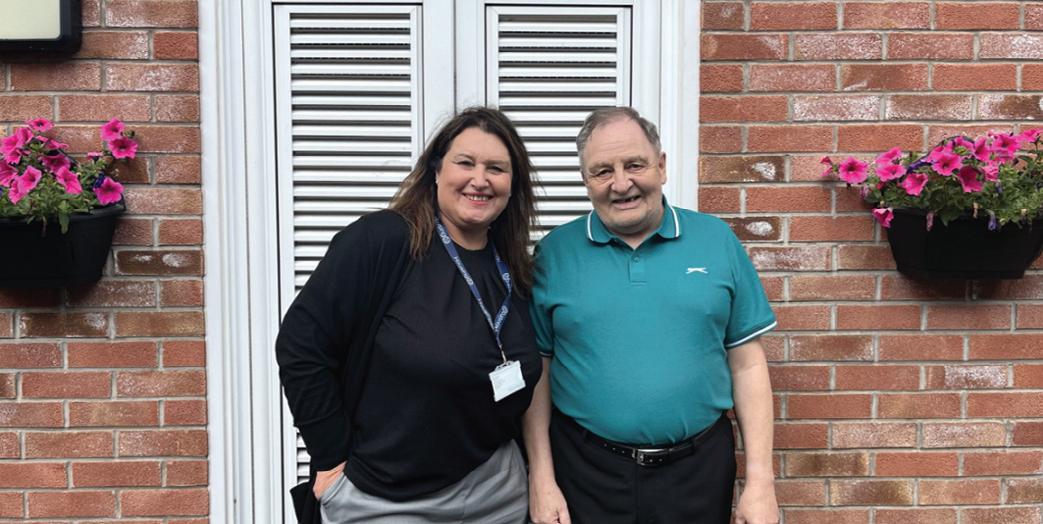
poverty, loneliness, isolation, wellbeing, community safety, and unemployment.
The 67-year-old has lived at the Retirement Living scheme for eight years and has been a familiar and friendly face at football matches, serving as a steward and ensuring fans enjoy a safe and welcoming environment for much longer. For over 25 years, Howard has been volunteering at various sports grounds including Stockport County, Sale FC Rugby Club and Salford Rugby League Club. Beyond the pitch, he devotes his time to supporting theAshton FC Food Bank, helping to provide vital supplies to those in need every fortnight.
“We’re all extremely proud of our lovely Howard,” said Catherine, Local Housing Manager.
“His kindness, commitment, and community spirit embody everything we stand for. He is a shining example of how one person can make a lasting difference.”
90-year-old Peter Strangeman from Broadlands Lodge care home in Norwich took a very special day trip to Saxon Airbase, where he shared memories of wartime Britain and his unexpected encounter with Winston Churchill.
Peter’s visit to Saxon Airbase was driven by his lifelong interest in history. Born and raised in Dartford, Kent – once dubbed “Bomb Alley” during WWII – Peter was just 10 years old when he was evacuated. Peter recalled,
“We’d run to the shelters every night, and even during school, when the sirens went off, we’d all rush down together.”
Joined by students from Firside Junior School at Saxon Airbase, Peter explored the hangar, took part in hands-on activities including aircraft traffic control signals, and listened to a talk by Saxon Air’s CEO, Alex, who shared the history of the iconic WWII spotter plane.

A trained carpenter, Peter’s post-war life was equally full of remarkable moments. One of his most treasured memories is working in the Houses of Parliament.
While fitting skirting boards, he was startled by a familiar voice behind him. “You’re making a bloody good job of that, my boy,” said none other than Winston Churchill himself.
Peter also worked at Buckingham Palace for seven weeks, where he helped build a walk-in cold room.
“I was given a silver teaspoon as a memento of my time working in the palace. I still treasure it to this day.”
Tamara Crosswell, the General Manager at Broadlands Lodge, commented, “So many of our residents have incredibly inspiring stories to tell, bridging a gap in generations. To be able to support residents like Peter to explore their pasts and their interests is a true honour.”
Hilton Park Care Home in Bottisham has been taking advantage of the glorious weather to give one of its residents a trip down memory lane.
Resident, John Waller, had a long-time ambition to be able to go fishing again, so staff at the home loaded the homes’ minibus with fishing equipment and took John out for a mornings’ fishing at a local lake.
John has lived at Hilton Park since 2023 and is beloved by staff and residents alike and when staff found out how John used to be a regular angler at Sutton Gault they decided that it would be a lovely surprise to take re-unite John with one of his favourite hobbies.
In response to this wonderful surprise, John, said: “Fishing has always been

one of my passions. It is such an amazing feeling to know that such a loving group of people care so much about me that would do this for me. I am truly grateful.”
Geanina Tinca, General Manager at the home, said: “We believe that every moment is worth cherishing. We want everyone we care for to know how important they are to us here at Hilton Park. It is testament to the hard work and dedication of the team here in giving our residents the opportunity to carry on with their lifelong hobbies’ It was wonderful to see how happy John was –and the staff loved being a part of this as well.”
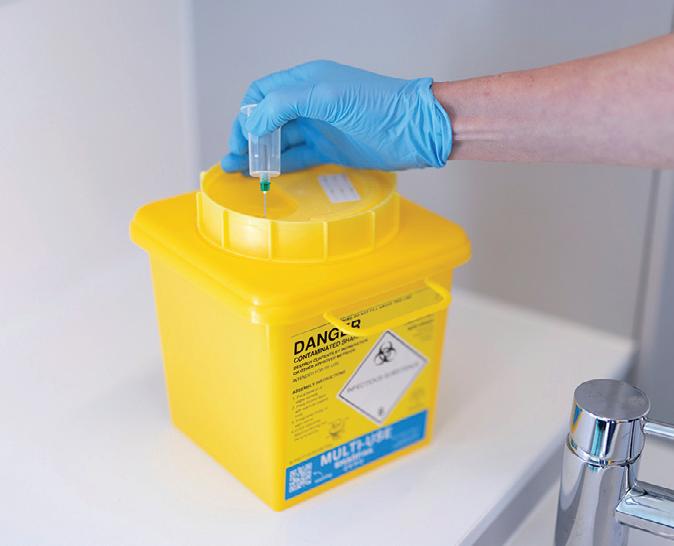
Sanaway, a leading clinical waste, sharps, and washroom hygiene service provider, has introduced new reusable and recyclable sharps containers as part of its auditable ‘Zero Waste to Landfill’ service commitment.
The initiative is part of Sanaway’s ongoing focus to reduce environmental impact for both the company, and its nursing and residential care home customers.
The new reusable recyclable sharps container enables one container to be reused 10 times before being recycled into new reusable sharps containers. The container’s VisiLOCK system optimises safety by eliminating the risk of content spills that may lead to cross-contamination or accidental needlestick injury.
The family-owned business operates across the South of England, servicing customers that demand a reliable, personal and high standard of service at a competitive price.
Co-founder and director, Patrick Martin says: “We are exceptionally proud of our environmental philosophy and commitment, which has been at the core of the company since day one.
“Providing the new reusable sharps service is now standard for all our customers, and at no extra cost. This not only demonstrates our dedication to help minimise the impact our industry has on the environment, but can also help customers achieve up to an 87% carbon saving. This being in line with the NHS’s targets for a 50% reduction in emissions by 2026.”
REDUCE, REUSE AND RECYCLE
Each sharps container has a VisiLOCK closing mechanism to ensure optimum user safety. Once full:
• The containers are collected by Sanaway delivered to the processing facility.
• A robot opens and photographs the contents before:
o Sharps are incinerated.
o Containers are sanitised and recovered.
• The sharps containers are thoroughly checked before being returned for reuse.
• Containers are tracked using barcode scanning to monitor their usage cycles, after 10 uses, the container is granulated and remanufactured into a new sharps container.
• This process is repeated 10 times, meaning the original plastic is reused 100 times.
• After completing 10 full cycles, the plastic is granulated again and repurposed into non-medical products, such as road traffic cones.
Sanaway’s Zero Waste to Landfill philosophy is a market leading standard, based on Energy from Waste (EFW) technology, which means it is a sustainable solution for both waste management and energy production. 99.995% of the process is recyclable and
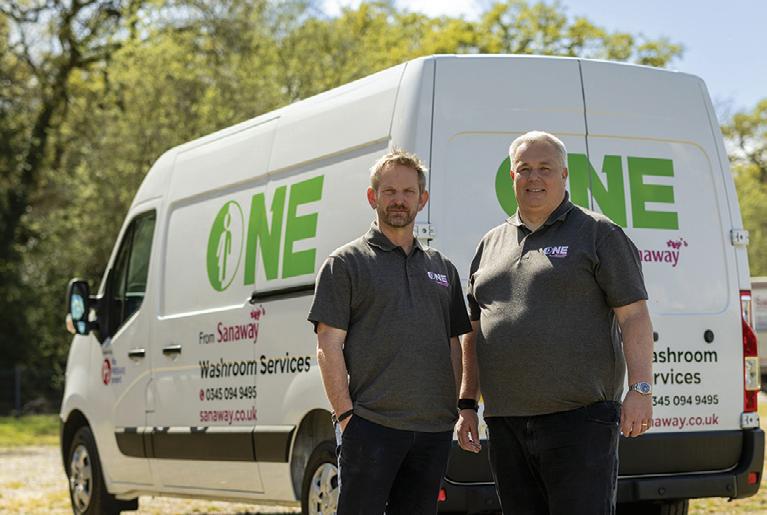
the recyclable elements are removed before the incineration
The company’s auditable Zero Waste to Landfill service diverts
pany collects from its customers every year from landfill, and contributes towards
than 50,000 homes. The company’s ISO 9001 accreditation also
perspective,
cation, enabling them to fulfil their
and
14001

Centrum Group, headquartered in Reading, which includes Centrum Care Homes and Bluebird Care (Berkshire), has been named one of the UK’s fastest-growing founder-led companies, securing a place on the prestigious FEBE Growth 100 list for 2025.
Founded by Tushar Shah and Mehul Shah, Centrum Group has seen significant growth since entering the care sector in 2018. The pair began with two underperforming care homes and, through hands-on leadership, investment in innovation and a deep commitment to quality care, transformed them into thriving, high-performing services.
Today, Centrum Care Homes operates five services across South Devon, supporting more than 150 residents with residential, dementia, respite and rehabilitation care.
Alongside this, their Bluebird Care franchise in Berkshire has become

one of the country’s leading homecare providers, consistently recognised for its excellence and rated Outstanding by the CQC since 2016. Mehul Shah, Co-Founder and Director, said: “We’re absolutely delighted with this recognition. It reflects years of hard work, perseverance and belief in our vision. Tushar and I are immensely grateful to our teams across both Centrum Care Homes and Bluebird Care, who make a real difference every day. As we continue to grow in a challenging environment, our focus remains on driving positive change in the care sector – with people and innovation at the centre of everything we do.”
Charlotte Quince, Founder of FEBE, said: “The Growth 100 isn’t just a leaderboard. It’s a celebration of founders pushing boundaries, taking risks and building brilliant businesses against all odds.”
Say Goodbye to long lines, chasing down prescriptions or scrambling to find you medications in store!
At Automeds Pharmacy, we’re reshaping the way healthcare is delivered. Serving the South of England with over a decade of expertise, we’re proud to be a distance-selling pharmacy that is truly dedicated to the evolving needs of our patients alongside specialising in care home dispensing.

Whether you’re a care home looking for reliable medication management or are in need of hassle-free prescriptions, Automeds Pharmacy is here to streamline your experience. Our team is specially trained to provide bespoke, efficient medication solutions tailored to your needs.
We partner with a range of eMAR providers, offering flexibility and variety—because every patient deserves a solution that fits just right. From same-day deliveries to bulk dispensing for care homes, we ensure you get the medications you need, when you need them.
We understand that repeat prescription ordering can be a hassle. That’s why our experienced team takes the pressure off our care home staff by handling this process for them. No more wasting time hunting down prescriptions—just more time for what matters most: quality care for residents.
With a daily cut-off time Monday to Friday, urgent items are delivered the same day, so no one has to wait.
As Automeds Pharmacy continues to grow, our mission remains steadfast: to offer tailored medication solutions that make a real difference in the lives of our patients.
We’re not just a pharmacy—we’re a partner in your healthcare journey, and we’ll be with you every step of the way.
Enquire today for your bespoke package! 01305 230091 or wecare@automeds.co.uk or visit www.automeds.co.uk

HC-One’s Lauren Court Care Home in Chester, Cheshire, is proud to share the remarkable story of resident Pamela McAlpine on Armed Forces Day (Saturday, June 28), a 101-year-old veteran who served as a radar operator during World War II.
Born on December 28, 1923, Pamela joined the army at just seventeen, without her parents’ knowledge, driven by a sense of duty. As a “radar girl”, she played a vital role in defending the nation.
Stationed initially in Loch Lomond, Scotland, Pamela worked alongside three other women in a radar box, who scanned the skies for enemy aircraft. Her primary role was monitoring mid-distance radar, while her colleagues covered long and short distances.
The fourth team member relayed their findings to the sergeant. Pamela’s service took her from the northeast of Scotland down the entire East Coast on Clacton Beach.

Her efforts, alongside her comrades, were instrumental in countering threats like the German Stukas, which contributed to the Allied victory in 1945. During Pamela’s time in the army, she met her beloved husband Hugh Scott, who famously pretended to fall in front of her to catch her attention –a charming moment that sparked their lifelong love.
Her younger brother, Robert, also served in the army, following in her footsteps. Due to wartime restrictions, only two photographs of Pamela from her service exist, making her memories even more precious.
Georgina Turner, HC-One’s Lauren Court Wellbeing Coordinator, said: “Pamela’s story is truly inspiring, and we’re honoured to have her with us. Her courage and dedication during the war remind us all of the sacrifices made for our freedom. Celebrating her legacy this Armed Forces Day is a privilege for our entire community.”
FOLK music has brought school children and elderly care home residents together in Saltburn – as they aim to create a hit for the town’s upcoming festival.
In a display of creativity and community spirit, residents of Hazelgrove Court Care Home, on Randolph Street, have teamed up with pupils from Badger Hill Academy, on Marston Road.
The groups are working together to craft a unique folk song that will be showcased at the upcoming Saltburn Folk Festival, which takes place from 8th to 10th August.
The Saltburn Folk Community Songwriting Project is presented by creative engagement programme Borderlands and funded by Arts Council England.

It brings together four professional folk musicians, four youth groups, and four groups of older people to create new folk music reflecting on Redcar and Cleveland’s history, present day, and hopes for the future.
Anna Hughes, one of the musicians involved in the project, visited Hazelgrove Court Care Home to engage residents in music activities and gather their ideas for the song.
During a recent workshop, residents learned and sang the chorus, which the children had created in a separate session. The residents then contributed verses that focus on heritage, memories of the past, and hopes for the future.
The project sees participants of all ages working together, with the youngest child being eight years old and the oldest participant, Betty Wood, being 101 years old.
Joyce Wooffindin, 84, who reached grade eight in singing when she was younger, said: “I really feel my music skills helped with this project, and it helped me relive a lot of memories from when I was learning music.”
Ellen Else, 92, a former headmistress of a primary school, added: “It is wonderful to work alongside children on this project.”
Sharon Lewis, activities coordinator at Hazelgrove Court Care Home, said: “I love working with our residents on community projects – it gives them such a great sense of involvement.”
The finished song will be performed by the children of Badger Hill Academy on 9th August, with residents from Hazelgrove Court Care Home attending to watch and join in.
A resident living at a Barnsley home went on a trip down memory lane as she visited the high street she ran a business on.
Jean Foulstone lives at MHA Mapplewell Manor and visited Wellington Street, were she used to run Kard Korner, a greeting cards store.
Jean considers owning her own business one of her “proudest moments” and had not visited the area in many years.
The Seize the Day initiative encourages residents to re-experience activities or events from the past or to do something they would like to do for the first time.
Accompanied by Kathryn Watson, activities coordinator at the home, she made her way down and also saw where her sister’s haberdashery, which is now a hairdressers, was.
The pair also enjoyed a spot of lunch at The Victorian Tea Rooms. Speaking after the visit Kathryn said: “Jean said she really enjoyed

looking around Barnsley and particularly enjoyed people watching.
“When she told me this is what she wanted to do as a part of her Seize the Day experience, she said running her own business was one of her proudest moments
“When we arrived, she was just taking it all in and told me she had not been on Wellington Street or the high street area in general for a very long time..
“She mentioned how much the place had changed, and you could see how proud she was to be back in the area.
“It was nice for her to get out and about and reminisce, and you could see how much she enjoyed it.
“She is still talking about it now, and I feel very privileged to have arranged something like this for her.”
The South West’s Leading Care & Occupational Therapy Event – Are You In?
Here’s 5 Reasons You Need to Be at The Care & Occupational Therapy Show!
On 16th July at Westpoint, Exeter, The Care & Occupational Therapy Show is bringing together the best in the Care and Occupational Therapy industries for a game-changing event. We will be there, here’s why you need to be there too: �� Unmissable keynote sessions from industry leaders like The Homecare Associations, Care Rights UK,

and many more.



�� Networking opportunities with likeminded professionals �� CPD-accredited seminars and workshops to level up your skills.

�� Meet expert exhibitors showcasing innovative solutions. �� It’s 100% FREE!

Don’t miss out on this opportunity to learn, network and discover a The Care & Occupational Therapy Show. Claim your free ticket today using our special link!


Rachel Ticehurst-Richardson from Tunbridge Wells Care Centre (TWCC) and Parkfield House Nursing Home’s Paul Ogu came away with accolades from the recent Stars of Social Care Awards final in London.
Rachel joined TWCC in 2023 as an Activities Assistant and was quickly promoted to head up the department thanks to her passion, creativity and dedication. She organises a variety of twice-daily activities for residents that include arts and crafts, games, physical exercise sessions, takeaway food evening, animal therapy, musical entertainments and much more.
“Rachel deserves to win for her extraordinary dedication, creativity, and genuine love for the residents at Tunbridge Wells Care Centre,” they said. “From transforming dreams into reality – like arranging a Bentley ride for a 104th birthday – to caring for ducklings at home and tailoring meaningful activities, Rachel goes above and beyond every day. Her person-centred approach, leadership, and infectious enthusiasm make a profound impact on residents’ lives. Rachel is not just an activities coordinator – she is the heart of the home.”
A surprised but delighted Rachel says: “I have never won an award before! I was so proud to share the news with all the residents, as they had kept everything crossed for me, and there were tears and cheers from them when they heard. I come to work for them. I give them 110% to see the love they have for me,
which is why I do my job, and why I will continue to do it. I won the award for them!”
Paul received a Highly Commended in the Inspirational Care Worker category. Ex-domiciliary carer Paul joined the West London nursing home in 2021. He’s an experienced and dedicated Senior Care Assistant, and a can-do person who helps wherever needed, even in the garden or doing minor repairs and decorations!
The judges were impressed by Paul’s passion and willingness to go the extra mile. “Paul, a dedicated senior care assistant at Parkfield House, goes above and beyond – from mentoring colleagues and leading on health and safety, to lifting spirits through activities and celebrations. Passionate, skilled, and always smiling, he’s a true role model who brings warmth, quality, and joy to residents and colleagues alike,” they said.

Paul is delighted with his award, saying: “The awards final was full of positive energy and so memorable! Being ‘highly commended’ is a real honour. I’m determined to keep on striving for excellence and giving to society the same level of care that I would expect to give to my own family, or receive myself. I would like to dedicate this recognition to my lovely residents, as well as all the healthcare workers who give their best to those in their care each and every day.”
A resident living at a Scarborough home revisited a school she taught at more than 80 years ago.
Nora Gee (104) lives at MHA Priceholme on respite and tends to stay around four times a year for a month each time.
Nora taught at Northstead Community Primary School, which is less than five minutes away from the home and recognised the area when she came to stay.
In 1940, Nora was a trainee teacher in Leeds and because of the Second World War, the training college was taken over for the military and the students were sent to Scarborough to complete their training.
Nora completed her training and was presented with her teaching certificate at Northstead Community Primary School, and this was her first visit back as she moved away after qualifying.
Nora then spoke to Ruth Gee, the chaplain at the home and expressed a desire to visit the school.
Ruth managed to arrange a visit thanks to current headteacher Shaun Hopper

and accompanied Nora to the school.
Nora spent some time looking at photos and entries from 1938 and talking to the headmaster and some of the children.
MHA Priceholme provides residential care for up to 32 people.
Speaking after the visit Ruth said: “Nora recognised the area when she came to live with us a couple of weeks ago.
“When she told me she wanted to visit, I contacted the school who were very accommodating.
“For someone who is 104, her memory is excellent and recognised some fellow staff members.
“The headteacher showed us some old logbooks/registers and some pictures and names of teachers from 1938.
“She did say the school had changed a lot and is very different now but was very happy she visited.”
In care homes, where hygiene, safety, and reliability are paramount, it’s essential that laundry operations run seamlessly. Forbes Professional’s Complete Care solution is tailored to meet the specific demands of this environment, offering fully supported and cost-effective laundry systems.
With Complete Care, care homes benefit from access to premium commercial laundry appliances without upfront capital expenditure. The all-inclusive rental plan covers installation, routine servicing, maintenance, and repairs; enabling staff to focus on resident care rather than laundry appliance logistics. Unexpected breakdowns can severely disrupt operations, which is why Forbes provides nationwide, award-winning support with a same or next-day engineer response to minimise downtime.
Preventative servicing is central to Forbes’ approach. Their offering includes routine maintenance, full certification, annual gas safety checks, and professional dryer duct cleaning - ensuring systems meet all legal and regulatory standards. Whether supporting existing machines or those rented through Forbes, this

proactive strategy improves operational efficiency and reduces risk.
Under Regulation 35 of the Gas Safety Regulations 1998, annual gas inspections are mandatory. Forbes’ Gas Safe-registered engineers conduct these checks to ensure safe, legally compliant environments. Additionally, regular duct cleaning - often overlooked - is vital not only for performance but also for fire prevention. Forbes’ nationwide service mitigates these risks while optimising dryer efficiency.
Whether you need new rental equipment, service and maintenance for existing appliances, or a full purchase, Forbes offers flexible procurement routes to suit different operational models and budgets. Their expert consultants work closely with care providers to design tailored solutions for each setting.
With decades of experience in the care sector, Forbes Professional is a trusted partner to care homes across the UK; delivering dependable, fully supported laundry solutions that prioritise safety, compliance, and peace of mind.
forbespro.co.uk | info@forbes-professional.co.uk | 0345 070 2335
Interactive music and dance sessions designed to engage those living with dementia prove hugely popular with residents and families.
Paternoster House care home is delighted to announce the outstanding success of its inaugural Dementia Disco, a specially designed music and dance session that brought together residents, families, and community members for a morning of joy, laughter, and shared memories.
The event was created specifically to engage those living with dementia through the therapeutic power of music and movement. Participants enjoyed familiar songs from decades past, gentle dancing, and interactive activities that encouraged social connection and emotional wellbeing with a disco vibe at its heart.
Following the overwhelming positive response, Paternoster House Care

Home has committed to hosting the Dementia Disco monthly on the third Thursday of every month with each session open to the wider local community. The initiative aims to break down barriers and create an inclusive environment where people living with dementia, their families, and community members can come together in a supportive, celebratory atmosphere.
“Music has this incredible ability to unlock memories and emotions, even when other forms of communication become challenging,” said Corina Popescu, Manager at Paternoster House care home. “Watching our residents light up when they hear a familiar song or see them gently swaying to the rhythm – it’s truly magical.
This disco isn’t just entertainment; it’s therapy, connection and pure joy all rolled into one.”
The session featured playlists spanning the 1940s through 1970s, including wartime classics, rock and roll hits, and beloved ballads that resonated with participants, all carefully curated by the homes Activities Team.
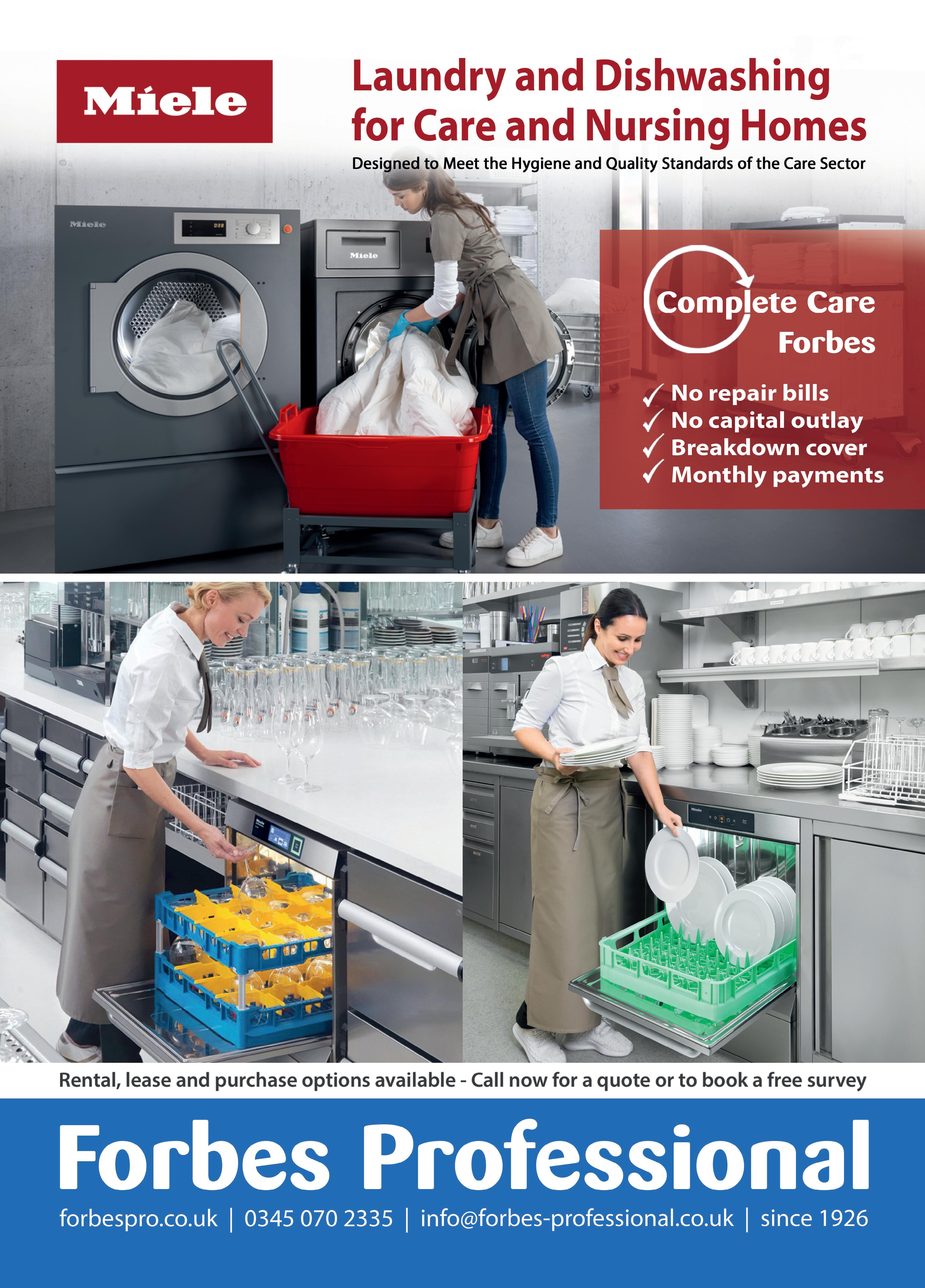
Luxury care home provider Signature Senior Lifestyle has formed new partnerships with The Salvation Army and the British Heart Foundation to strengthen its commitment to community support and sustainability.
Signature Senior Lifestyle is joining forces with The Salvation Army and the British Heart Foundation (BHF) to further enrich the lives of those within and beyond its homes.
Signature will be rolling out specialist training and raising funds for the British Heart Foundation (BHF) in celebration of World Heart Day in September, to support BHF’s commitment to advancing heart and circulatory research.
As part of the campaign, Signature Senior Lifestyle will introduce a Heart Ambassadors programme, inviting colleagues across its homes to become trained ambassadors for heart health. Through specialist sessions, including CPR training using BHF’s RevivR portal and Signature Senior Lifestyle’s inhouse CPR manikins, Ambassadors will be equipped to empower colleagues, residents, and families with resources on maintaining long-term heart health, responding to heart health incidents and emergencies, and supporting fundraising activities.
A dedicated donation page will be launched later this year to track Signature’s collective fundraising efforts, with the goal of raising £1,000. This comes as part of the provider’s wider 2025 fundraising work, having pledged to support BRACE, a dementia research charity, through an impactful fundraising partnership, as well as several local charities.

Last year, Signature raised over £25,000 in total across its ten homes for a number of different charities and causes.
The British Heart Foundation is a charity that holds special significance for many Signature colleagues and residents, some of whom have experienced personal losses to heart disease, one of the leading causes of death in the UK.
Anya Salisbury, Procurement Buyer at Signature Senior Lifestyle, commented: “A lot of thought goes into everything we do here! We are proud to support the British Heart Foundation and look forward to seeing our Heart Ambassadors bring this important initiative to life. It’s another way we continue to go above and beyond to support the health and wellbeing of our Signature Senior Lifestyle family.”
Signature is also collaborating with The Salvation Army by donating new and gently used items from across its homes for resale in the charity’s nationwide network of shops.
Each donation helps to raise vital funds for the charity’s life-changing work, which includes:
• Providing a safe place and bed for over 3,000 individuals every night
• Operating Employment Plus services across 650 locations in the UK and Ireland
• Offering specialist support for survivors and potential victims of modern slavery
• Delivering friendship, practical help, and support to people at every level of need
This initiative supports Signature Senior Lifestyle’s sustainability goals, diverting high-quality items away from disposal and giving them a second life. The donation programme will support The Salvation Army with their ongoing mission and contribute to a more environmentally responsible future.
Christopher Dean, Director of Procurement at Signature Senior Lifestyle, said:
“As a company committed to supporting our communities and making greener choices, we are delighted that our donations will help fund support for those who need it most, while also promoting sustainability. We look forward to seeing the positive difference this partnership will make.”
Both partnerships reflect Signature Senior Lifestyle’s broader ambition to consistently out-do itself in offering the highest standards of care, not just within its homes, but across the Greater London and Southeast communities it works with.
St Quentin Care Homes has announced the beginning of a new chapter, after its acquisition by the Healthcare Management Trust (HMT).
The care home in Newcastle-under-Lyme was acquired by HMT last autumn and has already seen significant improvements in care delivery, infrastructure, and leadership.
The team has introduced MAGIC (Making A Greater Impact in Care), a bespoke care model developed by HMT, designed to create enriching, personalised experiences for every resident.
Jacinta Greatrex has been appointed as the new Home Manager of St Quentin and says the transformation reflects a renewed commitment to enhancing the quality of life for residents and strengthening its role within the local community.
“The last nine months have been about listening, learning and laying strong foundations,” says Jacinta. We are starting to implement a new model of care, which will benefit our residents, their families and our staff. We’re entering a new phase for the home, and we’re excited to share it.”

HMT has also made several refurbishments to the site, introduced a new risk and reporting system, and improved daily operational practices to support the team in maintaining the highest standards of safety and excellence.
Two specialist roles have been introduced: a Clinical Care Expert for Therapies and a Head of Community Nursing, to bring new depth to the home’s multidisciplinary approach.
To celebrate the home’s progress and develop links with the community, St Quentin will hold an Open Day in September.
The event will be open to all, including families, local residents, and healthcare professionals, and they will be able to tour the facility, speak with members of staff and enjoy refreshments and activities.
“We know the care sector is under pressure, and we’re committed to being part of the solution adds Jenny Mace, Director of Business Development at HMT. “By investing in people, systems and environments, we’re working to build a future where quality of life is at the heart of every care decision.”

At Rosa Lifestyle, we believe that daily living aids should do more than just meet functional needs - they should spark joy, preserve dignity and reflect individuals’ personalities. This belief is at the heart of every product we create, and it’s a vision born from a very personal place.
Our founder, Sarah, established Rosa Lifestyle after experiencing first-hand the lack of practical yet dignified and stylish solutions available for her own grandmother, who was living with dementia. She found that too often, the market was saturated with clinical-looking, uninspired products that did little to support wellbeing or enhance the experience of those living with cognitive or physical challenges. Rosa Lifestyle was created to change that.
We design products that support people to continue eating and drinking more independently, but also with more confidence and comfort. Our core range of produces includes lightweight, two-handled mugs, compatible mug lids, and matching snack trays - all made from high-quality melamine to give the look of a china or ceramic mug but importantly, without the weight. Each item is carefully developed to be functional, durable, and attractive - bringing a sense of warmth and homeliness to mealtimes.
WHAT THOUGHTFUL DESIGN CAN DO
The impact of beautifully considered daily living aids extends far beyond aesthetics. As a resident living with early-onset dementia shared in her heartfelt response: “I am a youngster in a care home and was needing to use their plastic two-handled beakers which I hated! Found your beautiful, colourful mugs! They are great and don't remind me of my disabilities and much nicer when visitors join me for afternoon tea!” This testimonial cuts to the very heart of our mission - creating products that people are proud to use, that support their needs without highlighting their limitations and fostering greater social connections and inclusion. Our two-handled mugs, for example, are specifically designed to offer greater stability for individuals with limited grip strength, tremors, reduced vision, or reduced dexterity. The dual handles allow for a balanced, secure grip, reducing the risk of spills and burns. This not only improves safety but can dramatically reduce anxiety around drinking - both for users and their caregivers.
Meanwhile, our mug lids help prevent spills and keep beverages warmer for longer, while our snack trays are perfect for that lunchtime sandwich or afternoon cake and have an integrated cup holder for greater
stability, are lightweight, and easy to clean. Together, these products support better hydration and nutrition - two essential but potentially challenging areas in care environments.
The most powerful endorsements of our work come from those who use our products every day. One care home manager told us: “The mugs are being well utilised and have been a wonderful addition to the home.” While at a dementia day centre in Fife, the team shared how Rosa Lifestyle mugs have transformed daily routines: “We use the mugs every day for our clients who love them! With these mugs being lighter than others, we’ve noticed that not only do our clients drink more fluids (and soup) than they otherwise would - which really helps their overall fluid and nutrition intake - it also promotes their independence and dignity as well.” These kinds of outcomes are why we do what we do.
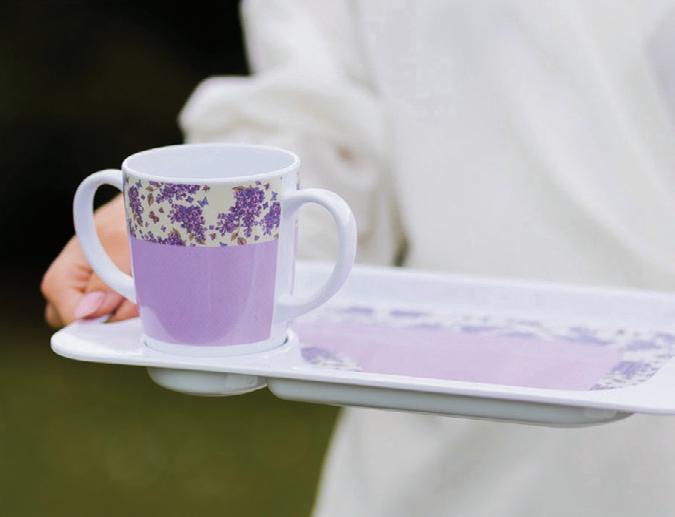
For caregivers, whether professionals or family members, our products are more than tools. They are part of a broader culture of care that values choice, dignity, and self-expression. When a resident or loved one feels more confident and capable using a product that respects their tastes and abilities, the knock-on effects are enormous: greater participation in mealtimes, improved mood, and fewer incidents of frustration or distress.
Our hope is that Rosa Lifestyle products are seen as adaptive homeware rather than clinical aids and become staples in care homes, day centres, and private homes alike - not only because they’re functional, but because they bring a dignified positivity to people’s everyday lives.
In an ever faster moving and busy world, small moments matter. A warm cup of tea enjoyed without fear of spilling. The comfort of a snack on a familiar tray. The joy of choosing a mug that feels personal. These are the moments that build dignity, connection, and overall wellbeing. To learn more about Rosa Lifestyle or explore our product range, please visit

From March 31st, new waste disposal regulations came into effect as part of the Government’s Simpler Recycling initiative.
Designed to reduce waste and increase recycling rates across the country, this has direct and potentially significant implications for the care home and nursing home sector. Anenta, the UK’s leading independent healthcare waste management specialist for the care home sector, explains to issues at hand.
Under the news Simpler Recycling regulations, in addition to segregating clinical waste and offensive waste into separate waste streams, care homes now have a legal duty to separate out all recyclable materials from general waste.

Paper and card, plastic, glass, metal, and food waste all need to be separated and stored in segregated waste collection streams, necessitating larger storage areas, more waste receptacles, and more waste collections.
Although this has implications and associated costs, the new regulations are important because incorrectly disposed waste not only puts a strain on England’s waste capacity – hampering sustainable waste targets – but also significantly adds to the cost of care home waste bills.
FOOD FRUSTRATION
Of all the new waste streams, food waste is likely to be one of the biggest headaches for care homes. That’s because if you produce more than 5kg of food waste per week, you will need to implement a separate food waste disposal system.
Food is a particularly significant form of waste for most care homes as it’s almost impossible to avoid when catering for residents.
In some cases, care homes will have good protocols in place for uneat-
en or waste food, with collections for anaerobic digestion or composting in place. However, for many others this will not be the case, quite simply because it’s always been easier to put waste food into general waste.
And while food waste from canteens or communal eating areas may be relatively easy to collect and recycle, it’s important to remember that a significant amount of other food waste – resulting from items being consumed by both staff and residents in other areas – have the potential to end up in general waste too. Under the new rules that cannot be allowed to happen and that means you now need to make separate food waste bins readily available in public areas.
WHAT IF YOU DON’T COMPLY?
Under the new legislation, if you put food waste into the wrong bins, your supplier will not be permitted to collect them. However, you’ll still be charged, and repeated non-compliance could result in fines or other penalties, which could be as high as £5,000 or more.
To avoid this, you’ll not only need to have sufficient food waste bins in place within your care home, but appropriate training to ensure that all staff are aware of the importance of segregating waste correctly. Here, appropriate signage is also advised to avoid any confusion.
You’ll also need to ensure that food waste collected within your care home – including inedible food parts such as bones, eggshells, fruit and vegetable skins, tea bags and coffee grounds – actually make it into the designated food waste bin for collection.
When you consider that general waste for care homes costs anything between £180 and £250 a tonne, whereas food waste – collected for
Mobile Kitchens Ltd specialises in the hire or sale of temporary catering facilities and foodservice equipment. Ideal for events or to provide temporary catering facilities during your kitchen refurbishment, our versatile units and equipment offer an efficient and economic solution to the caterers’ needs.
Production Kitchens, Preparation Kitchens, Ware-washing Units, Dry Store Units, Cold Rooms and Restaurant Units are available as individual units in their own right or they can be linked together on site to form a complete complex.
Alternatively, we can offer modular, open-plan facilities, usually for larger, longer-term hires.
We offer a free design service, and project management from concept through to delivery and installation on site, plus full technical support throughout the hire period.
The standard specification of our smallest Production Kitchen unit includes a six burner oven range, sala-

anaerobic digestion – costs between £105 to £190 per tonne, it simply doesn’t make sense to continue putting food in your general waste.
Quite apart from avoiding large fines – which could affect your reputation – switching from using the general waste stream for food disposal to anaerobic digestion will save your business anything between 8% and 16%. That’s a saving of £60-£120 per 1,100 litre bin per annum. For care home groups with multiple locations, that’s a saving that soon mounts up.
So, far from being a bad thing financially, the new recycling regulations actually have the potential to bring about long-term cost savings for care homes throughout England. Viewed through that lens switching to segregation makes complete sense.
But it’s not the only benefit. By diverting your food waste from general waste into a separate food waste recycling stream, it can be reprocessed through anaerobic digestion to create organic fertiliser and biogas, helping your business move one step closer to becoming zero-to-landfill and achieving your environmental targets.
This avoids your care home food ending up in landfill where it would release methane, a gas which, according to the UN Environmental Programme, is 80 times more harmful than carbon dioxide
Adopting this process will help to ensure that the correct waste goes into the correct channels, saving your care home money, keeping you compliant, minimising environmental impact, and avoiding inadvertent contamination that could cause issues with your waste collection, leading to extra cost, and stringent action by the authorities.
Far from being feared, the new Simpler Recycling regulations should be embraced, saving your care home money and playing a part in saving the future of the planet.
For guidance and advice on how to meet the Simpler Recycling Workplace Rules, and for information on the best systems to adopt for waste storage and collection, email Anenta at contact@anenta.com or call 033 0122 2143. www.anentawaste.com
mander grill, twin basket fryer, upright fridge, hot cupboard, single bowl sink unit with integral hand wash basin, plus ample power points to plug in Microwaves, Food Processors, Toasters etc. Internal equipment can be interchanged and clients can effectively specify their preferred layout.
We have many tried and tested design layouts and would be pleased to put forward our recommendations for your project.
So if you’re planning a refurbishment or need to cater for an event then why not give us a call and we’ll be happy to provide advice and put forward a competitive proposal.
For further information or to arrange a site visit, email: sales@mk-hire.co.uk or call us on 0345 812 0800, or visit our website: www.mk-hire.co.uk

Following the British Dietetic Association’s (BDA) rollout of the Care Home Digest last year, Bidfood, one of the UK’s leading wholesalers, has produced an industry-leading, four-weekly menu cycle, aligned with the Care Home Digest.
Designed to support care operators in implementing the guidelines, the menu cycle offers unrivalled inspiration for Bidfood’s care customers, featuring over 300 Care Home Digest-aligned recipes available for download.
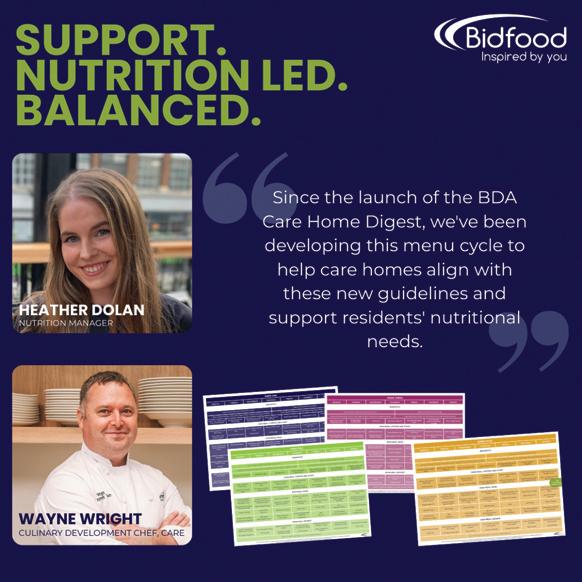
Until last year, healthcare foodservice guidelines were mainly aimed at hospitals, leaving care operators, many of which don’t have access to a dietitian, without tailored resource to support with menu planning.
However, using the new Digest, Bidfood’s expert chef and nutrition team have collaborated to develop this extensive bank of recipes and four-week menu cycle. The cycle demonstrates how operators can align their menus to meet the unique needs and preferences of their individual residents, incorporating food waste tips and a variety of dish types to suit a range of kitchen skill levels.
The menu plan features a balance of food groups including both animal and plant-based proteins, higher-fibre carbohydrates, “healthy” fats and plenty of fruit and vegetables, maximising levels of key nutrients such as protein, fibre and essential vitamins and minerals. The team have also worked hard to reduce sources of saturated fat, free sugars and salt where
possible.
What’s more, every recipe has been nutritionally analysed and adjusted, tweaking both the ingredients used and the quantities, to ensure that nutrition is prioritised whilst also balancing taste, cost and other factors.
Nutrition Manager, Heather Dolan said “At Bidfood we pride ourselves on an evidence-based approach to nutrition, so we were delighted when the BDA’s Care Home Digest was released. We’ve been working on this menu ever since, with the aim of helping care homes to implement the Digest, and ultimately, supporting them in meeting residents’ nutrition and hydration needs.
“It’s been a pleasure collaborating with our healthcare chefs on this project. They’ve brought a wealth of culinary expertise and creative flair to the project. Together, I believe we’ve struck the perfect balance of classic dishes and fresh, innovative concepts.”
To view the four week menu cycle, please visit https://view.bidfood.co.uk/bidfoods-four-weeklymenu-cycle/?page=1
The British Dietetic Association’s Care Home Digest was created to support care homes in developing varied and balanced menus that will tempt residents to eat and drink well, whilst being designed as a toolkit that makes it easy for care operators to dip in and out of chapters as needed. For more information on the Care Home Digest, visit www.bidfood.co.uk/blog/what-you-need-to-knowabout-the-new-bda-care-home-digest/
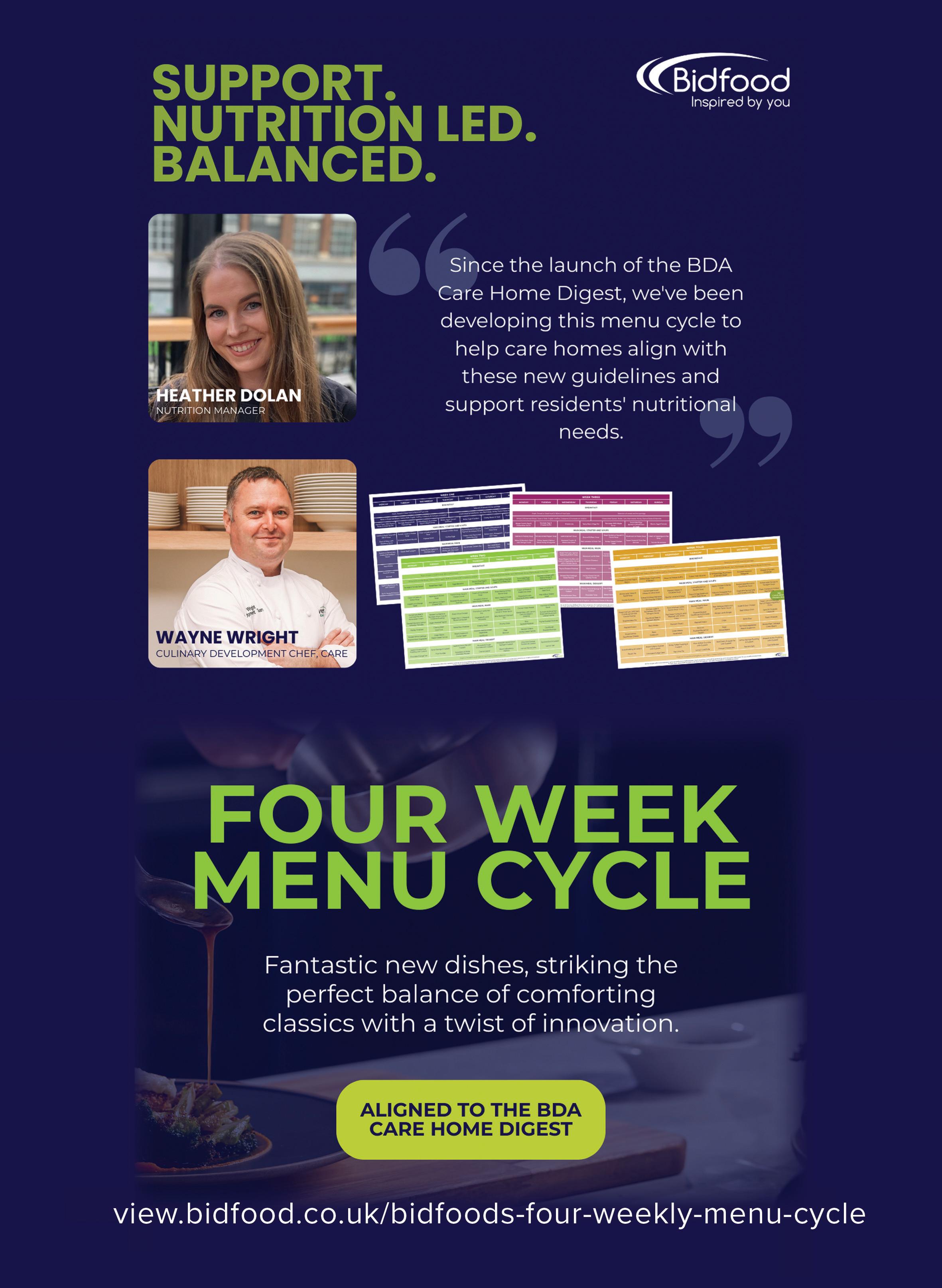
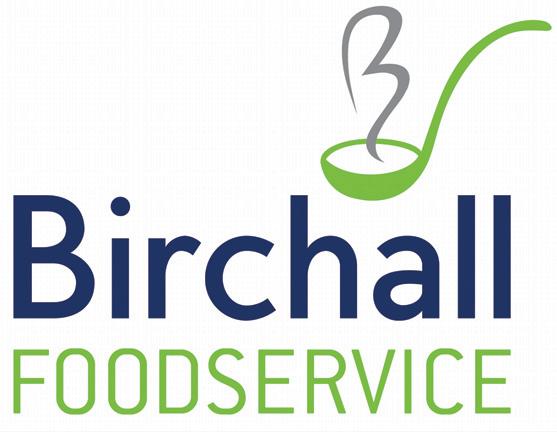
Burnley-based wholesaler and founder Country Range member, Birchall Foodservice, has launched its first-ever Care Home Activity Pack — a 62-page guide designed to support activity coordinators and caterers working within the healthcare sectors.
Recognising the challenges that care home teams face in delivering engaging, enjoyable, and meaningful activities for residents, the pack offers a comprehensive range of creative ideas built around food. Its aim is simple: to spark joy and connection through shared experiences that centre on mealtimes, cultural celebrations, and interactive activities.
At the heart of the pack is a month-by-month events calendar, highlighting key seasonal dates such as Valentine’s Day, Easter, and Remembrance Sunday — each paired with activity suggestions, food ideas, games, and even suggested decorations. These are supported by easy-to-follow recipes and product recommendations.
Popular food-themed games include Biscuit Jenga, Build Your Own Pizza nights, and Food Bingo, which are designed to encourage motor skills, social interaction, and laughter. There's also a "World on a Plate" section, offering immersive cultural experiences for countries including Italy, Mexico, Spain, France, China, and the UK — complete with themed menus, music ideas, and crafts.
To help tackle hydration in fun and engaging ways, the pack features ideas such as mocktail parties, milkshake decorating, and “Guess the Drink” challenges — all designed to improve fluid intake without it feeling like a chore.
Joe Moulton, Marketing Manager at Birchall Foodservice, said: "This pack combines food and fun to help care homes deliver meaningful activities that residents will genuinely enjoy. It’s all about sparking joy through shared experiences, whether that’s a themed afternoon tea or a game of Food Bingo."
The pack has been developed with support from trusted foodservice brands including Albany, Soreen, McVitie’s, Kellogg’s, Lakeland Dairies, and Nestlé. It offers a mix of inspiration and practicality, helping care teams save valuable planning time while delivering enriching experiences. Available now to all Birchall Foodservice customers and care homes across the UK, the pack is free to download.
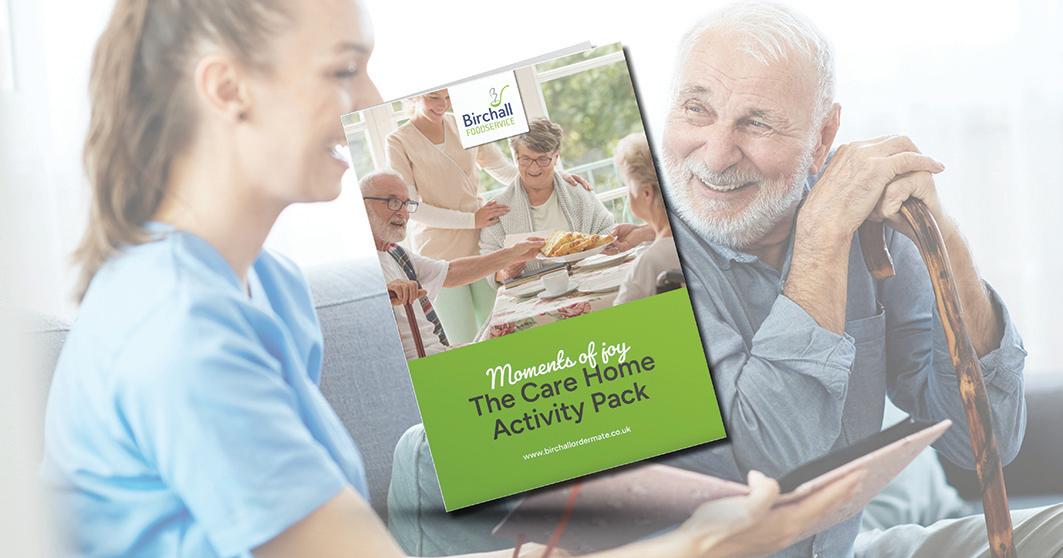
To access the Care Home Activity Pack, visit: www.birchallfoodservice.co.uk/resources or get in touch with the Birchall team by calling 01282 429446.
Jelly Drops (backed by the Alzheimer's Society through their Innovation Accelerator programme) have announced a new 288 pot ‘bulk’ pack for the care sector allowing care homes and in-home agencies to buy in bulk at a reduced rate, ahead of the anticipated warmer summer weather. These award-winning water sweets with added electrolytes boost hydration for people living with dementia and others that struggle to adequately hydrate. By eating two to three pots of Jelly Drops throughout the day, residents with hydration challenges can easily top up their fluid intake in a dignified and independent way.
Dehydration is a common challenge for people living with dementia and aspects like memory problems, potential lack of dexterity and/or avoiding drinks due to fear of incontinence or confusion about where
the toilet is, can all make individuals more susceptible to the dangers of dehydration. Conversely, being well hydrated supports brain function, reduces the risk of urinary tract infections (UTI’s) and unnecessary hospital visits. Even mild dehydration can significantly impact an individual’s wellbeing when they are already dealing with cognitive challenges like dementia.
Jelly Drops have supported over 100,000 families since being developed by Lewis Hornby for his late Grandma Pat who struggled with staying hydrated whilst living with dementia.
If you are interested in learning more about the 288 pot ‘bulk’ case of Jelly Drops to support hydration for your residents or clients,, please contact hello@jellydrops.com or visit www.jellydrops.com

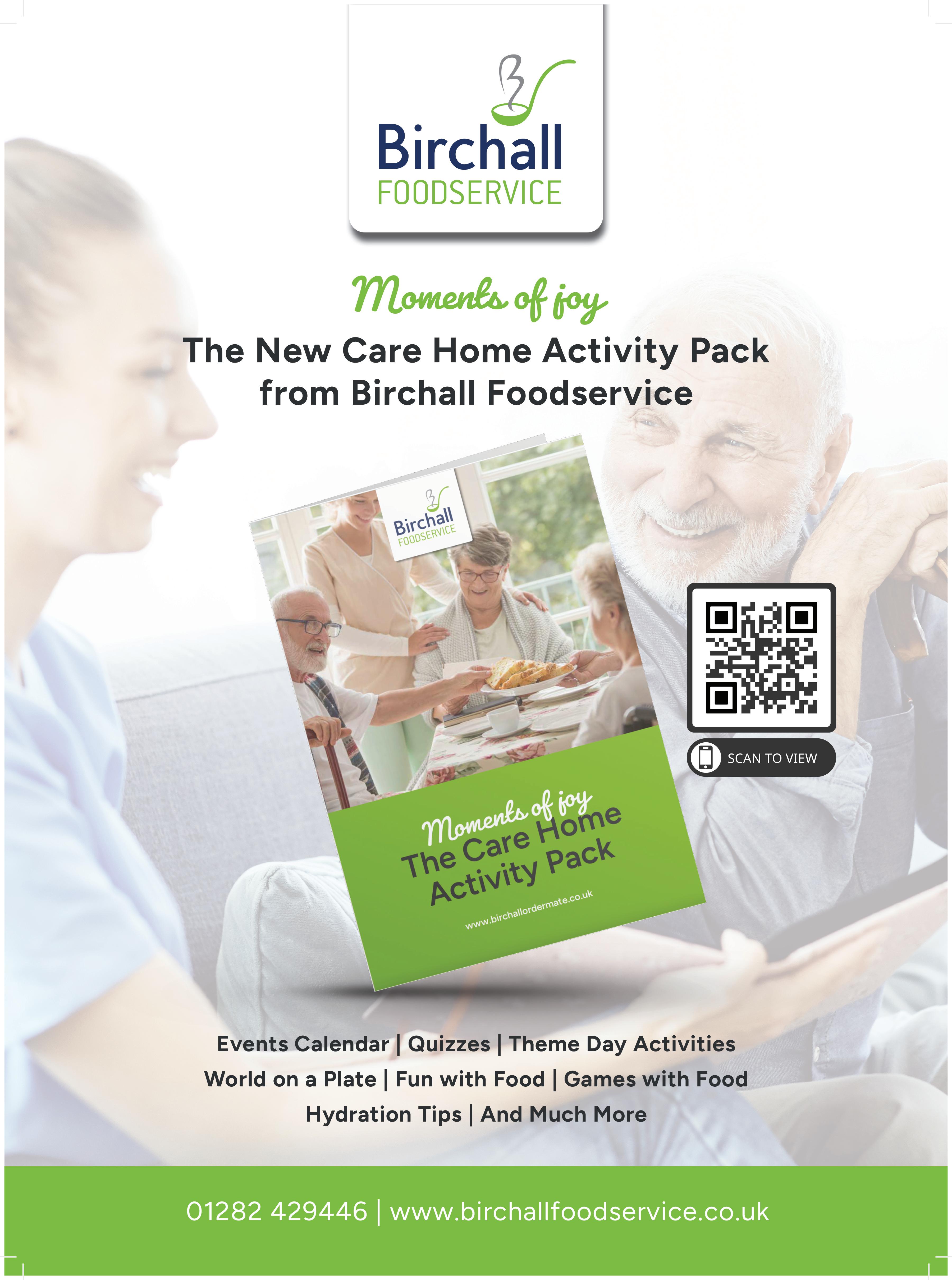
The Treat-Eezi full length pressure relieving mattress overlay (very high risk to stage 4 pressure ulcers) is designed to be laid on top of mattresses. It naturally and gently moves with the patient creating an almost zero chafing area allowing the patient a silent, comfortable sleep along with the assurance any pressure sores present are given the best possible chance to breathe and heal.
Quotations available via checkout.
£241.40p (Exclusive of VAT)
PRODUCT BENEFITS

• Precision Relief: Using advanced 3D pressure sensor mapping, our pressure-relieving mattress overlays provide targeted relief by accurately identifying pressure points, ensuring optimal support for patients.
• Pressure Relief: Our unique 4-layer pressure-relieving mattress overlays offer unique pressure sore prevention, trusted by over 10,000 medical professionals since 2016.
• Sleep Benefits: No noisy pump systems; our static solution guarantees a peaceful sleep environment, free from disruptions or maintenance hassles and allows the patient to sleep with their partner.
• Breathability: Enhanced breathability ensures optimal airflow for keeping patients comfortable and cool.
• Endorsements and Warranty: Backed by endorsements from NHS community services and a full two-year warranty.
• Easy Application: Our pressure-relieving mattress overlays have easy-to-follow instructions.
WHO IS IT FOR
The Treat-Eezi full-length pressure relieving mattress overlay is ideal for individuals who spend prolonged periods in bed or seated, including:
• Elderly individuals with limited mobility
• Patients recovering from surgery or injury
• Those at risk of developing pressure sores
• Caregivers looking to enhance comfort for their loved
ones
Sales/General Inquiries: 0208 133 2851 www.danmedicasouth.co.uk
See the advert on page 11 for more information.
At Novamed, we understand the daily challenges that incontinence brings.
With that in mind, our specialist team, which includes a retired NHS continence nurse, have developed a premium product range designed to give users comfort, protection, and dignity, as well as being manufactured to ISO 13485 quality standards. Our comprehensive incontinence care solutions include: All-in-one (slips) for moderate to heavy use Pull-up pants for light to moderate needs Disposable underpads to protect beds and furniture

• Biodegradable bamboo pads for light protection with an eco-conscious approach Each product provides skin-friendliness, odour
control, and ease of use. With consistent quality and comfort, Novamed are trusted by care professionals across the UK. Our Devon-based warehouse ensures fast, discreet delivery throughout the country. We offer free samples to help you assess the best fit. Novamed products are also trusted internationally, with distribution in Gibraltar, Montenegro, the Middle East, and Europe. For continence care you can depend on, contact Novamed today to learn more or request your free samples 0808 196 2070 www.novamedpads.co.uk info@novamedeurope.com
See the advert on page 4 for details.
CareZips® Classic are patented, easy dressing unisex adaptive pants designed for older and disabled people suffering with problems associated with continence, mobility, mental function and cognition. Suitable for persons living in care institutions, receiving care at home or living independently at home, CareZips® Classic enable people to dress themselves or with assistance from carers.
CareZips® Classic feature patented 3-zipper system, which opens the front of the pants from the waist to the knees for quicker access during toileting, continence pads changes and personal hygiene.

The forward positioning of the two side zippers lessens pressure on sensitive hip areas, helping to eliminate discomfort. The third zipper facilitates simple full frontal opening for faster more dignified diaper changes, catheter adjustments, personal cleansing and hygiene routines.
CareZips® Classic have many benefits for the older and disabled users and their carers:
• People dressing themselves enjoy the practical
Based in Derbyshire, we’re a family-run business with over 30 years of experience committed to helping care homes create safe, welcoming outdoor spaces for residents, staff and visitors.
We offer a wide range of garden furniture, including benches, companion seats, dining sets, picnic tables and planters, all crafted to be strong, durable and splinter-free. Unlike traditional timber, our furniture won’t rot, warp, or require painting, making it a low-maintenance, long-term solution for care environments.
Our products support the circular economy by transforming waste plastic into something both functional and stylish. Each piece is made here in the UK and built to withstand all weathers, year after year. In recognition of our sustainable practices, we’ve been awarded the King’s Award for Enterprise in Sustainable Development. Here’s what Darley Hall Care Home had to say
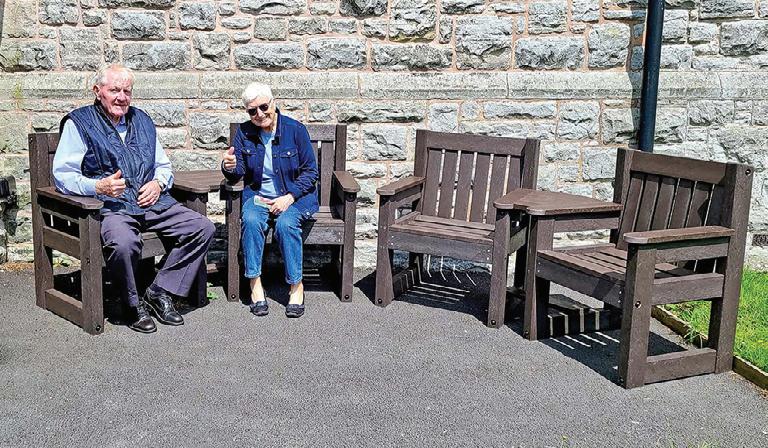
Watch your resident's eyes light up when the trolley arrives! Euroservice trolleys can also be used as a vending trolley or to sell personal care products to residents. How about a delicious snack/pastry trolley or even a drinks trolley for that afternoon tipple? Your lovely trolley could do so much for you and your residents! Visit the website at www.euroservice-uk.com to see the full range.
Or see the advert on page 13.

Angloplas are a UK manufacturer who specialise in producing dispensers for the health and hygiene industry. Although these are designed to keep the workplace tidy and uncluttered they are, more importantly, built knowing the control of healthcare-associated infections (HCAIs) are a priority for healthcare providers, and who are employing a combination of infection prevention and control strategies, including hand hygiene, cleaning, training and the adoption of new technologies, to tackle the problem.
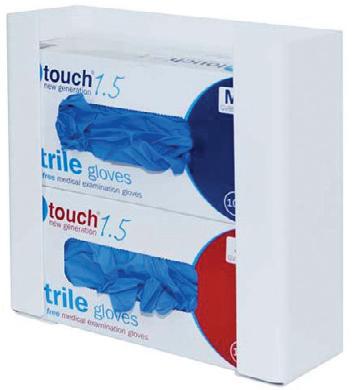
As a result, a wide range of infection control products and technologies are emerging on the market, including antimicrobial technology. Angloplas’ range of dispensers are produced in the world’s first
proven Antimicrobial PVC with silver ion technology and which is exclusive to Angloplas. This helps reduce the risk of cross infection by stopping the growth of bacteria and mould and works continuously for the lifetime of the product, reducing levels of bacteria such as MRSA, E Coli, Legionella, Salmonella and mould by up to 99.99%.
For non-clinical environments Angloplas has recently launched its new Budget Range of products which are made to the same exacting standards as the antimicrobial protected ones but with lower price tags.
You can order Angloplas products directly from its website at www.angloplas.co.uk
See the advert on page 9.
functionality and versatility of the CareZips® Classic, all day comfort and easy garment care.
• People dependent on assisted dressing appreciate quick easy dressing process with less stress, embarrassment and greater dignity offered by CareZips® Classic.
• CareZips® Classic offer practical gains to the carers, helping them to provide better care, whilst reducing physical efforts and saving valuable time.
CareZips® Classic are unisex, available in 6 sizes and 3 practical colours (i.e. black, charcoal and navy). Tapered fit at the ankles gives a tidy appearance. Made from breathable moisture-wicking 4-way stretchy crease-free and easycare durable fabric, CareZips® Classic are comfortable, practical and conveniently functional. For more information, contact Win Health Medical Ltd - 01835 864866www.win-health.com
See the advert on page 3 for further information on Win Health’s product range.
Since our founding in 2010, Activities to Share has been dedicated to enhancing the lives of those in care by providing thoughtfully designed activity products. Our mission is to support activity coordinators in delivering uplifting, engaging experiences that foster connection, joy, and well-being.
We achieve this by listening closely to your feedback and evolving with your needs. Whether over the phone, via email, WhatsApp, or Live Chat on our website, our team is always ready to offer advice and help you find just the right products to bring your ideas to life.

While we embrace the convenience of technology to expand our resources and share knowledge, we remain firm believers in the irreplaceable power of sensory engagement. That’s why we continue to
make our Reminiscence Kits and Sensory Bags with real, tactile items that stimulate the senses. Some experiences— like popping bubbles for the splash, breathing in a familiar scent, or piecing together a puzzle with others—simply can’t be replicated on a screen. These sensory moments are invaluable in encouraging storytelling, sparking memories, and fostering conversation. Our values remain rooted in this commitment to meaningful connection. We’re here to partner with you—the professionals on the front lines of care—to create a sense of structure, well-being, and fun for those who need it most.
for your activity diary

In the evolving landscape of residential and nursing home care, technology now plays an increasingly pivotal role in enhancing said patient safety, staff responsiveness, and overall operational efficiency.
One of the most critical technologies at the heart of this transformation is the nurse call monitoring system. These systems serve as the backbone of communication between residents and care staff, and their importance cannot be overstated in delivering timely and effective care.

UNDERSTANDING NURSE CALL MONITORING SYSTEMS
A nurse call system enables residents to quickly and easily summon assistance. However, modern systems have evolved far beyond simple buzzers. Today, care facilities can choose from wireless, integrated, and modular systems—each designed to meet different operational needs, with modern solutions now connecting with fall detection sensors, electronic patient records (EPR), and mobile caregiver apps. This integration not only streamlines workflows but also helps care homes meet Care Quality Commission (CQC) compliance requirements while delivering faster, more personalised care.
Wireless Systems are ideal for facilities seeking flexibility and ease of installation. Without the need for extensive cabling, these systems can be deployed rapidly and expanded as needed.
Integrated Systems tie into a facility’s broader infrastructure—such as fire alarms, CCTV, and building management systems—allowing for a holistic response to emergencies and enhanced safety protocols.
Modular Systems provide a customisable solution, enabling care homes to scale up or down based on the size of the facility or changing care requirements.
The implementation of an advanced nurse call monitoring system delivers measurable benefits across multiple areas:
• Improved Staff Efficiency: With real-time alerts and data analytics, care teams can streamline workflows and focus attention where it’s most needed, reducing unnecessary checks and overlaps.
• Enhanced Patient Safety: Immediate access to assistance reduces the risk of falls, unattended health episodes, and delayed medication administration.
• Greater Resident Satisfaction: Prompt responses foster a sense of security and dignity among residents, improving their overall experience.
Operational Cost Savings: Efficient use of staff resources and reduced emergency incidents contribute to long-term financial sustainability for care providers.
As regulatory expectations and resident needs continue to rise, nurse call monitoring systems are no longer a luxury but a necessity. They not only support compliance with Care Quality Commission (CQC) standards but also set the tone for a culture of responsive, resident-centred care.
Implementing a nurse call system offers numerous benefits, including improved communication, enhanced safety, increased staff efficiency, better resource allocation, and improved documentation. These advantages contribute to a higher quality of care, improved patient/resident satisfaction, and a more efficient and effective healthcare environment
Investing in the right system requires careful evaluation of a care home’s size, staffing levels, and longterm care strategy. However, the return on investment—in terms of safety, efficiency, and satisfaction—makes it one of the most impactful upgrades a care home can undertake.
In today’s care environment, technology must work in harmony with human compassion.
Nurse call monitoring systems exemplify this synergy, serving as a quiet but powerful ally in the mission to deliver safe, dignified, and effective care.
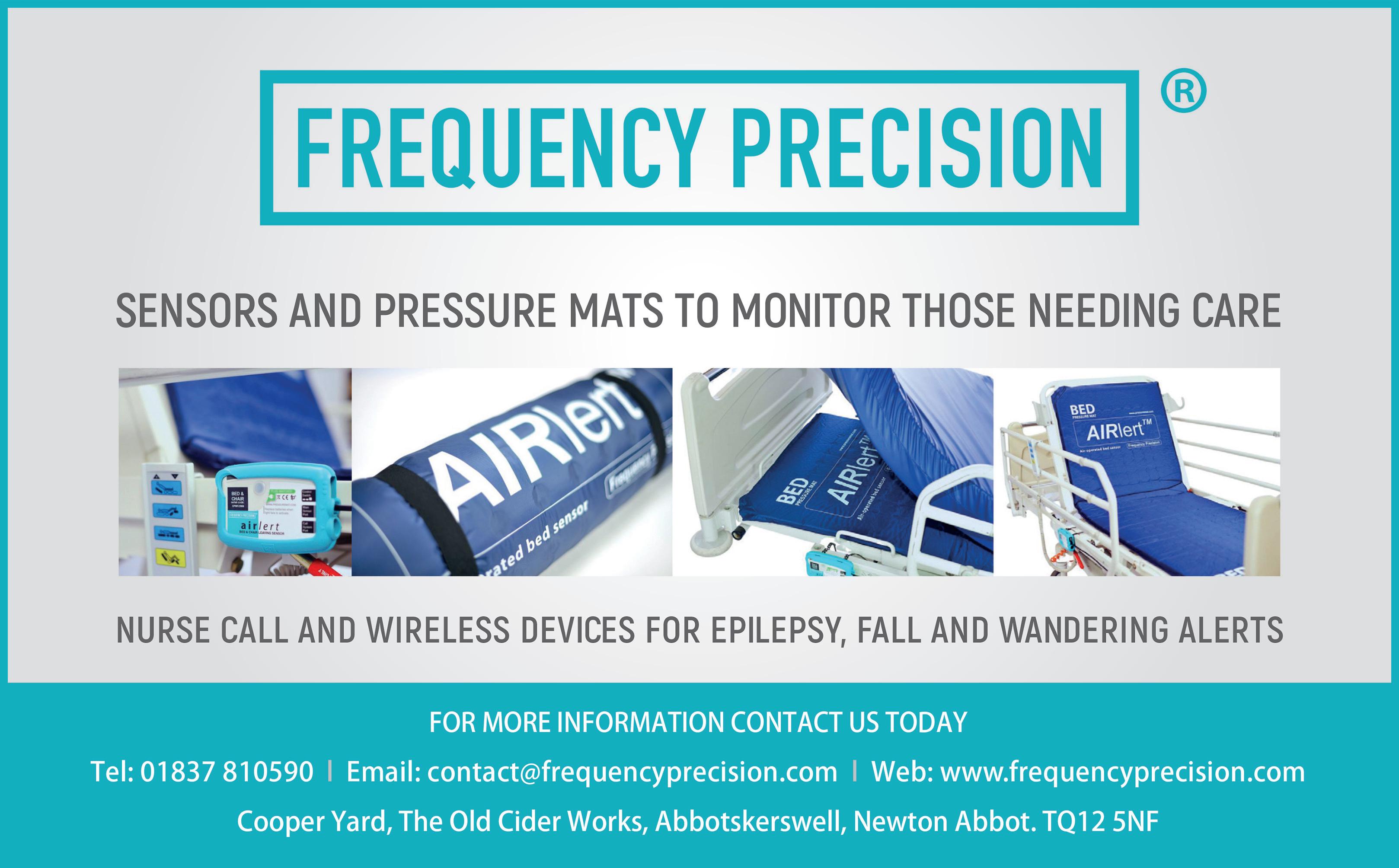
Technology has made people more connected with the world around them and the revolution in assistive care devices has made it possible for the elderly to spend their last years in a comfortable and familiar environment. These devices have also made it easier for home carers to provide quality care for their loved ones while managing their own lives. They allow you to care for your elderly whether they are travelling in the city for errands, staying alone at home, or staying in the same home as you. They are also helping nursing homes provide better care for them with discrete monitoring and quick responses to emergencies.
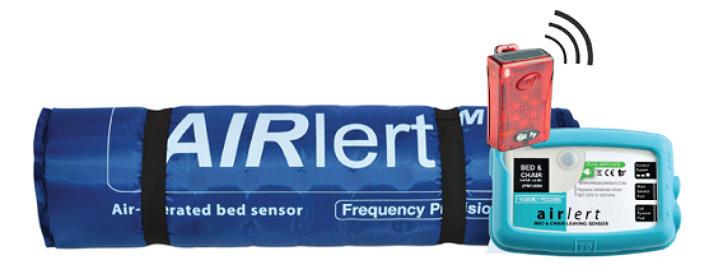
If you’re looking for these kinds of assistive care devices for your loved ones or nursing home, Frequency Precision produce some of the best systems available to help you with elderly care and mobility monitoring, ranging from bed, chair and floor sensor mats through fall monitoring and GPS tracking to fully integrated nurse call plug or wireless systems.
Phone: 01837 810590
Email: contact@frequencyprecision.com
Website: www.frequencyprecision.com
Blaucomm’s Nurse Call Messaging Service (NMS) is the market leading solution to remove the dependency on noisy nurse call panels and pagers, through its intelligent software, which delivers the alerts straight to the care staff who need them.
Care homes are rapidly introducing smartphones for digital care planning and eMar - now, the same devices can be used to receive the nurse call alerts they need for the residents under their care.
Furthermore, Blaucomm NMS is deeply linked into Person Centred Software MCM, so call bell data is linked straight to care plans. This unlocks a huge benefit to care homes to enhance the staff performance with how they accept and respond to residents, which ultimate-
ly promotes better response times and visibility for management to audit their performance.
The best part is that Blaucomm NMS links into your existing nurse call system - we work with all major brands such as Aidcall, ARM, Courtney Thorne, C-TEC, ENS, Intercall, Medicare, SAS and TeleAlarm.
Care operators are constantly recognising Blaucomm NMS for its reliability and dependability to their care operations, which is why we’ve been chosen time and time again over other solutions.
Head of IT Trudi Harrow at WCS Care had this to say about Blaucomm NMS:
“We find Blaucomm is a genuinely fantastic company with a reliable product.
"We would highly recommend this to anybody who wants to replace expensive pagers and silence those annoyingly loud nurse call screens!” To find out more about Blaucomm NMS, visit www.blaucomm.co.uk/healthcare

Fall Savers®, are an experienced market leading healthcare provider of resident safety solutions for over 15 years.
FALL SAVERS ® WIRELESS MONITOR
Eliminate all cables with our new generation falls management solutions!
Upgrade your falls programme with the latest technology from Fall Savers®. The NEW Fall Savers® Wireless eliminates the cord between the monitor and sensor pad. This results in less work for nursing staff, improved safety for patients and reduced wear and tear on sensor pads. Wireless advantages include the ability to use one monitor with two sensor pads simultaneously and support for many new wireless devices. BENEFITS INCLUDE:
Safer for patients; less work for staff

Bed and chair pads available
One monitor works with two sensor pads
Integrates with most nurse call systems
A variety of options, including: Call button
sensor mat Wireless door/window exit alerts TREADNOUGHT ®FLOOR SENSOR PAD
The TreadNought® Floor Sensor Pad is built to last with a durable construction that far out lasts the competition. Our anti-bacterial floor sensor pad is compatible with most nurse call systems or can be used with a portable pager to sound an alert when a person steps on to the sensor pad. Caregivers typically place the sensor
pad at the bedside, in a doorway or other locations to monitor persons at risk for falls or wandering. An optional anti-slip mesh reduces the potential for slippage on hard surface floors.
FEATURES INCLUDE:
Connects directly to most nurse call systems
High Quality anti-bacterial Floor Sensor Pad
Large Size Pad: Measures (L) 91cm x (H) 61cm
Options (sold separately): Anti-slip mesh for hard surface floors

See the advert on this page for further details or visit www.fallsavers.co.uk.
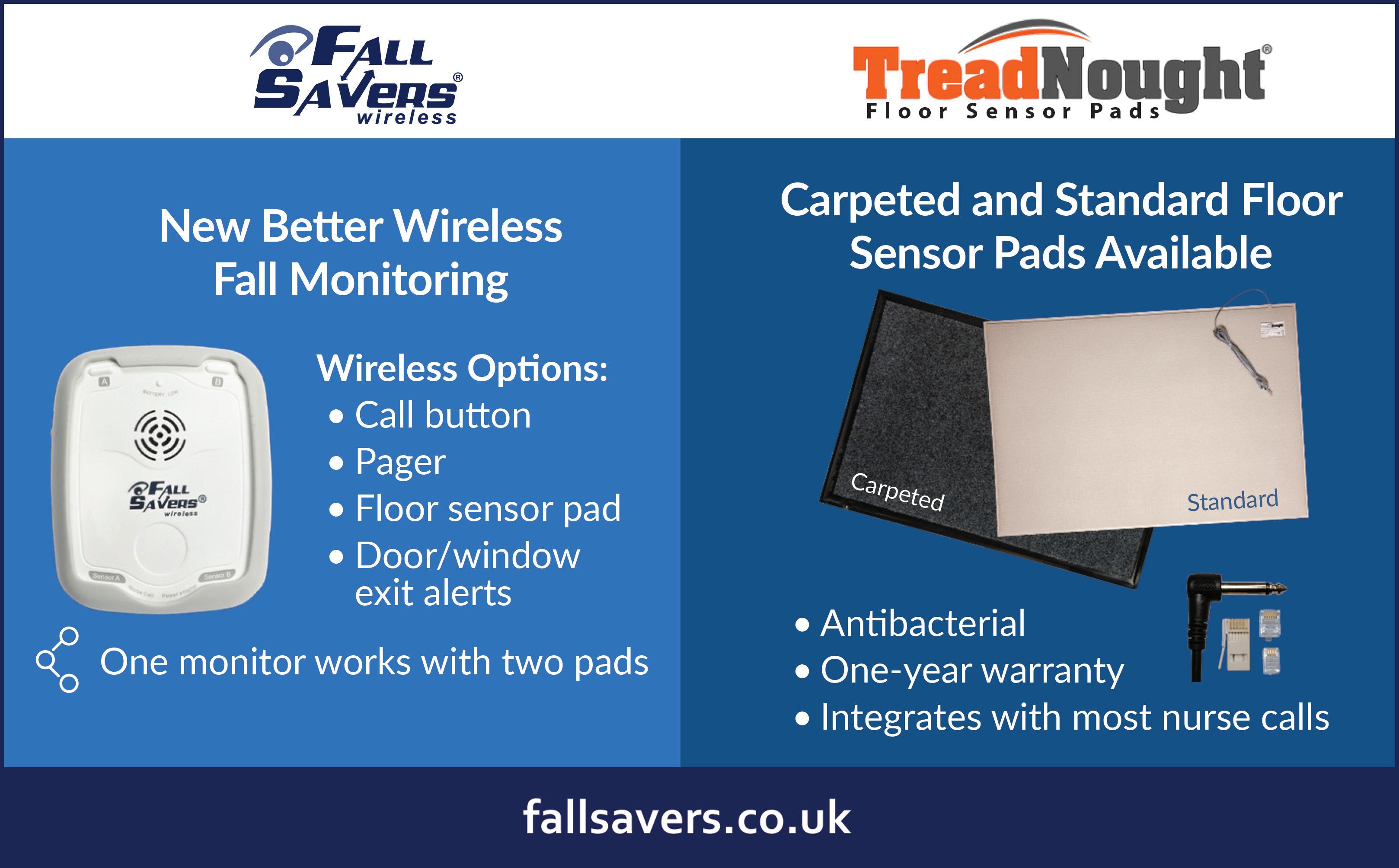
Falls are a significant concern for vulnerable individuals, especially seniors and patients at risk. Medpage, a leader in assistive technology, offers a range of cuttingedge products designed to enhance safety and provide peace of mind for caregivers and families. Here’s an in-depth look at some of their standout solutions:
MPRCG1 (2023) BED LEAVING DETECTION ALARM WITH CAREGIVER RADIO PAGER
The MPRCG1 is a comprehensive system tailored for fall prevention in domestic, commercial, and NHS care settings. This all-inclusive kit includes a bed pressure mat sensor, a BTX21-MP alarm sensor transmitter, and an MP-PAG31 radio pager. The system is designed to alert caregivers when a patient leaves their bed, reducing the risk of falls. Key features include:
Wireless Alerts: Notifications are sent to the caregiver’s pager via tone or vibration.
Customizable Alarm Delays: Options for instant, 15-minute, or 30-minute delays.
Durable Design: Antimicrobial and disinfectant-resistant materials ensure longevity.
• Ease of Use: Minimal installation required, making it user-friendly and portable.
HDKMB2 HOSPITAL DISCHARGE KIT FOR FALLS RISK PATIENTS
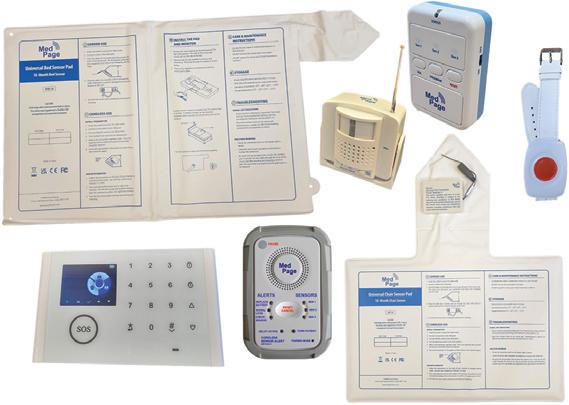
monitoring capabilities of healthcare facilities. Its versatility makes it a valuable addition to any care environment, ensuring timely responses to patient needs.
RON-WC2 WATERPROOF DISABLED PULL CORD ALARM TRANSMITTER WITH WIRELESS ALARM RECEIVER
The RON-WC2 is a robust solution for disabled individuals requiring immediate assistance. This waterproof pull cord alarm is ideal for use in bathrooms and other high-risk areas. Paired with a wireless alarm receiver, it ensures that help is just a pull away.
Features include:
Waterproof Design: Suitable for wet environments.
Wireless Connectivity: Reliable transmission to the alarm receiver.
Ease of Installation: Simple setup for quick deployment.
WHY CHOOSE MEDPAGE?
Medpage’s commitment to innovation and quality is evident in their product range. Each solution is designed with the user’s safety and convenience in mind, making them a trusted choice for caregivers and healthcare providers alike.
The HDKMB2 is a thoughtfully curated kit aimed at supporting patients transitioning from hospital to home care. It includes essential tools to mitigate fall risks and promote recovery. This kit is ideal for caregivers seeking a comprehensive solution to enhance patient safety during the critical post-discharge period.
CMEX-21 MULTI-PORT WIRELESS SENSOR INPUT EXPANDER FOR NURSE CALL CONNECTION
The CMEX-21 is Medpage’s latest innovation, designed to integrate seamlessly with existing nurse call systems. This multi-port expander allows for the connection of multiple wireless sensors, enhancing the
By investing in these advanced fall prevention tools, families and facilities can create safer environments for those at risk. Medpage continues to lead the way in providing practical, reliable solutions that make a real difference.
For more information, visit Medpage’s official website or contact their team to explore these products further. Safety starts with the right tools, and Medpage delivers just that. www.easylinkuk.co.uk
T: 01536 264 869
Courtney Thorne, a long-standing innovator in healthcare communication systems, is setting new standards in the care home sector with its advanced wireless nurse call technology—designed to improve resident safety, enhance staff efficiency, and support a more responsive care environment.
With over 30 years of experience serving the UK healthcare market, Courtney Thorne’s systems are now trusted by thousands of care homes nationwide. Unlike traditional hardwired solutions, their wireless nurse call systems offer non-invasive installation, scalability, and smart analytics—making them ideal for both new builds and retrofit projects.
“At the heart of our technology is the belief that better communication leads to better care,” says Graham Vickrage, Managing Director at Courtney Thorne. “Our wireless systems not only reduce response times but also empower staff

with the tools they need to deliver safe, person-centred care.”
Care providers are increasingly choosing wireless systems for their flexibility, reliability, and cost-effectiveness. With a full suite of accessories—including neck pendants, door monitors, fall detection, and bed sensors—Courtney Thorne systems can be tailored to meet the specific needs of each home and resident.
In an industry where compliance, safety, and staff pressures are always front of mind, Courtney Thorne provides more than just products—they offer ongoing support, training, and a commitment to innovation that helps care homes futureproof their operations.
For more information or to book a free demo, visit www.c-t.co.uk or contact info@c-t.co.uk.
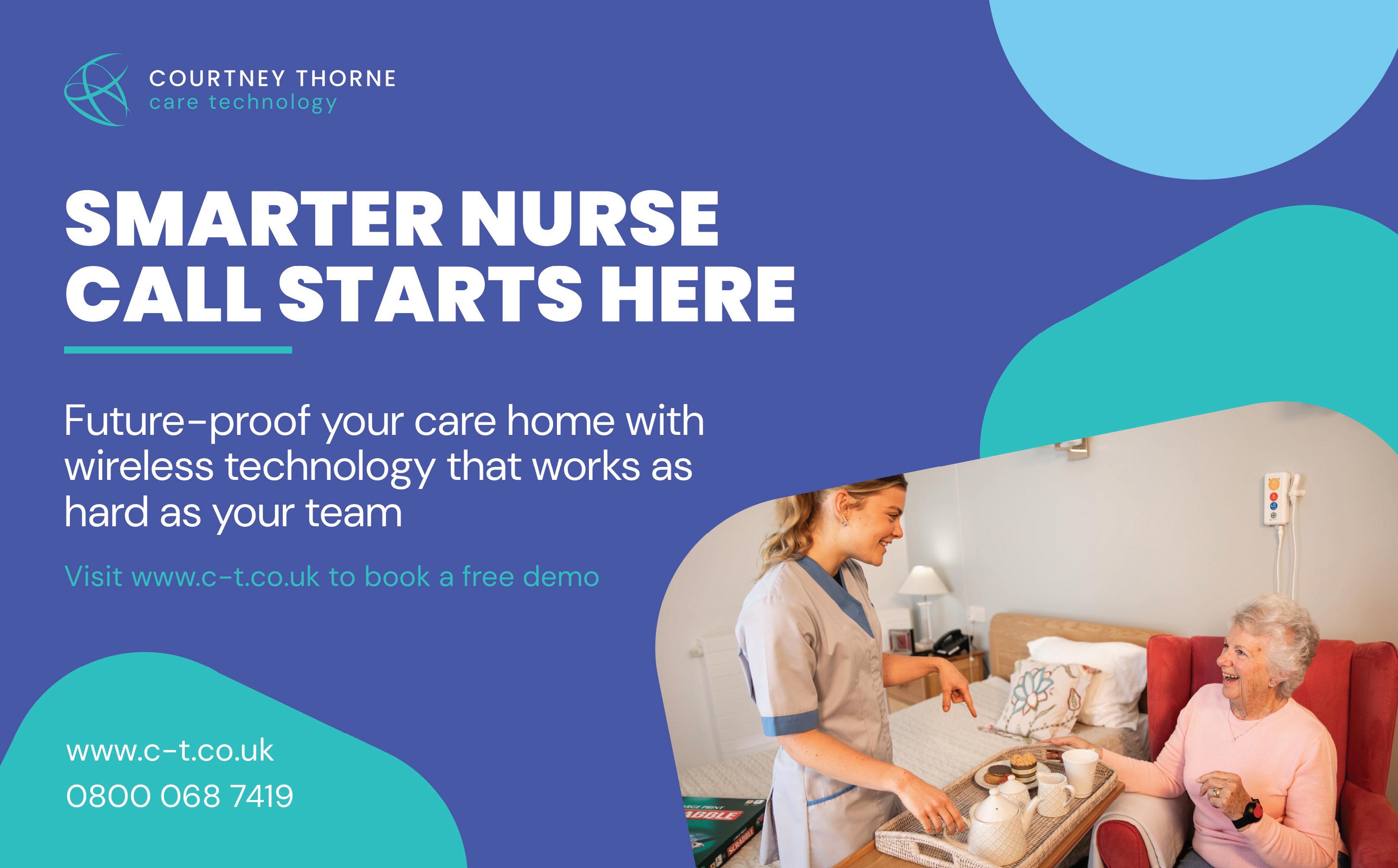
Adult social care is changing fast. Across England, providers are swapping paper and patched-together systems for complete digital records, in step with the government’s Digitising Social Care programme.
Primera Healthcare, which supports people at home in Birmingham and London, has moved early and decisively.
The team started 2025 by upgrading their older care system to Allin-one PASS, adding digital care planning, rostering and finance tools so that every part of the service now sits under a single platform.
The switch felt less like a software update and more like turning on the lights. Travel times, staff skills and visit continuity now feed automatically into the rota, so late or missed calls are spotted and fixed before they become problems.

Medication notes flow straight into electronic MAR charts, and live GPS data shows managers exactly where carers are, cutting the need for frantic phone calls on busy shifts.
Most striking of all is GP Connect. With one tap, authorised staff can see up-to-date diagnoses and prescriptions, saving time and keeping visits focused on the person rather than the paperwork.
“The transition was seamless,” says Shaelene Dewar, Quality Assurance Auditor. “The journal view gives us a live window on the whole business, and the Data Creation Team at PASS built our new forms in record time. GP Connect is brilliant. Reliable information in seconds, and the new charts help us spot patterns we never saw before.”
3. ENHANCED MONITORING
many care settings, the impact it can have is huge.
Here’s a closer look at why AI is set to make waves in social care:
1. BOOSTING EFFICIENCY
AI can help handle those resource-draining tasks in seconds. Whether it’s crunching a mountain of data, summarising care notes, or suggesting next steps, it frees up your team to do what they do best.
It can also improve communication, such as helping new team members quickly access policies or answer routine questions without waiting for assistance. By handling these background tasks, AI allows organisations to redirect resources to other core priorities.
2. ENSURING PERSON-CENTRED CARE
AI can support your teams when providing persona-centred care by analysing data over time, so they can build tailored plans that align with each individual’s goals, preferences, and abilities. It can even predict future needs, flagging issues before they arise so your team can act proactively.
Care organisations often operate round-the-clock, and AI can offer real-time monitoring to support this. For example, AI can highlight subtle behavioural changes, like someone sleeping poorly or becoming more withdrawn. These insights can alert your teams to potential concerns early, which means better, faster decisions can be made to support your clients.
For organisations, this level of tracking ensures care quality stays high, without adding to the workload. It’s like having an extra layer of support that’s always on duty.
4. EMPOWERING TEAMS
AI is here to help empower your care teams, not replace them. AI tools can provide instant recommendations or resources, which could help your newer employees confidently manage unexpected situations. Similarly, AI can assist with summarising care notes or giving quick access to up-to-date best practices, helping your teams provide the high-quality care they work so hard to deliver.
5. OPTIMISING COSTS
One of the big wins of AI is its ability to do more with less. By automating tasks and making resource allocation more efficient, it
Those changes have delivered quick, concrete gains. Oversight is tighter, risk is lower, and staff spend more minutes each day with the people they support.
Everything is logged, time-stamped and ready for inspection, which reassures families and pleases regulators.
As everyLIFE Technologies marks ten years of PASS, Primera’s experience shows what the next decade can look like when digital tools are placed at the heart of care.
Good care can always get better, and better starts with digital.
Ready to explore your own next step? Visit www.everylifetechnologies.com or call the everyLIFE team to see how PASS can help your service.
can help organisations manage tight budgets without compromising on care.
AI can even help reduce staff turnover by easing workload pressures, which means savings on recruitment and training costs too. Plus, because AI solutions are scalable, it can adapt to your organisation's needs.

AI in social care isn’t about replacing people with tech. It’s about giving your teams the time, insights, and tools they need to focus on the people they care for. That’s why OneAdvanced AI, the first UK hosted fully secure, private AI tool for businesses, was created. OneAdvanced AI can help care providers improve efficiency, deliver person-centred care, and empower teams, all while safeguarding your data. This marks a significant step towards a more innovative and sustainable future in social care.
Find out more at: www.oneadvanced.com/ai
See the advert on the back cover of this issue for further info.




People with dementia can enjoy productive and rewarding working lives in the digital era, contrary to the widespread stereotype that dementia is incompatible with the use of modern technology, according to new research from the University of Bath.
The study - Working lives with dementia: A digital futures perspective – argues that the digital revolution risks exacerbating inequalities amongst those with diverse needs but that organisations can and should develop, adapt and deploy digital technology and the working environment to help those with dementia to continue in employment.
“The bottom line is that we have an ageing population and workforce in which dementia will feature and which should, and can be, accommodated by the judicious use of digital technology and adapting working conditions. The reality is, this is not dealt with in any meaningful way right now – there are very rarely strategies in place,” said Dr James Fletcher of the University of Bath School of Management.
“There is widespread prejudice that those with dementia cannot cope with, or benefit from, digital technology, and they often get bundled into the same category as the oldest people. But it’s worth putting some perspective on this – an experienced 60-year-old employee with early stage dementia will have grown up through the digital, internet and social media revolutions – and with the right support, they will still have much to offer,” Dr Fletcher said.
The study was published as the UK government announced its welfare reform plans, part of which is to encourage more disabled people into work. Dr Fletcher said he hoped the research could be a useful example of the prospects and challenges of fulfilling that goal.
Dr Fletcher noted that quite simple adjustments to the working environment, such as improving workstation lighting, using appropriate fonts and colour schemes, and providing workers with calendars, voice activated controls, and automatic reminders could make a big difference for somebody diagnosed with dementia.
“And AI offers really interesting opportunities – it is superb at solving many of the problems faced by those with dementia, such as finding words, organising text and putting words in the right sequence. Couple that with the potential offered by hybrid working for those with dementia, and you can see the benefits for both employees and companies,” he said.
Dr Fletcher and his co-researcher Dr Olivia Brown argue that dementia is not inherently disabling and that its impact depends heavily on the environment and surroundings in which an employee is operating. Employers might consider, for example, that an employee with dementia may be able to access a building with a swipe card but may be foiled if access relies on codes that they have to remember.
“We need to approach this in the way we already respond to people with diverse needs, which is already familiar to most employees. Also, there is a misplaced tendency to see a dementia diagnosis in black and white terms when the reality is, the effects can vary day-to-day and hour-to-hour depending on environment and relationships,” Dr Brown said.
Dr Fletcher said that employees could suffer tremendous stress from a dementia diagnosis and disclosing this to their employer, with some developing strategies to conceal their condition. He said that, while we lack good statistics, it appears that the ‘vast majority’ of those diagnosed with dementia go into unemployment, often unwillingly.
“There are many who could stay in the workforce and don’t. And this is not just an issue for older people –growing numbers of younger people are being diagnosed,” he said.
The researchers noted that dementia is often considered to be a post-retirement phenomenon, but estimates suggest that 9% of the 35.6 million people worldwide with dementia are under 65 years of age, with around 370,000 new cases of young onset dementia annually.
Technology is a key part of the CQC’s improvement agenda; especially when it comes to how care services record performance during inspections.
THE PROBLEM
Many care providers want to move away from pen and paper-based audits and spreadsheets, but most software lacks the capability and flexibility to handle the complexity of the CQC requirements and ratings structure – leading to gaps in oversight and accountability.
THE SOLUTION
Drawing on our experience providing CQC improvement support, we developed an easy-to-use care audit platform designed to help care providers stay on top of their compliance obligations with the user in mind and the CQC framework at its core.

Our Enterprise Care Audit Tool enables care providers to improve oversight and respond to CQC requirements with confidence — delivering greater visibility, accountability, and control.
Now, we’ve made that same expertise and capability more accessible.
Our new cloud-based version is built on the same trusted foundation, giving providers of all sizes a faster, more flexible way to manage compliance with ease.
KEY FEATURES
• CQC-Aligned Dashboard - View audit outcomes and actions against CQC rating thresholds, with drill-down visibility for full organisational oversight.
• 100+ Ready-to-Use Audits - Covering all core operational areas including Care, Health & Safety, Estates, Catering, HR, and more.
• 2,000+ Question Library - Choose from a comprehensive library of questions, each aligned to statutory regulations and the CQC inspection framework.
• Automated Action Management - Audit outcomes that require follow-up are automatically fed into the dashboard and actions portal for clear accountability and tracking.
Reporting - Access a suite of structured reports to support internal reviews and inspection readiness.
• Engagement Surveys - Collect feedback from staff, service users, and relatives
STRESS LESS. TRACK MORE. BE READY.
If you’re spending hours chasing paperwork or stressed about being prepared for any inspection any day
- Care Audit Tool can help.
Website: careaudittool.co.uk
Email: info@careaudittool.co.uk
Phone: 0333 577 0807
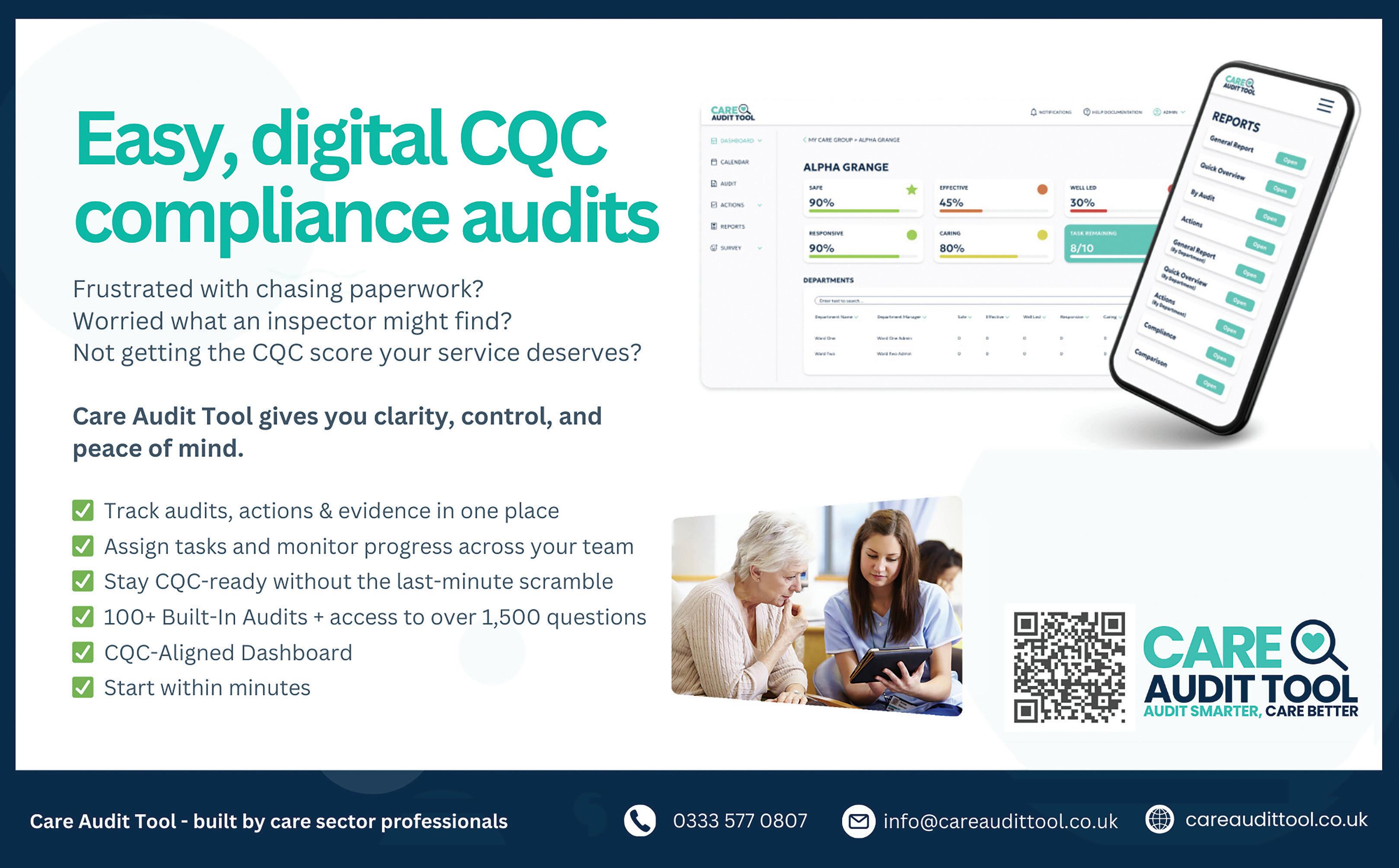
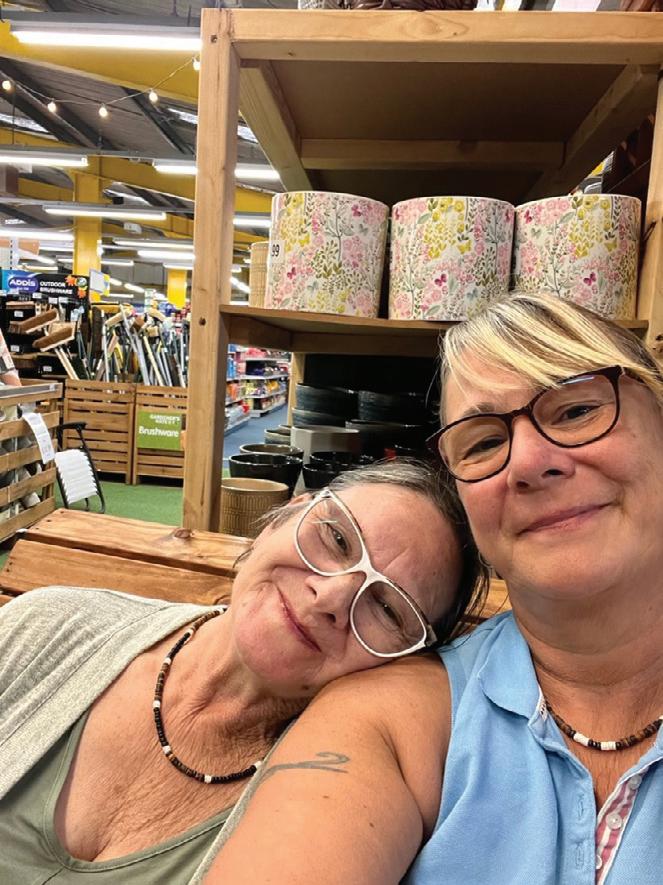
When Sharon’s mum Monica lost her partner and began struggling with her health, Sharon found herself trying to care from a distance—juggling a demanding job in Exeter with near-daily phone calls and constant worry about her mum, who lives alone with her two dogs in Barnstaple, Devon.
“Mum was always independent, but after losing her partner and being told she needed a hip replacement, she became withdrawn and physically frail. I was constantly worried,” said Sharon.
“I’d ring every morning to check she was up, had taken her pills, had something to eat. It was overwhelming.
“She didn’t want a carer. She insisted she didn’t ‘need care.’ But with living over an hour and a half away, I knew I needed to find some kind of support for both of us.”
Sharon learned about new technology being offered by her employer Bluebird Care N.E.W. Devon in partnership with Access Health, Support and Care (HSC), using discreet technology enabled care (TEC) to provide reassurance without intrusion.
The system, Access Assure, uses non-intrusive smart home devices – no cameras, no recordings – just sensors placed around the home to understand daily routines. Movements like opening a cupboard, boiling the kettle, and general mobility patterns are monitored, with alerts sent to family members if anything out of the ordinary occurs or daily living activity patterns change.
For Sharon, the reassurance was instant and the relief had an immediate positive impact on her own wellbeing.
Article supplied by The Access Group
“Suddenly, I wasn’t waking up worried. I knew Mum was up and moving, when the kettle went on, when she’d opened the medicine cupboard. And I knew I’d be alerted if anything changed for Mum.
“It completely changed our dynamic. I could go back to being her daughter again, not just her carer.”
A Bluebird Care N.E.W Devon professional now visits once a week to check the equipment and provide some company.
What started as a technical check-in is now something Sharon’s mum actively enjoys, helping ease the path toward accepting future care, should she need it.
“I didn’t expect technology to bring us closer,” Sharon reflected. “But it has. When I visit now, we go out, we laugh, we just enjoy each other’s company again.”
The smart system behind Sharon’s peace of mind uses AI to learn her mum’s typical routines and flag any irregularities, like missed medication or disrupted sleep, while preserving her Mum’s privacy.
It’s a lifeline that’s helping more families keep loved ones safe at home, without compromising their dignity or sense of autonomy.
“This has been a game changer for us,” Sharon said. “I’d recommend it to anyone.”
William Flint, Director for Bluebird Care N.E.W Devon said: “Using TEC has changed the way we think about care at home. It’s not just about early intervention or risk reduction, it’s about giving families space to reconnect, to be daughters and sons again for example, not just carers.
“It’s a powerful reminder that the right technology, used in the right way, can be deeply human.”
Andy Sparkes, Managing Director for Access TEC, added: “Access Assure is about more than sensors, smart technology, or even an intelligent dashboard that transforms data into meaningful action.
At its core, it’s about reassurance and restoring peace of mind. Families like Sharon’s shouldn’t have to choose between their loved ones living independently and their safety.
“This technology works quietly in the background, empowering individuals to live fulfilling and meaningful lives in the place they choose, while making sure someone’s always on hand if they need that extra layer of support.”
Following stories like Sharon’s, Bluebird Care N.E.W Devon is now preparing to roll out Access Assure across more of its services, bringing the benefits of technology enabled care to families across the region.
PASS by everyLIFE has announced the launch of PASSgenius™, a powerful new suite of data, AI and automation tools built into its award-winning care management software – marking a major step forward in digital innovation for social care.
Designed to turn complex data into clear, actionable insight, PASSgenius™ helps care providers make faster decisions, plan smarter rotas, reduce admin and stay ahead of risk – using the information they already collect.
Commenting on the launch, Robin Batchelor, CEO of PASS by everyLIFE, said: “Care providers are under more pressure than ever. With PASSgenius™, we’re giving them the tools to unlock the power of the data they already hold, helping them make better decisions, deliver safer care and free up time for what really matters.”
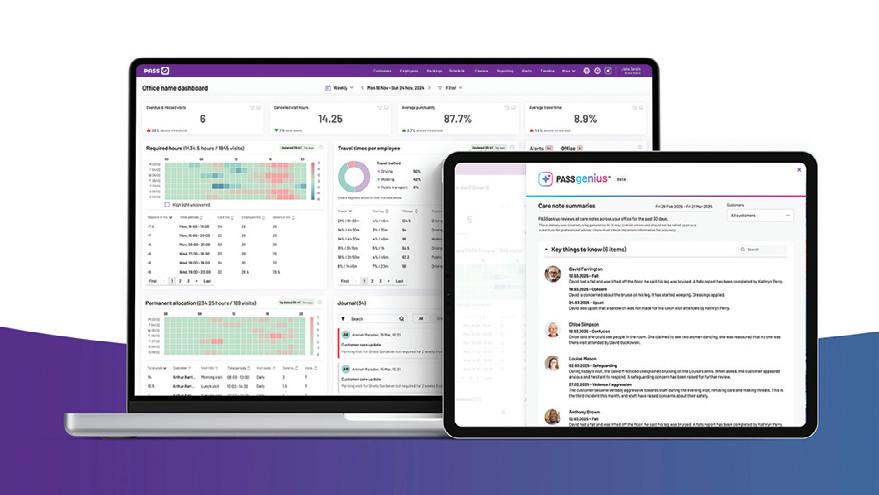
One of the standout features of PASSgenius™ is its AI-powered care note summaries – a tool that can scan weeks of care logs in seconds and highlights key changes in behaviour, health or mobility, helping
teams identify risks earlier and provide more responsive, person-centred support. Instead of reviewing long records manually, users receive concise summaries and recommendations that surface what’s changed and what needs attention, improving both care quality and continuity across shifts. At the heart of the new suite is the PASSgenius™ Dashboard – a fully interactive, customisable dashboard that provides real-time oversight across key performance areas, such as:
• Required hours: Spot gaps in care hours early and plan ahead
• Pending hours: See unassigned visits and fill them faster
• Travel time: Flag long journeys and improve routing
• Punctuality: Track lateness trends and take action sooner
• Cancelled hours: See costly cancellations and reduce repeat offenders
• Missed and overdue visits: Catch missed visits fast and protect care quality
PASSgenius™ is available now at no extra cost to All-in-one PASS users.
To learn more or see PASSgenius™ in action, visit: www.everylifetechnologies.com/passgenius
Under-25s (Generation Z) have much to offer the world of care, especially as it progresses. In a constantly adapting industry, young people are key to helping care companies grow with the times, especially surrounding technology.
However, young people make up only 11% of care workers. Why is this? What is keeping Gen-Z from joining and staying in the world of care?
With the average care worker aged 45 and over a quarter of the workforce potentially choosing retirement in the next 10 years, there aren’t enough young workers to pick up the many mantles left behind. With social care already having the highest number of vacancies in the UK, care providers cannot afford for this number to grow and for their workforces to decrease.
Supporting service users is no 9-5 or Monday to Friday job. This alone can be off-putting to the under-25s, who may juggle education and prioritise a larger social life.
This is what Gen-Z values. They have entered the career world understanding the importance of mental health and their worth in the workplace - and they are often viewed negatively for this. But they couldn’t be more correct.
Just as care services get a bad rep for offering a poor work-life balance, Gen-Z gets a bad rep for prioritising a healthy one. You can see the dilemma. So, how can this be fixed?
Irregular, unsociable hours, poor workload management, and low resources can easily lead to poor staff retention. From the most recent

findings in 2021-2022, care saw a high turnover rate of 53% for those under 20 years old while care workers over 60 had a rate of 24%. It’s common for shift-based workers to feel they have very little control over their working lives, leading them to accommodate the shifts they have no say over. Especially due to last-minute scheduling and changes, many shift workers often must change or completely scrap personal plans - or wait until after shifts are allocated - resulting in lives only revolving around work.
As much as someone can be a work-first individual, removing time
By Becky Mundie, RotaCloud (www.rotacloud.com)
for personal and social lives - and simply downtime - can be damaging in the long run, causing stress and mental health issues. Factor in graveyard shifts or being on-call, and the feeling is greatly exacerbated.
Is there any wonder, when combining this with the high workload and responsibility that comes with care, that the under-25s - the generation valuing mental health - make up so few care workers?
There are simple ways to remedy this, however.
Simply offering flexibility, allowing staff to have a say in the days and hours they work, and offering the ability to oversee shifts further in advance, can make all the difference.
Implementing digital automation allows staff to feel more in control of their work and lives. This alone can greatly improve employee experience.
Surprisingly, employee experience can go hand-in-hand with updated technology - and what goes hand-in-hand with technology? The generation that has grown up with it.
Not only does digital automation benefit your service users, employees, and overall business growth, but it will also make your workplace more attractive to the new generation - who, once joining, can make adopting these new technologies and processes all the smoother. Under-25s are the future, as well as new technologies. It’s time to start investing in both.
For further information on RotaCloud, please see facing page.

By Elena Martin, Director of Operations and Commissioning, Langdale Care
Homes Group (www.langdalecarehomes.co.uk)
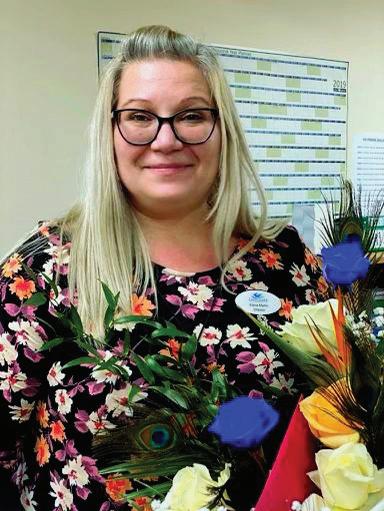
In the ever-evolving landscape of adult social care, it is essential to ensure that training initiatives not only equip care professionals with the necessary knowledge and skills but also nurture an environment where they feel confident and supported to deliver their best.
As a Registered General Nurse with over two decades of experience in the care industry, I have seen first-hand how thoughtfully designed training programmes can bring about meaningful changes that resonate with both staff and residents. These programmes, when aligned with the real-world needs of care professionals, have the power to transform not only the quality of care but also the overall morale and satisfaction within the care setting.
One of the key features of impactful training is its accessibility, relevance, and applicability to the challenges faced by care staff on a daily basis. From comprehensive first aid instruction to specialised courses on dementia care, well-designed training modules can provide care professionals with the tools and techniques required to respond effectively to a variety of situations. By prioritising the development of our staff's clinical proficiency, we enable them to deliver high-quality, person-centred care that focuses on the well-being and dignity of residents.
However, building confidence and capability goes beyond technical skills alone. It is equally vital to focus on the interpersonal skills that underpin meaningful relationships with residents and contribute to their overall happiness and fulfilment. Training programmes that emphasise relational care, for instance, can help care staff appreciate the importance of creating an atmosphere of trust and understanding. By encouraging
staff to focus on these human aspects of care, we cultivate a setting that radiates warmth and kindness, ensuring that residents feel valued and respected.
Moreover, to ensure that staff can consistently provide the best possible care, our training must remain adaptable and responsive to emerging trends and best practices in the sector. By implementing regular refresher courses, we reinforce foundational knowledge, address any skill gaps, and ensure that care professionals are up to date with the latest advancements. Similarly, ongoing supervision and performance evaluations play a vital role in identifying opportunities for professional growth, creating a framework of accountability and continuous development. This commitment to lifelong learning not only enhances the quality of care but also reinforces a sense of purpose and pride among staff.
The ripple effect of robust training programmes extends far beyond individual care professionals. When staff feel confident, valued, and well-equipped, they are better positioned to deliver exceptional care that is tailored to the unique needs and preferences of each resident. This, in turn, results in improved well-being for residents, greater peace of mind for their families, and stronger outcomes for the care community as a whole.
At the core of our training philosophy lies the understanding that empowered staff lead to empowered residents. When care professionals are equipped with the knowledge, skills, and assurance to excel in their roles, they are better able to encourage residents to maintain their independence, involve them in decisionmaking, and take the time to truly listen to their stories and concerns.
In conclusion, aligning training with the practical needs of both staff and residents goes far beyond fulfilling regulatory requirements—it is the foundation for fostering confidence, compassion, and excellence in adult social care. As we look ahead to the challenges and opportunities of the future, let us remain steadfast in our commitment to investing in our staff, enabling them to make a lasting difference in the lives of those they care for.
In today’s care home environment, staff training is under constant pressure. Limited time, tight budgets, and high workloads mean traditional training methods often struggle to keep up. Yet, with complex conditions like diabetes affecting up to one in four residents, there’s never been a greater need for effective, accessible learning.
Game-based learning (GBL) offers a powerful way forward. Whether through board games, card games, or digital tools, GBL turns essential training topics into engaging, memorable learning experiences that fit seamlessly into busy care home routines. It’s proven to boost knowledge retention, spark discussion, and improve practical understanding.

Focus Games (www.focusgames.com) leads the way in this space, with a wide range of evidence-based games developed for health and social care. Their innovative Virtual Care Home is a standout example—a digital environment where staff can explore realistic care scenarios, click on hotspots, and practise deci-
Do you want to provide Gold Standard end of life care in your Care Home?
Sign up to our Training & Accreditation Programme today and receive 50% Off! (Limited-Time Offer)

Offer Includes:
8 live interactive webinars over 6 months, led by a clinical team
Ongoing support and access to the GSF Member’s Area
GSF Accreditation, enhancing your CQC rating and setting your care home apart
Next Steps:
Autumn training begins 10 September – secure your place today by scanning the QR code below. th Use discount code: GSFCarer25 to get the full programme for £1,095 + VAT
Everyone deserves Gold Standard end of life care.


sion-making in a safe, simulated setting. From managing blood glucose to identifying signs of hypoglycaemia, staff gain confidence in handling real-world challenges. All on their pc or smart pnone!
Best of all, these ready-to-use resources are designed to be flexible. Maximising every learning opportunity. With options tailored to your setting, including customisable content and multi-modal learning styles, there's a solution for every home. In a sector facing increasing demands, GBL offers a costeffective, forward-thinking way to build skills and confidence. Whether you're new to game-based learning or ready to take it further, now’s the time to explore the difference it can make. To discuss our virtual care home resource contact info@focusgames.com.
See our cover advert for a special discount code to get started today. Visit www.focusgames.com
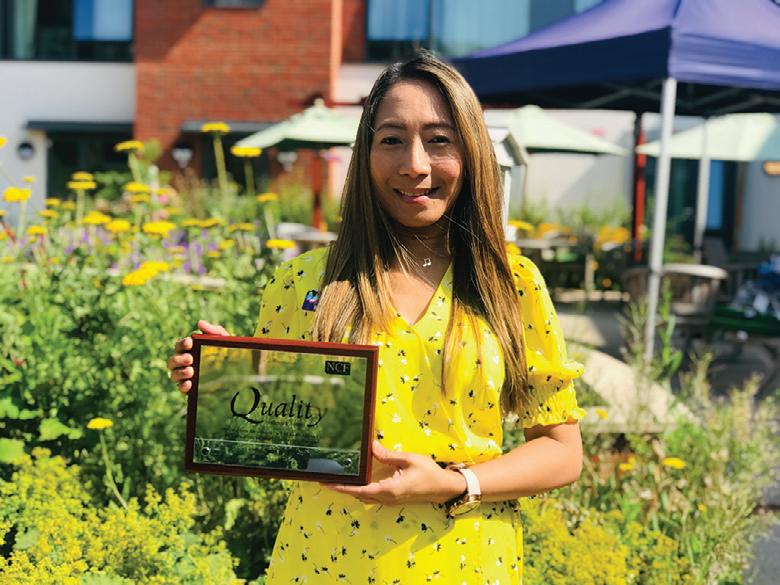
As our population ages, the need for compassionate, high-quality end of life care is more pressing than ever. The Gold Standards Framework (GSF)
Charity is helping to meet this challenge by supporting health and social care teams to deliver care that truly makes a difference.
Through its nationally recognised Service Improvement Programme, GSF equips staff with the skills, confidence, and structure to provide proactive, person-centred end of life care. The results speak for themselves: 97% of organisations report better experiences for residents and families.
GSF Accreditation is more than recognition - it’s a mark of quality that is CQC-recognised, sectorendorsed, and impactful across entire organisations.
Whether you're in a care home, GP practice, hospital, or community service, GSF helps embed a culture of dignity, compassion, and coordinated care. Hundreds of organisations have already joined the GSF community, raising the standard of care for those nearing the end of life.
Find out how your team can get involved at: www.goldstandardsframework.org.uk
Future-proof your care. Empower your workforce. Everyone deserves Gold Standard end of life care.


Cyber security is an increasing concern in social care, with data breaches, phishing scams, and cyber attacks putting sensitive information and essential services at risk. However, learning about cyber security can often feel overwhelming, full of jargon, and difficult to apply to everyday situations. That’s where the Digital Care Hub’s new Cyber Game comes in—an engaging, interactive way for adult social care providers to learn vital cyber security skills.
Learning doesn’t have to be dull. In social care, where training is essential but time is scarce, gamification—using game-like elements such as quizzes, rewards, and interactive challenges—makes learning more engaging and memorable. It provides a safe space to learn and make mistakes, increasing engagement, motivation, and knowledge retention. Gamification also allows for instant feedback and supports long-term behaviour change, making it an effective tool for cyber security training.
The Digital Care Hub has launched the first-ever Cyber Game designed specifically for adult social care providers. It offers a fun and practical way to learn about cyber security and data protection, helping care managers, care workers, and other staff members develop the skills they need to keep their organisation safe.
The Cyber Game takes players through real-world scenarios relevant
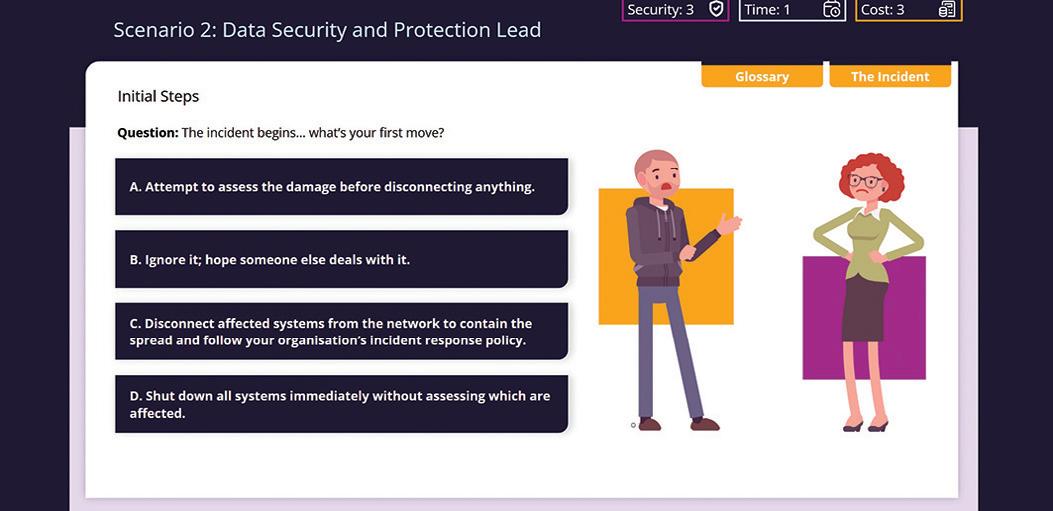
to social care settings, making it easier to recognise and respond to cyber risks in a safe environment. Whether it’s identifying a phishing email, ensuring secure data sharing, or responding to a cyber incident, players gain hands-on experience that translates directly to their work environment.
One of the biggest challenges in cyber security training is making it relatable. The Cyber Game brings cyber risks to life through realistic characters and workplace situations. Players can take on the role of a registered manager, a data protection lead, or a care worker, each facing different cyber threats.
Each scenario is based on real cyber incidents that have affected
The delivery of safe care is the paramount responsibility of social care providers. Central to achieving this is the governance framework adopted by service providers. And at the core of this framework are policies and procedures. These enable the provider to comply – and evidence compliance – with relevant legislation and regulations, as well as facilitating best practices, supporting business needs, and assisting in recognising and managing risks.
Providers have a legal duty of care to the people they employ. Policies and procedures should provide clear guidelines to staff on how the organisation operates, as well as informing them of best practices and processes to be followed.
Policies should be reviewed annually as a minimum to ensure they are still fit for purpose and align with legal and regulatory requirements. They should be reviewed not only by employees of the business, but also by experts in various subject matters (e.g., infection control or medicines management).
For many small- to medium-sized providers, there may not be the in-house skills, knowledge, and experience to complete such a robust annual review. Many choose instead to purchase their policies and
social care providers. The goal is to manage the crisis effectively—containing the damage, notifying the right people, and implementing steps to prevent future incidents. Decisions impact security, time, and cost, requiring players to balance risk and consequences.
WHY GAMIFY CYBER SECURITY TRAINING?
Daniel O’Shaughnessy, from the Digital Care Hub, explains:
“We created the Cyber Game to make cyber security training more accessible and engaging. Gamification encourages active participation and helps staff retain information better, making learning feel rewarding and practical.”
WHAT CARE STAFF SAY
Care staff who tested the game found the scenarios helpful and realistic:
“These are good scenarios – typical and indicative of what may occur and give people an idea of what they need to be thinking about.”
Through interactive decision-making, players experience the consequences of their choices, reinforcing key lessons in a way that traditional training cannot.
TRY THE CYBER GAME TODAY!
The Cyber Game is available online, completely free to play. It’s a great way for care providers to improve their cyber security awareness in an engaging and practical way.
Play the game online at: www.digitalcarehub.co.uk/cyber-game
procedures from a reputable provider like W&P Compliance & Training, who will also complete reviews and ensure their policies and procedures remain up to date. This way a provider not only ensures they remain compliant; they also benefit from best practice policies and procedures that provide a solid foundation for safe working practices and – ultimately – protect and support service users and staff.
Ben Erskine – Director at W&P Compliance & Training www.wandptraining.co.uk | Tel: 01305 767104

See the advert on page

By Satya Cashman, Partnerships Manager for national charity Dementia Carers Count
Here at Dementia Carers Count we’re supporting professional carers, looking after increasing numbers of people with dementia. Day in, day out, we provide emotional advice and practical support to family carers, as they cope with the challenges of dementia care. Those challenges don’t stop when a loved one moves to a care home. They change. And what many families tell us is, they would like better support from the professional carers they meet.
In fact, of the 1,300 family dementia carers who responded to our 2023 survey, only one third agreed that paid carers understood their needs. This is worrying, given the best possible person-centred care is only possible through working in partnership with families
With estimates of the number of professional carers receiving dementia training as low as 29%1, it could be that some carers just don’t have the training or practical experience to support families well. But most care homes invest in regular dementia training, and a host of other professional requirements. Despite this, many families are not confident about paid carers’ understanding of dementia. Only around a quarter (27%) of our 2024 survey respondents said that paid carers had a ‘good understanding of dementia and dementia care2
So, what could you do differently to ensure your busy, committed and hard-working team have everything they need to support residents and families with the care and compassion you’d want?
Well, whilst you’re busy arranging shift patterns, cover, inspections,

visits and the rest, it’s easy to overlook problems with the current basic training model:
1. Dementia has so many presentations, and no one prognosis, affecting every person differently. To provide high-quality, person-centred care for people with dementia, you need a wide range of knowledge from a broad practice base.
2. Staff churn is challenging for any care business. But all too often, staff
move on because they don't feel confident or supported by low-quality training, when they do face those challenging situations.
3. It’s tough getting carers together for a whole or half day of training. Arranging shift patterns and cover, transport from other sites, or managing sickness and emergencies.
At Dementia Carers Count, we understand the pressures you face and the genuine commitment you have to your residents. As a dedicated charity, our mission is to improve support for anyone caring for someone with dementia. That’s why we’ve developed short, regular interventions, delivered live by trainers with experience and insight, to help your staff understand all the dimensions of expert dementia care for your clients and their families.
Our 90-minute format minimises disruption to your schedules, while maximising learning outcomes. These focused sessions share genuinely useful knowledge in an accessible and engaging way. And as all our CPD accredited training comes from years of experience supporting carers, you can feel confident you’re your staff will learn from the very best. What’s more, proceeds from our training go to our work for family carers across the UK. When you work with us, you're supporting your team and your local community.
To speak to Satya and find out more about training – visit www.dementiacarers.org.uk/what-we-do/dementia-training
A host of health and social care courses delivered by leading training provider Realise have received the new Quality Assurance Care Learning Services (QACLS) endorsement.
The Department of Health and Social Care (DHSC) has taken on responsibility for reviewing the quality of individual courses and qualifications delivered by training providers within the sector.
Realise submitted 11 of its health and social care
programmes to be quality assured – and all received the stamp of approval, including the Level 2 Adult Social Care Certificate.
Funding for health and social care qualifications is now provided through the Government’s Learning and Development Support Scheme (LDSS), which has replaced the Workforce Development Fund.
From April this year, only courses and qualifications delivered by training providers that have been
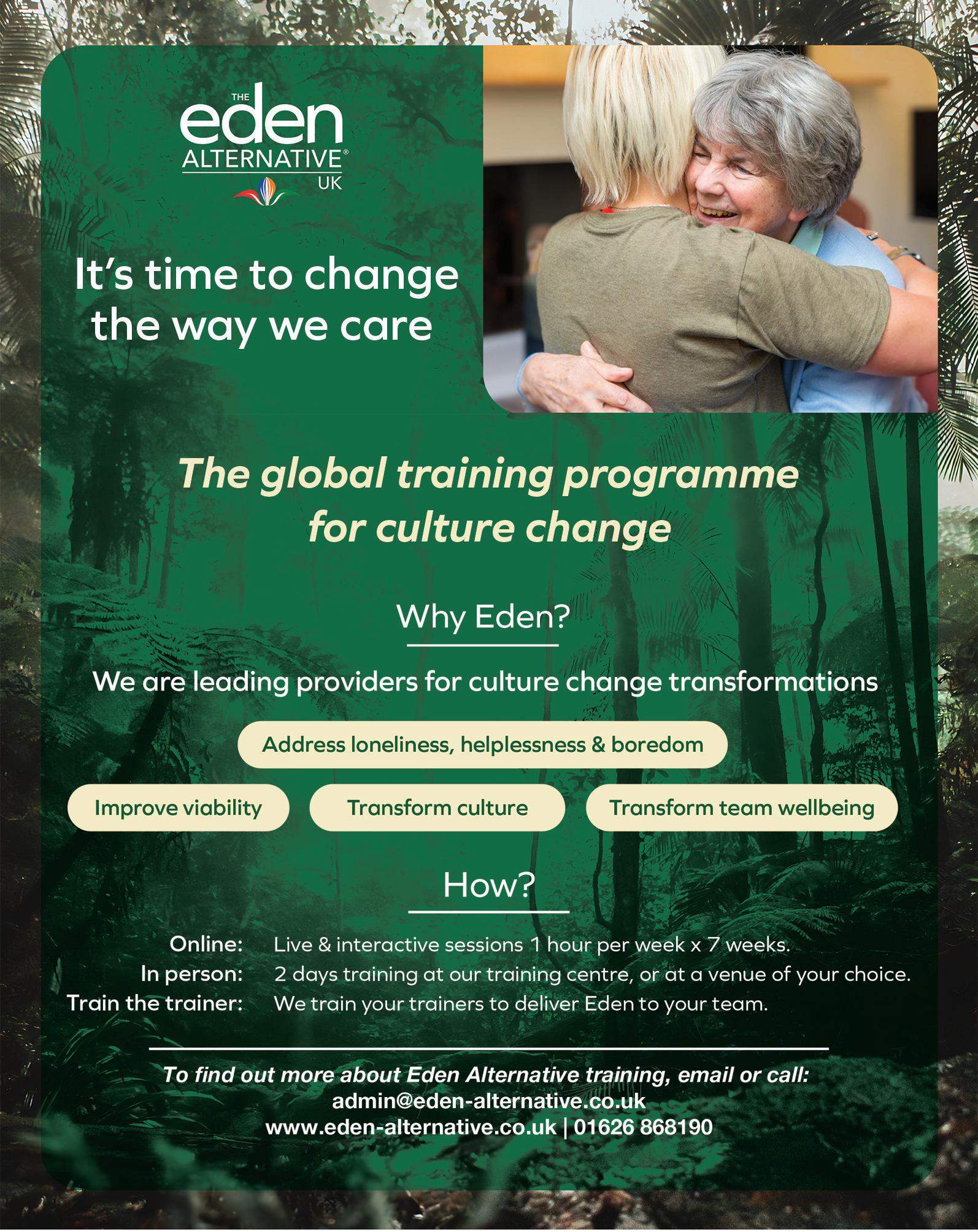
QACLS endorsed will be identified as preferred options by LDSS.
And from next year onwards, employers will only be able to claim LDSS funding for courses that have been quality assured.
Care providers currently have to replace almost a third of their workers each year due to staff leaving their jobs. This high turnover has a negative impact on the quality of care - and the DHSC hopes the QACLS endorsement will help boost retention.
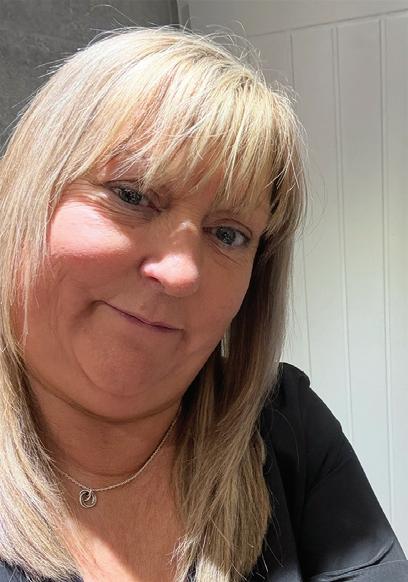
Lesley O’Connor, Head of Strategic Development at Realise, said: “We are absolutely delighted to be one of the first training providers to achieve endorsements across a wide range of courses.
“This new system marks a step-change for the industry as it means, for the first time, individual courses are being reviewed rather than the training provider as a whole in an attempt to drive up standards.
“The approval process was thorough, looking at evidence of quality of delivery, testimonials, achievement rates and policies.
“Being QACLS endorsed is very important as it demonstrates quality and also allows employers to continue to claim LDSS funding. Soon employers will have to pay the full price for programmes that are not endorsed.
“We look forward to working with employers who
"23 years, operating 4 Devon Nursing homes, has been pretty tough, as anyone in social care, knows, only too well. And if it was hard already, after 2024 budget, it's just got harder.
Anyway, at heart, I am just customer of Eden Alternative, and it was a stroke of luck to come across this whilst on holiday in New Zealand in 2009. It started in USA in 1994 and now runs in 22 countries.
The fact that I am now involved with this not-forprofit organisation (in the UK area) came about when one of the 2 main UK directors died suddenly just before Covid. But it's something I have run with for 11 years to help make 'vision' a reality, not a struggle. So, being both a customer and helping the admin seems quite natural.
It is a modern philosophy of care, but moreover, it's
can benefit from quality assured training.”
The QACLS endorsement lasts for three years, with regular monitoring every six to nine months.
Realise will strive to have all its health and social care programmes approved through QACLS during phase two and three of the process. Phase two runs from now until the end of the 2025-26 financial year, and phase three follows immediately after.
The Government says it is "fully committed to a professional, well supported social care workforce" with learning, development and training that is "of outstanding quality, relevant and accessible".
The full list of Realise’s 11 quality assured courses are: Level 2 Certificate in Understanding Autism, Level 3 Certificate in Understanding Autism, Level 2 Adult Social Care Certificate, Level 2 Certificate in Understanding the Care and Management of Diabetes, Level 2 Certificate in Falls Prevention Awareness, Level 2 Certificate in Understanding Nutrition and Health, Level 3 Diploma in Adult Care, Level 4 Diploma in Adult Care, Level 5 Diploma in Leadership and Management for Adult Care, Level 2 Certificate in Understanding the Safe Handling of Medication in Health and Social Care and Level 2 Certificate in Awareness of Mental Health Problems For more information, visit www.realisetraining.com
a programme that is straight forward, tried and tested for 30 years and really works. Its member care organisations generally become trainers for their own teams, and run it themselves. The programme is run in person over 2-3 days or online 1 hr a wk for 7 weeks. You choose. It addresses loneliness, helplessness and boredom and operates through 10 principles to underpin 7 critical domains of wellbeing.
Moreover, it's effective, transformational and really works. As residents, and team members wellbeing, matter so much , it's a must, in my opinion. Geoffrey Cox Southernhealthcare.co.uk eden-alternative.co.uk"



From April 2022, the Health and Care Worker visa route gave UK care providers a desperately needed pipeline to international talent. But with the current Labour Government signalling an end to this route, providers are once again staring into the eye of a workforce storm.
It’s a pivotal moment. The social care sector already faces more than 150,000 vacancies. Labour costs are rising sharply, up to 10% in 2025 alone, driven by increases in the National Living Wage and employer National Insurance contributions. Now, with international recruitment under threat, many operators will see their already narrow options for staffing become even tighter.
Ending the care worker visa route is more than a headline, it has real operational consequences. It’s no secret that providers have leaned heavily on overseas hires to fill roles that remain persistently unattractive to the domestic workforce due to pay, flexibility and public perception.
Cutting off this access will likely drive greater dependence on agency staff, which are not only costly, often commanding 30% premiums, but also disrupt continuity of care and team morale.
Even before this immigration shift, providers were bracing for significant
financial pressure. A typical organisation with a £100m income is already facing £5.5m in additional labour-related costs, including £7m from wage increases and £5m from higher employer NI contributions.
And that’s without factoring in the operational impact of the upcoming Employment Rights Bill. Since April, predictable scheduling, compensation for last-minute changes and stricter zero-hours rules have become mandatory. That means more administrative load, less flexibility and higher staffing costs.
In short, the financial squeeze is very real. And the traditional cost-cutting playbook, reducing staff ratios, asking councils for more funds, or freezing employee benefits, is no longer viable, especially when quality of care and compliance are non-negotiable.
A modern response: smarter operations. So what now?
The good news is that providers aren’t powerless. The most resilient organisations are shifting from reactive crisis management to strategic operational transformation. That means investing in systems that make labour smarter, not just cheaper.
In our latest industry report, we break down how providers are already unlocking significant savings and efficiencies through smarter operations.
Modern shift management platforms, for instance, allow providers to surface open shifts to existing team members quickly, reducing the need to fill gaps with costly agency staff. In one example, agency spend dropped by 38% within four weeks of deploying a new digital scheduling solution.
Additionally, better time tracking tools with geo-fenced clock-ins and payroll integrations have helped providers save up to £4.2m annually by avoiding overpayments and automating manual processes.
Intelligent scheduling systems now also use commissioned hours and
By Abbey Milne, Social Care Lead of Sona (www.getsona.com)
real-time staffing data to avoid both understaffing and costly overstaffing. This has led to 2–5% savings in total labour costs, equivalent to up to £3m for some organisations.
With new compliance demands arriving this year, reducing the administrative burden is critical. Tools that consolidate scheduling, HR and payroll into one workflow can free up hundreds of hours per year, allowing managers to focus on team support and care quality.
This isn’t just about efficiency, it’s about survival. According to a recent Hft and Care England report, a third of providers are now considering exiting the market due to cost pressures and long-term uncertainty. But those who embrace operational transformation stand a chance not just to weather this shift, but to emerge stronger.
At Sona, we help social care providers meet today’s challenges head on, with solutions that drive efficiency, empower teams and elevate care. Advinia, a residential care provider with over 4,000 employees, was spending between £35,000 and £40,000 a week on agency cover. After transforming their internal scheduling strategy, they brought that figure down to £16,000 a week, a change that’s not just financial but operationally transformational.
As leaders, we need to view this moment not just as a policy change but as a call to action. The gap between those who invest in smart systems and those who don’t is widening, and fast. Providers that digitise their operations, empower their teams, and deliver consistently high-quality care will be the ones who thrive in this new era.
While we can’t control the economic landscape, we can control how we adapt. The providers who do so with agility and foresight will help shape the future of social care, not just survive in it.

We are a leading supplier of comprehensive healthcare staffing solutions to care, residential and nursing homes, hospitals, medical facilities and establishments that need person-centred personnel.
By providing staffing solutions that are both cost-effective and highquality, Nexime Healthcare helps with everything that is required. Our extensive database of experienced Support Workers, Carers, Healthcare Assistants and Nurses of various specialities is available to provide highquality care on demand to our clients for:
• One-off shifts, staff absence and shortfalls (often at very short notice),
• Establishing a new unit, whilst permanent staff are recruited,
• Emergency cover during very busy periods,
• Temporary or permanent positions,
• Regular support to full-time teams,
• Contract or SLA (Service Level Agreement) arrangements.
We’re a one-stop, temporary employment business operating nationwide and providing dependable and experienced Nurses, Healthcare Assistants, Carers, Support Workers, domestic and other types of staff.
We are proud of our values, manners, good timing and a friendly ‘can do’ attitude. We’re professional and our clients know that there’s no substitute for our dependability, reliability and our prices.
Owned and managed by people who have years of experience within the healthcare sector, Nexime Healthcare knows what it takes to match the right staff with clients needs. Using our insights into what is required
for each situation, we provide a service with professionals trained for each and every scenario. With access to a broad network of available staff, we can find the right person for the assignment. Nexime Healthcare will make sure you gain access to the reliability, flexibility and experience that you need to support your own clients. We know how critical these are to you.
What we have always done better than anybody else is to provide the highest quality care staff. We apply internal Quality Assurance Systems, that are continually being improved, during our rigorous hiring process. It is essential to us and our clients that our staff are compliant. 0151 673 1899
info@neximehealthcare.co.uk www.neximehealthcare.co.uk
A TEAM of experts have come together to disrupt the expensive and complex social care system by launching an ‘app’ to bring care homes/providers and carers together using AI.
AgoraStaff, a temporary staffing app for the social care sector, is the brainchild of Richard Williams-Pears, a longstanding Cornwall councillor and former mayor of St Austell, who saw firsthand the rising costs and inefficiencies in social care.
He teamed up with his wife Jolene, AgoraStaff’s Director of Outstanding Compliance, who has an extensive background in operating theatres, and Janet Shreeve, who brings hands-on care sector experience from running Shreeve Care Services, based in Wiltshire.
Together, they partnered with tech experts Ben Grave and Simon Wetherell —creators of the UK’s leading asbestos management system - to bring the app to life.
Richard said: “Providing care is expensive and it’s even more expensive if a care home, local authority, or other care provider has to pay an agency to find carers, particularly at the last minute. The carer gets minimum wage, or just above and the agency takes a hefty cut on

average around 30% of the fee from the provider.
“We felt there had to be a better way, using modern technology, to speed up this process leaving more money available for carers and providers. So much money is lost on agencies sitting in the middle between providers and carers, our app is designed to cut through this inefficiency.
“We have therefore combined deep sector knowledge with smart tech.”
Janet Shreeve is the Chief Business Development Officer

for AgoraStaff. She said:
“Many carers throughout the UK are self-employed and rely upon agencies to find them suitable shifts. Our marketplace gives them the opportunity to not only register for free but have complete control over the shifts they apply for and undertake.
“We are committed to ensuring the carers within our marketplace are the best professionals for individual roles. We achieve this with a vetting process to ensure they are legally entitled to work in the UK (if relevant) and must register their relevant training. They will also have the option to undertake more training to enhance their rolesa concept not commonly found within traditional agencies.”
AgoraStaff goes live week commencing May 19th in Somerset and the surrounding counties.
Care providers can sign up for the app for a monthly fee of £34.99 per location (plus five per cent from the agreed daily shift fee) and trained carers sign up FREE once they have completed the vetting process.

Jennifer
Moore, Director at Leonard Curtis Legal

Succession is one of the most pressing and personal decisions a care business owner will make. For many founders, particularly those who have built a service rooted in compassion, community and quality of care, handing over the reins is far more than a financial transaction. It’s also about legacy.
Increasingly, owners in the care sector are choosing to exit through Employee Ownership Trust (EOT); a structure that avoids the disruption that can often accompany third party sales, while simultaneously safeguarding their values, rewarding their team and securing long-term continuity.
At Leonard Curtis Legal, we’ve supported a growing number of businesses through the transition to employee ownership. In our experience, it’s not just a legal process, it’s a cultural shift that is transforming how businesses plan for the future.
An EOT is a government-backed ownership model that allows a business owner to sell a controlling interest (more than 50%) of their company to a trust set up for the benefit of all employees. If certain conditions are met, the sale is then exempt from Capital Gains Tax
(www.leonardcurtis.co.uk) discusses the growing number of care home businesses choosing Employee Ownership Trusts and explores the benefits for founders within the care industry.
(CGT), which is an obvious benefit for those planning retirement or succession.
While the trust doesn’t run the business, it does own it on behalf of the workforce. Decisions continue to be made by a management team, but under a new structure where the staff are the ultimate beneficiaries. In an industry where staff retention, engagement and continuity of care are vital, EOTs offer a compelling alternative to trade sales or private equity investment.
The values behind employee ownership align closely with the realities of social care. Businesses succeed here because of their people –the carers who turn up day after day to deliver life-changing support. Yet many of these same staff face limited recognition or reward. EOTs done well can help to rebalance that.
Businesses adopting the EOT model often benefit from improved staff retention and morale, a stronger sense of shared purpose and an increased perception of trust and credibility both internally and externally.
EOT-owned companies can also pay staff annual tax-free bonuses of up to £3,600, providing a meaningful benefit in a sector struggling to compete on wages alone.
LEGAL AND PRACTICAL CONSIDERATIONS
It’s important to remember that this is a legal transaction and one that must be carefully structured. To qualify for CGT relief, several conditions must be met. The EOT must acquire more than 50% of shares and voting rights, and the company must be a trading business and not an investment vehicle. It must also benefit all employees on equal terms and the former owners must not retain control.

Once established, the trust is governed by a board of trustees usually including independent members and employee representatives. It’s vital that the governance structure reflects both the legal requirements and operational needs of a care provider.
However, in the care industry it’s not only about meeting technical criteria, we must also think about designing governance models that work for regulated services. That means considering CQC implications, continuity of leadership and long-term financial planning.
FUNDING THE TRANSITION
A common concern is whether a care business can afford to buy itself. In most cases, the purchase is funded through future profits of the company with the outgoing owner receiving deferred payments over time. Some providers also access third-party lending to accelerate the process.
Robust cash flow forecasting is key. Margins in the sector are often tight, so careful modelling is essential to ensure the business remains stable while making repayments. We work alongside accountants and lenders to manage this risk.
A FUTURE-PROOF MODEL FOR VALUES-LED CARE
What sets EOTs apart is the ability to exit and secure a fair financial return while keeping the culture and purpose of the business intact. In a sector increasingly shaped by scale and commercial pressure, that’s a powerful proposition.
For owners who have built care services with love and long hours and who want to leave something meaningful behind, employee ownership is more than a tax-efficient exit. It’s a legacy model.
In the care sector, time is one of the most precious—and limited—resources. Whether it’s a nurse supporting an elderly resident or a finance officer reconciling invoices across multiple funding streams, every hour counts. Yet while much attention is given to frontline care, a quieter crisis is unfolding behind the scenes: payment inefficiencies.
Care providers operate in one of the most complex funding landscapes in the UK. Between over 150 local authorities, 42 Integrated Care Boards, and thousands of self-funders, the process of paying and being paid is often fragmented and manual. That complexity doesn’t just create paperwork—it creates risk.
Late supplier payments can disrupt services. Missed payroll deadlines can cause stress for care workers, many of whom live paycheque to paycheque. In a sector where emotional labour is high and financial stability is rare, a delayed or inaccurate payslip can tip the balance from just coping to burning out. When the back office falters, it impacts the front line.
As Victoria Ramsay, founder of Aequalis Accountancy, put it: “There’s a vicious circle. Late invoices mean poor cash flow, which means providers can’t afford to invest in the very systems that would solve the problem.”
And with care workers under unprecedented strain, payroll isn’t just an admin task—it’s a matter of respect. Timely, accurate payments send a clear message: we value you. Delays or errors, on the other
hand, erode morale and trust at a time when retention is already a challenge.
The good news? Change doesn’t always require sweeping reform. One of the biggest wins can come from automating payroll and payments. Faster Payments, for example, allow providers to process transactions in seconds—not days—giving finance teams the flexibility to act quickly and confidently.
Crucially, automation frees up time. According to industry data, automating care payroll can reduce processing time by up to 90%. That’s hours saved every week—time that can be redirected back into care, strategy, and staff support.
What’s often missing from transformation conversations is this: operational efficiency is human efficiency. Every error avoided, every minute saved, helps build a care system that’s not just compliant, but compassionate.
In a sector stretched thin, improving payments isn’t a “nice to have.” It’s a foundation for dignity, stability, and sustainable care.
To learn more about how care providers are modernising payments, visit Modulr at www.modulrfinance.com/care-payments



Aston Brooke Solicitors provides sponsors with an invaluable insight in the Home Office interview and inspection process and how to remain compliant.
Request a UKVI mock audit to see if you are compliant
Email Visit our website km@astonbrooke.co.uk www.astonbrooke.co.uk


